Putting together our annual list of the best places to travel is a process that takes several months—we survey writers based around the world, talk to our A-List travel specialists, and look at the most exciting hotel and restaurant openings. While news and global events have a large impact on the places we choose, we also pay attention to cities that are worth revisiting: Philadelphia, in particular, may surprise you with the amount of growth and development it has seen in recent months. North America made a strong showing on this year’s list—more than a quarter of these places are within reach for a long-weekend trip from the United States.
We know that people will travel far and wide for incredible food and drink, which is why that was a key factor in our decision-making. In 2017, you’ll want to head to Jerusalem for its exciting Levantine food, Oslo for its coffee culture, Belgrade for craft beer, and Valle de Guadalupe for coveted Mexican wines.
While beach vacations are timeless—you truly don’t need much more than a comfortable resort, warm waters, and a good book to read—tack on a bit more time if you’re visiting these places: Tofino, in British Columbia, has a wild food scene; Honolulu will host its first arts biennial this year; and Málaga has amazing hidden museums.
Technology and globalization can make the world feel small and thoroughly explored. But there are always places to discover—and rediscover—for yourself. Take a look at last year’s list for additional inspiration, and share your own picks with us on social media using #TLBestPlaces.
Angra dos Reis, Brazil
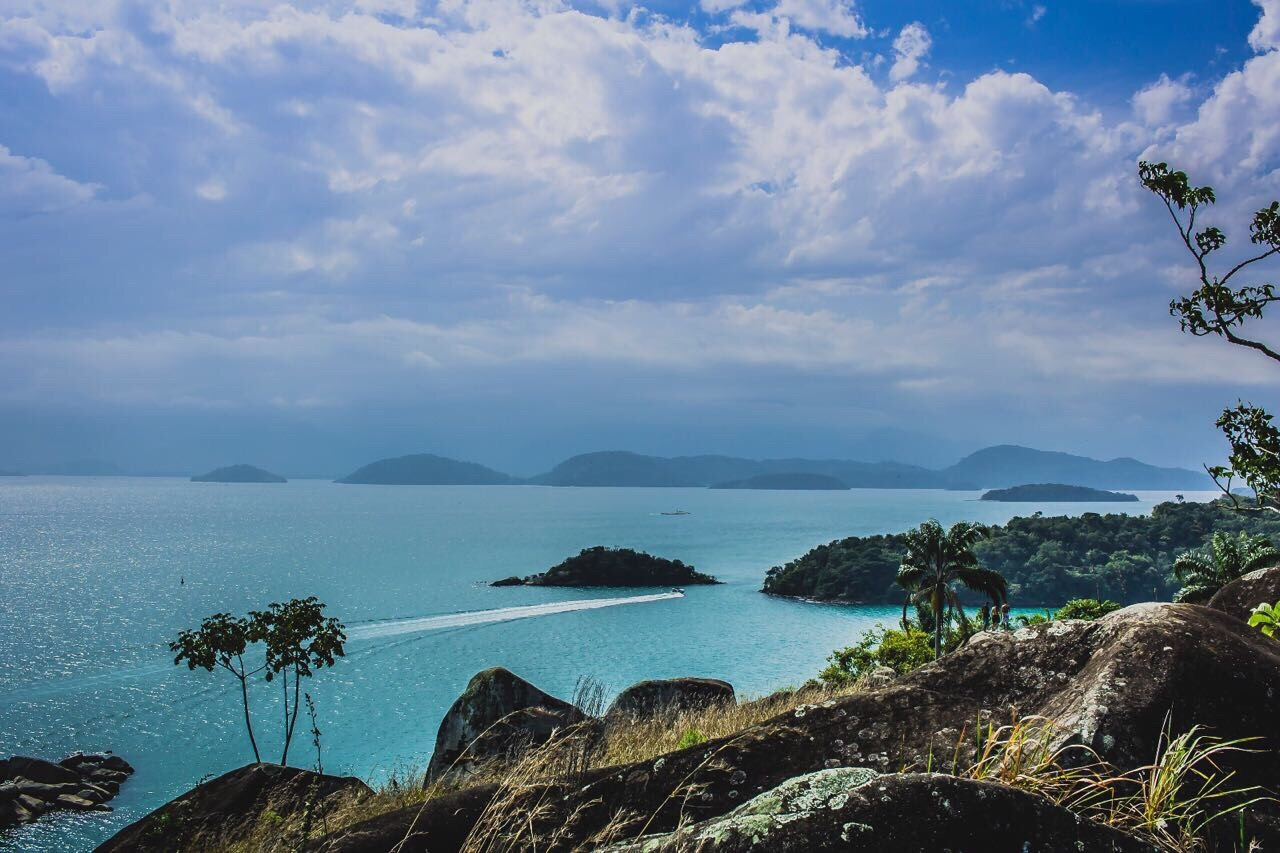
Brazil’s visa waiver during the Olympics was a success for one big reason: it encouraged travel beyond the big cities. The tourism board hopes to bring back the waiver, and if you’re planning to take advantage, save time to visit Angra dos Reis, between Rio and São Paulo. This popular Brazilian vacation area is where cariocas go to escape the crowds. “It’s where many of the country’s elite have their beach villas,” says Martin Frankenberg of Matuete, who has access to several of these glamorous rentals. Big changes are coming to the region. In May, Brazilian chain Fasano will open a long-awaited 54-suite hotel in a complex that includes a marina, golf course, restaurants, and a spa. The design is striking, with elevated wooden buildings that look like they’re floating, all with open-air terraces and views of the forest and sea. And the government recently pledged $8 million to improve the infrastructure on Ilha Grande—an island that’s so popular that they’ve had to impose a daily limit on visitors. —Stephanie Wu
Belfast, Northern Ireland
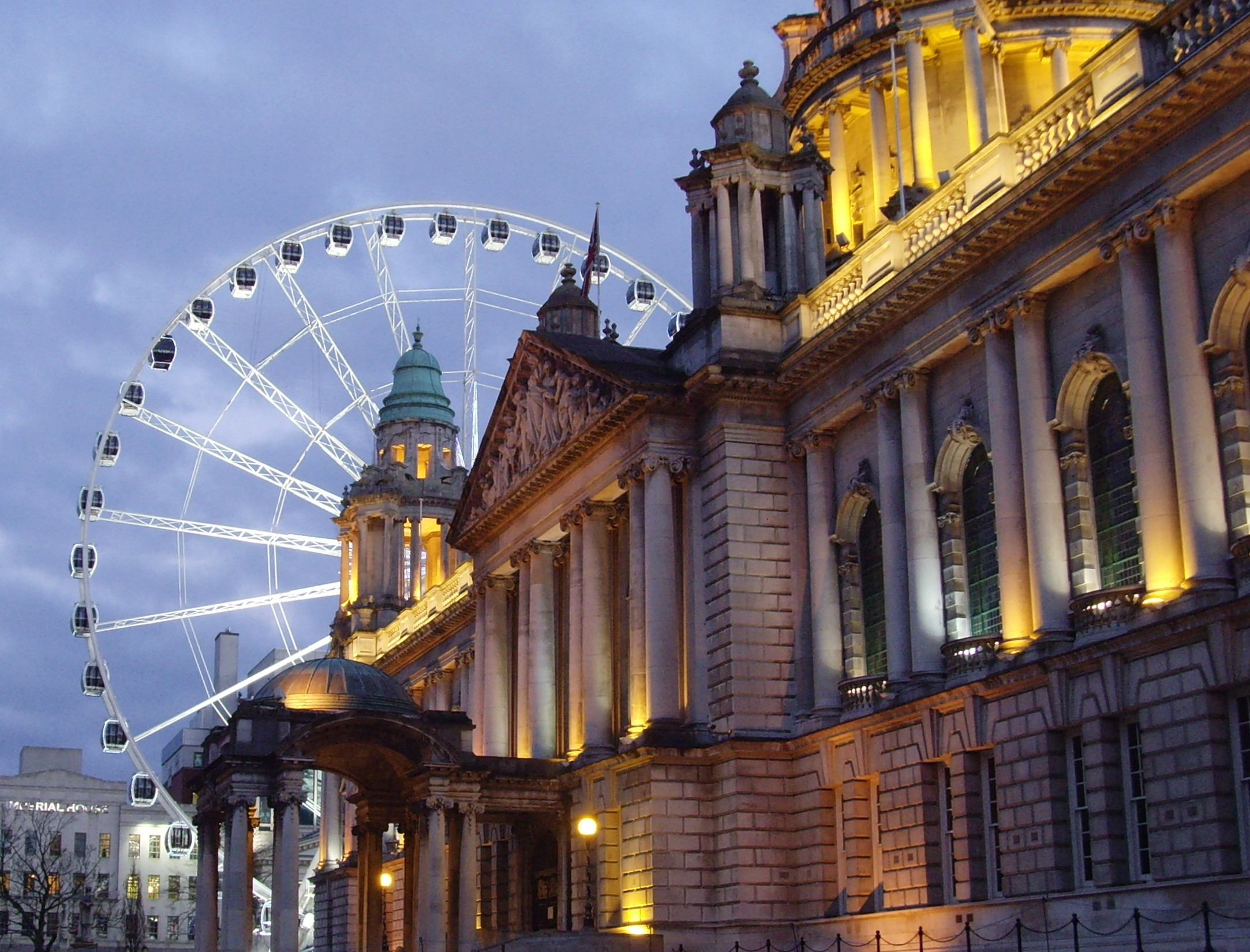
With a growing array of open-air bars, arts venues, and restaurants, Belfast is quickly becoming an attractive destination for travelers. Stay at the design-forward Bullitt Hotel (inspired by the Steve McQueen film), which opened in October with casual, well-appointed rooms and complimentary grab-and-go breakfast granola. Check out arts organization Seedhead, which runs street-art tours and hosts pop-up cabarets around the city. The Michelin-starred OX and EIPIC lead the fine-dining pack, but also visit Permit Room, with its internationally inspired breakfast and locally roasted coffee. Noteworthy new nightlife spots include the Muddlers Club, a stylish restaurant and cocktail bar in the trendy Cathedral Quarter, and Vandal, a graffiti-adorned pizza place that turns into a late-night club, on the top floor of a 17th-century pub.—Nell McShane Wulfhart
Belgrade, Serbia
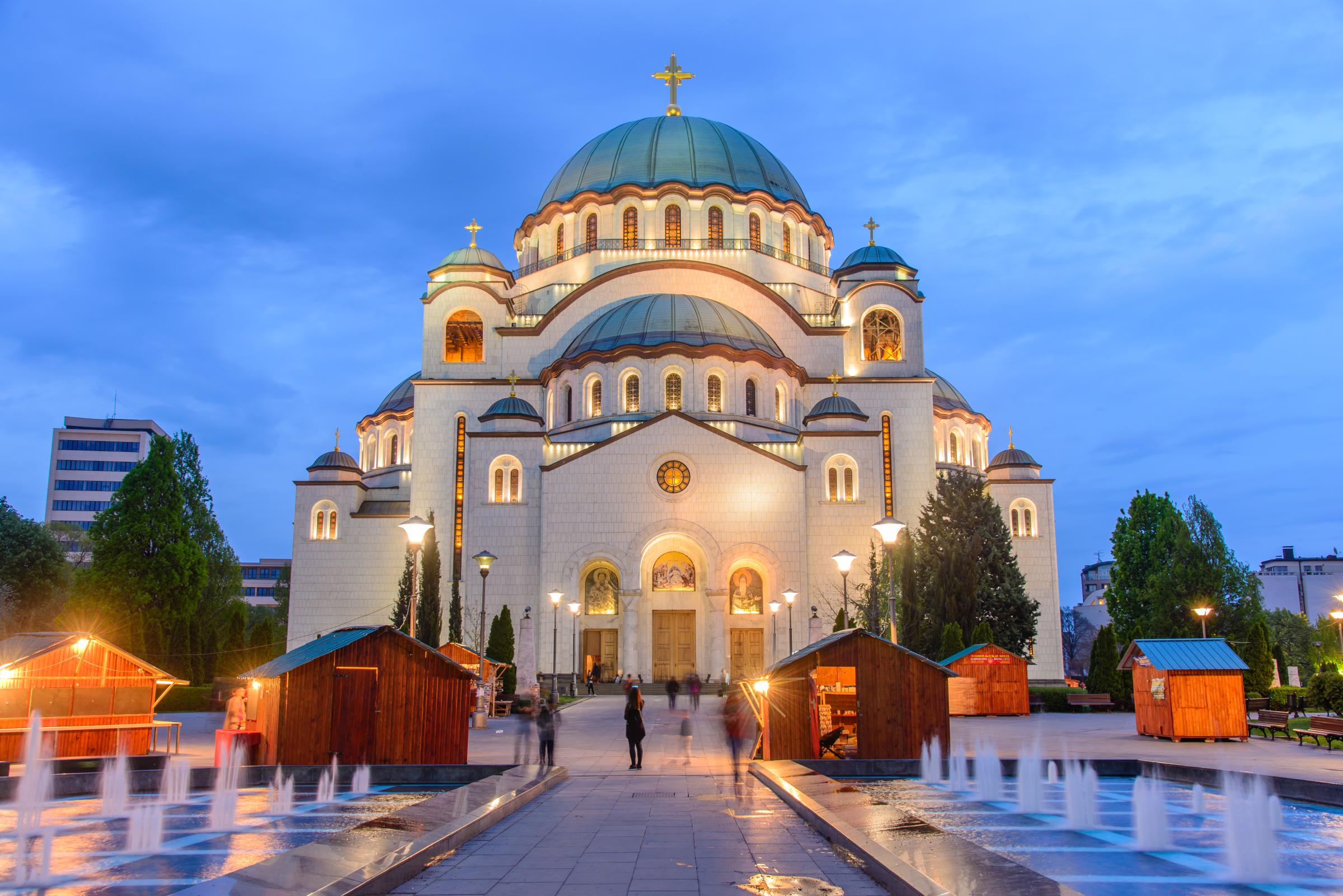
Since the end of the Yugoslav wars, Belgrade has attracted steady investment—its graffiti-covered neighborhoods are now full of restaurants and bars. You’ll find hearty platters of ćevapi—smoky sausages without casing—and stuffed somborka peppers at Sokače, paprika-laden kebabs at Tri Šešira, and pan-Latin tapas at Toro. But the biggest draw is the growing craft-beer scene (the city has 37 breweries). Don’t miss the Kabinet Supernova IPA at Prohibicija in the bar-filled Savamala district, as well as Kas’s full-bodied pale ales and Salto’s IPA at Bajloni, set in a 100-year-old brewery space in Cetinjska. —Govind Dhar
Bermuda
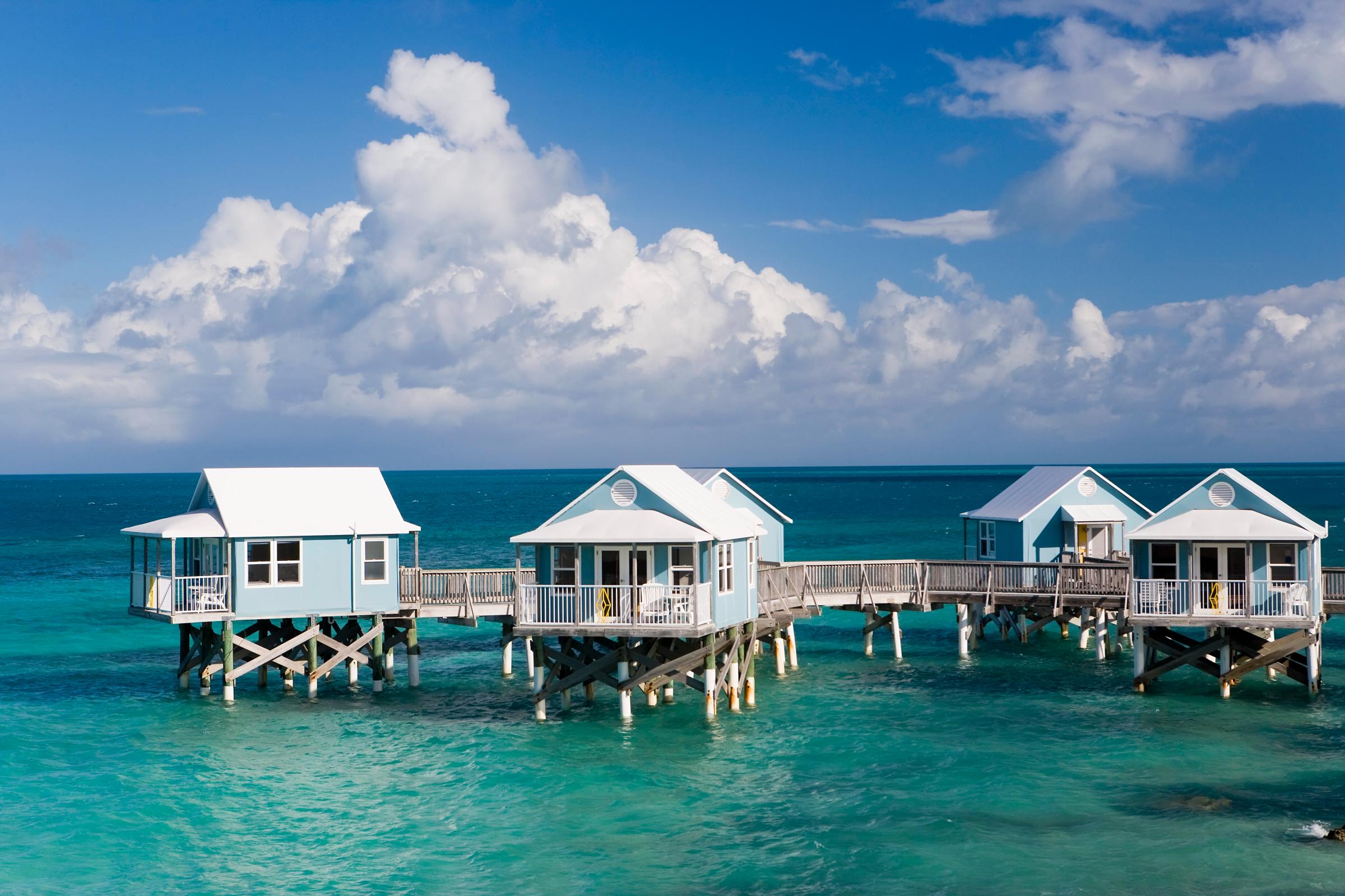
After being hit hard by the financial crisis, Bermuda is shaking itself out of stagnation and attracting a new generation of travelers. In 2014, the island won a bid to host the 35th America’s Cup, the high-profile international sailing race, which takes place this June. The promise of a flood of wealthy visitors—and a loosening of restrictions on foreign investment—has sparked a spate of development. Big news is the $100 million overhaul of the Hamilton Princess & Beach Club, the island’s 132-year-old grande dame, whose revamped rooms have a fresh, contemporary look. The hotel has also added a stellar art collection, a spa, and a restaurant serving locally sourced fare from James Beard Award–winning chef Marcus Samuelsson. Elsewhere on the island, a St. Regis, a lavish Ritz-Carlton Reserve, and the Ariel Sands resort (backed by actors Michael Douglas and Catherine Zeta-Jones) are in the works. —Paola Singer
Cambodian Coast
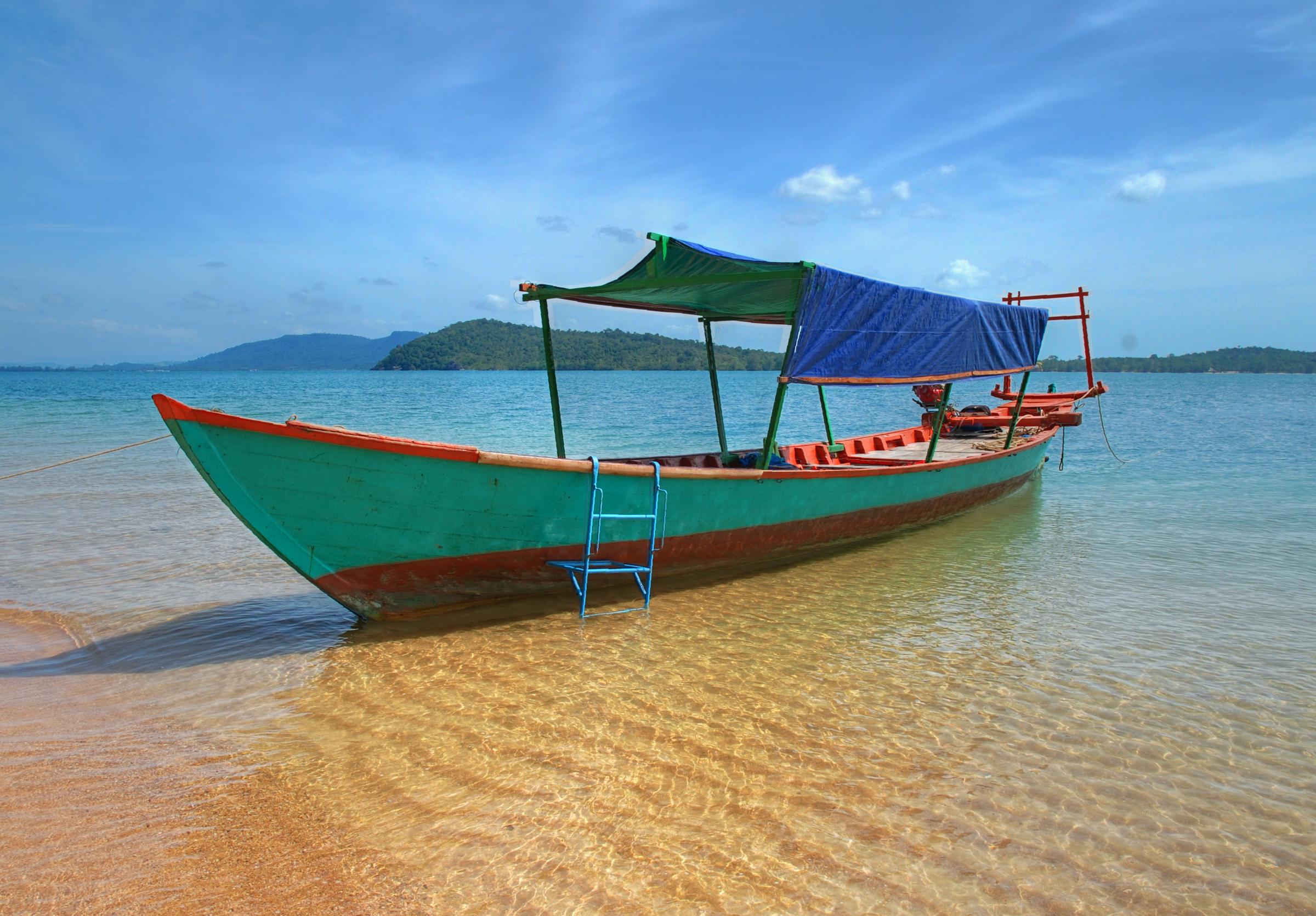
Cambodia has some of Southeast Asia’s most stunning islands, but getting to them has always been arduous (a flight to Phnom Penh, a four-hour drive, then a choppy ferry ride). Luckily, there are now direct flights into the coastal Sihanoukville airport via Ho Chi Minh City. That means a much smoother journey to the newest island escapes: the wellness-minded Six Senses on Krabey Island, where spa treatments are Cambodian-inspired, and the Alila eco-resort on Koh Russey, which has an emphasis on Khmer cuisine and community service. And if you want to spend some time in the capital of Phnom Penh before or after your island vacation, you can do that in style as well: Rosewood has announced plans to open there in early 2017. —Stephanie Wu
Cape Town, South Africa
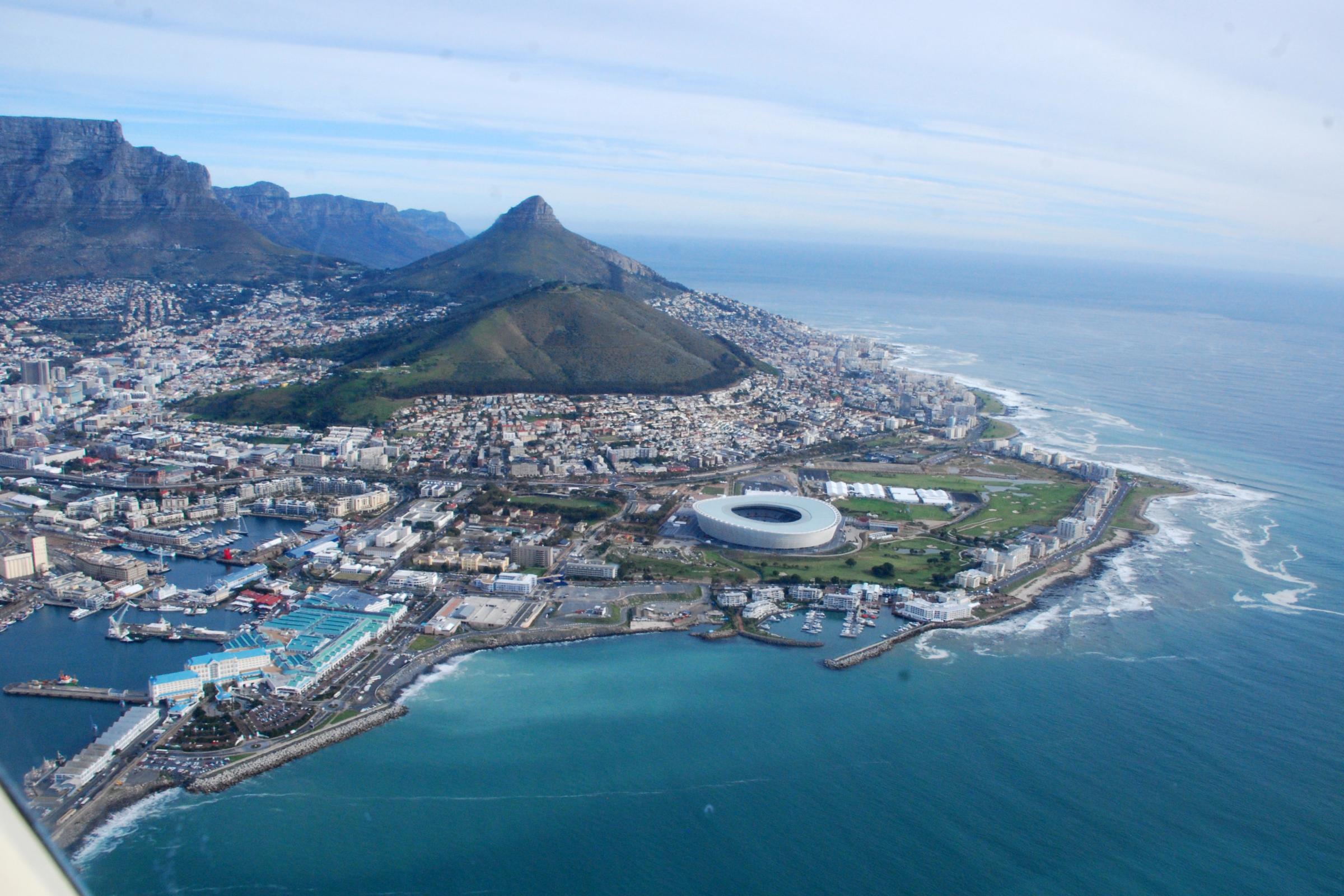
Beyond its iconic mountain backdrop and cinematic beaches, Cape Town has a compelling art and design scene, and it’s only going to get better when the Zeitz Museum of Contemporary African Art opens at the V&A Waterfront in 2017. The MOCAA—heralded as South Africa’s answer to the MoMA or the Tate Modern—will take over a soaring concrete building once used for grain storage. Atop the museum sits The Silo, a luxury hotel from the Royal Portfolio that’s set to open in March. Until then, visitors can fill the hours between gallery-hopping with a taste of the legendary local fare. The surrounding Cape Winelands—Stellenbosch, Constantia, and Franschhoek, among others—keep Cape Town’s residents well hydrated, while acclaimed restaurants like the Test Kitchen (ranked number 22 on the World’s 50 Best Restaurants list) and its new sister spot the Shortmarket Club keep them well fed. —Mary Holland
Cincinnati, Ohio
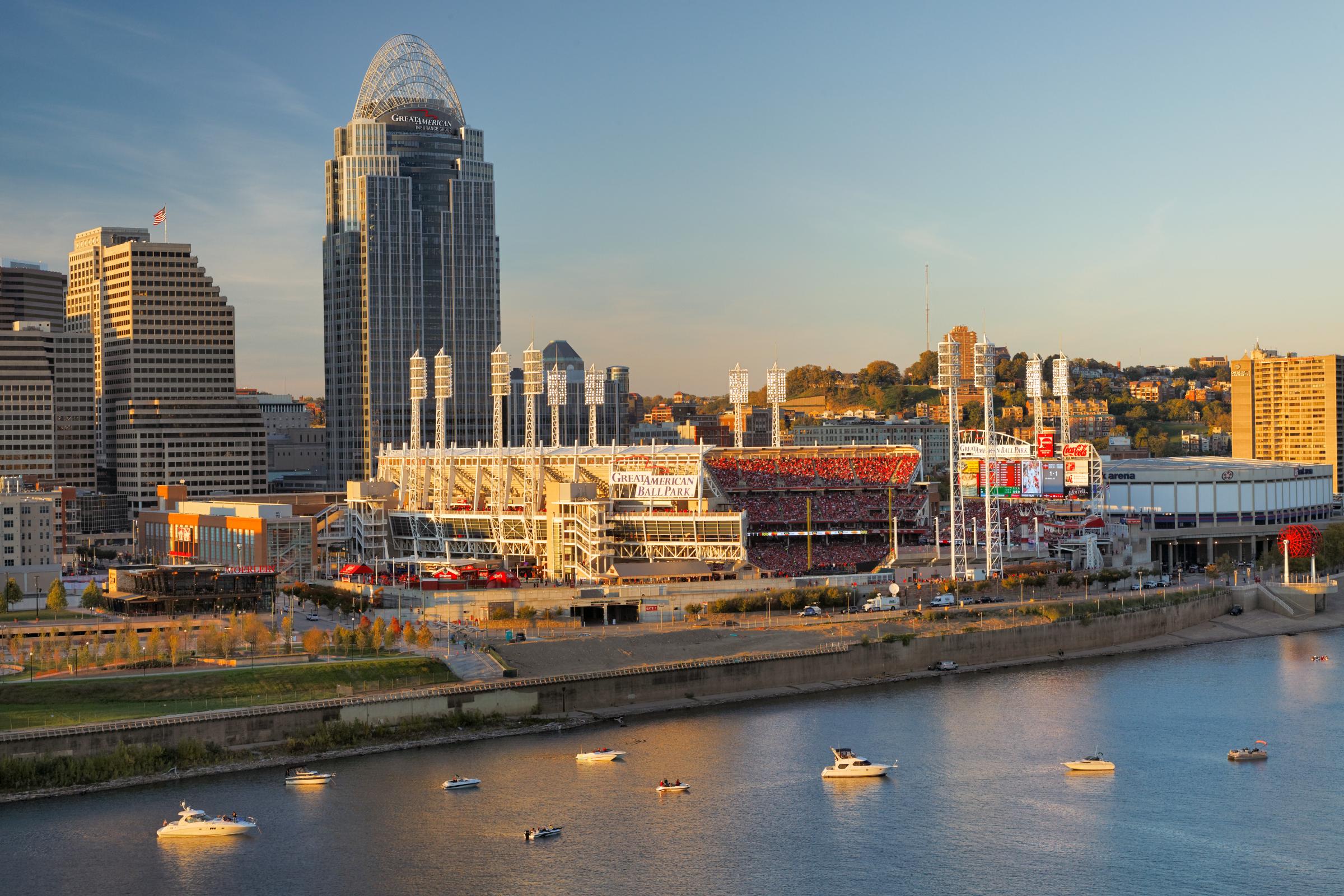
The Queen City’s transformation is most evident in its Over-the-Rhine district, first settled by German immigrants in the 19th century. Once a dodgy neighborhood, it has renovated buildings and warehouses that are now apartments and offices for tech companies. On Vine Street, young brands like interiors shop Elm & Iron sit alongside Cincinnati institutions like Holtman’s Donuts. There are larger changes throughout the city: the new Cincinnati Bell Connector streetcar links the northern fringes of OTR with downtown and the Ohio River, and Ziegler Park, with a deepwater pool and redesigned public spaces, will be unveiled this spring, followed by the reopening of the city’s historic Music Hall and the inaugural Blink Cincinnati light and art festival in October. Locals zip across state lines on a daily basis, and the best new place to bed down is actually a 10-minute drive across the river in Covington, Kentucky. The boutique Hotel Covington occupies the former headquarters of Coppin’s Department Store, and the original 1907 architecture serves its new purpose beautifully: upon entering, you get a sweeping view of reception, the lobby, and the bar with its 20-foot ceilings, thanks to a sloping floor originally designed to let shoppers see the entire department store when they walked through its Madison Avenue doors. Filmmakers are also increasingly drawn to Cincinnati, thanks to its Art Deco buildings and its tax incentives. Off-camera, Nicole Kidman, Colin Farrell, and Ellen Page have all been spotted dining in hot spots like Boca and Sotto and checking in to the art-filled 21C Museum Hotel. —Aoife O’Riordain
Devon, England
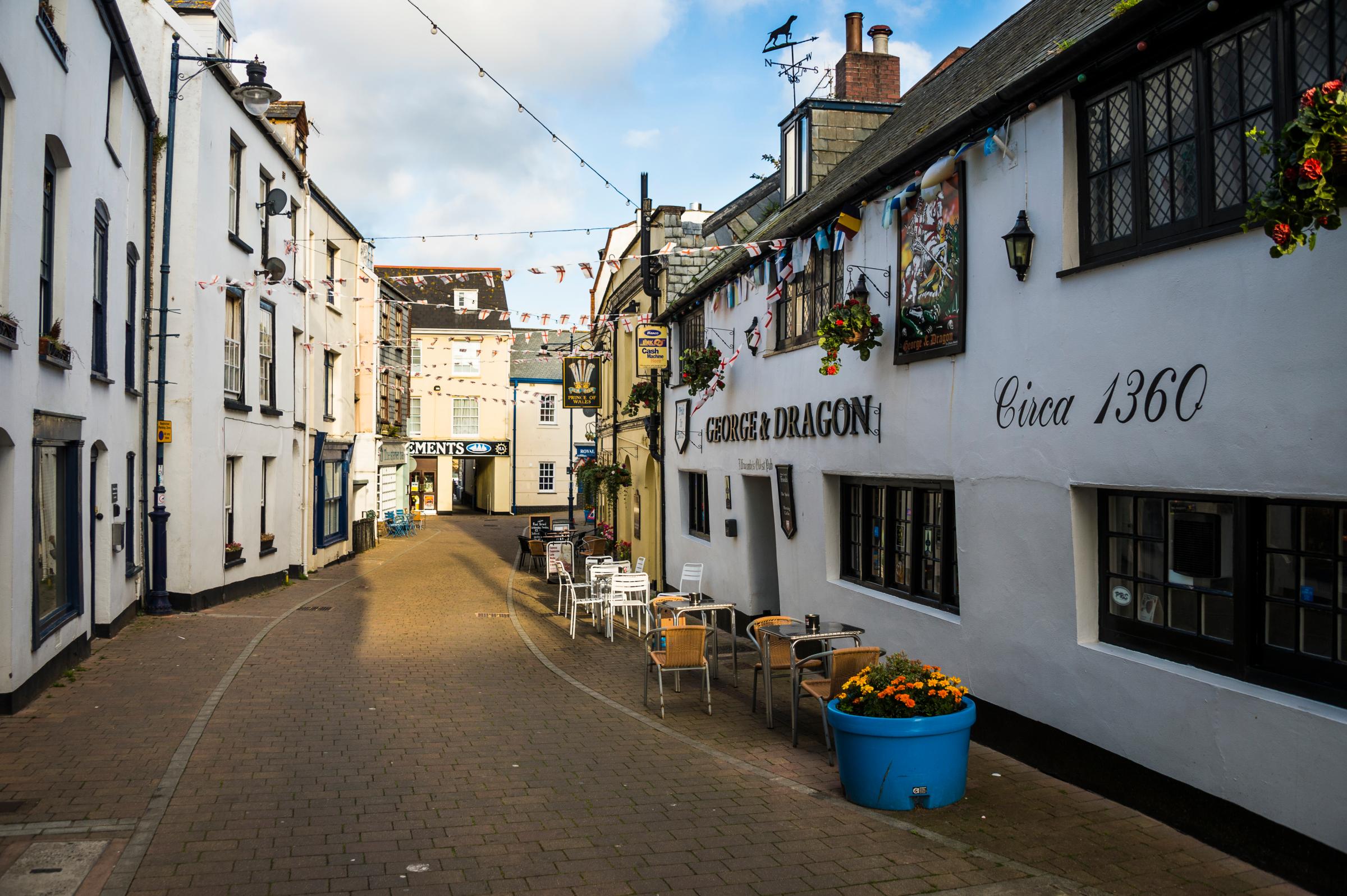
Devon is best known for cream teas and surf beaches, but a raft of openings are elevating the county’s image with rarefied takes on the rural experience. The elegant Lympstone Manor has been reimagined by eminent chef Michael Caines, who will reopen it in 2017 as a 21-room hotel and restaurant. Design lovers can soon overnight at the Secular Retreat, a strikingly minimal property inspired by ecclesiastical architecture and designed by Peter Zumthor. And on the coast, the Art Deco Burgh Island Hotel has another groundbreaking design in the works: a suite that bridges the vertiginous gap between two rocky outcrops. —Emily Mathieson
Guayaquil, Ecuador
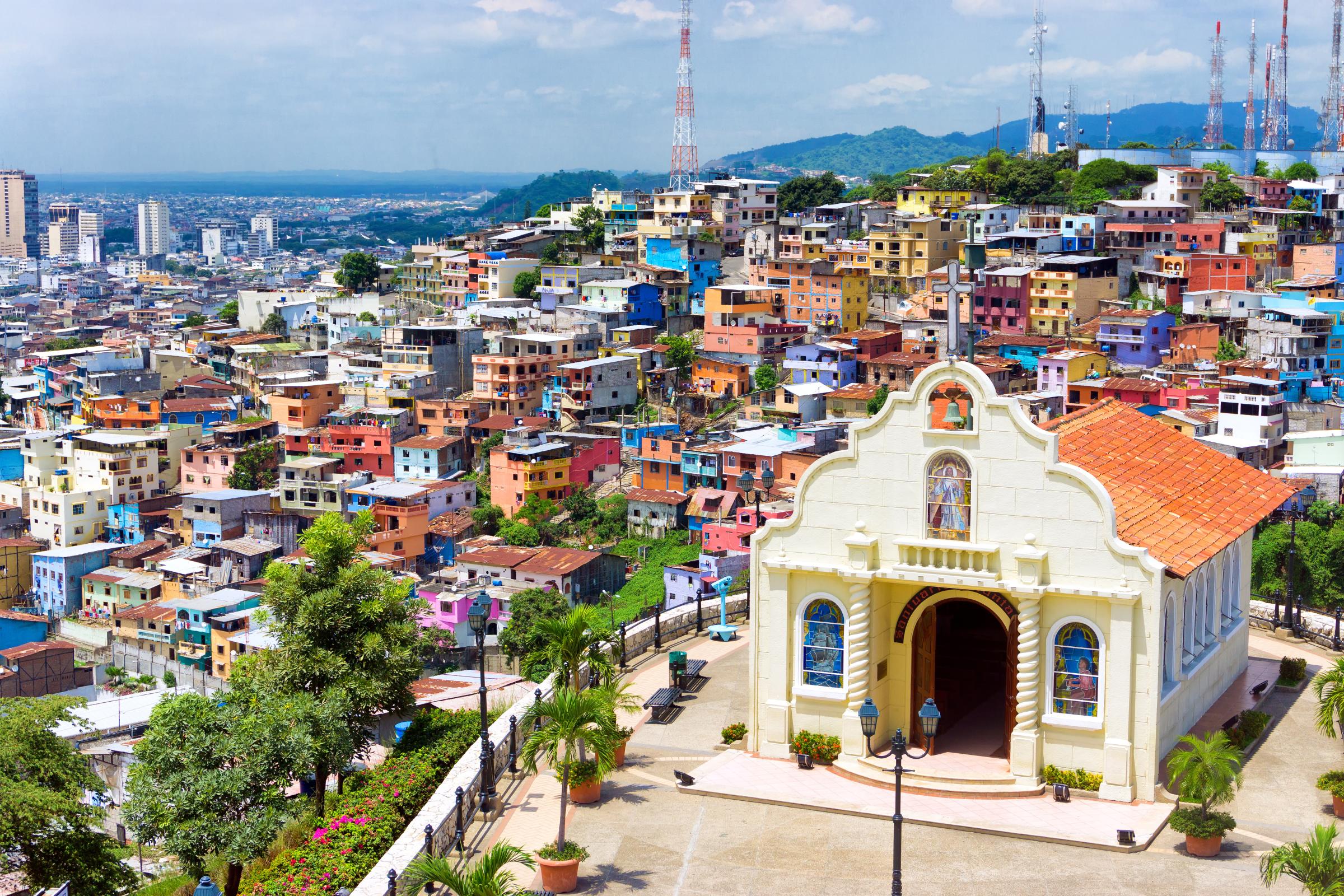
As a gateway to the Galápagos, Guayaquil has seen its fair share of overnight visitors en route to the islands. But additions to the tropical port city are enticing travelers to stay longer. The just-opened Hotel del Parque sets a new standard in the city, with 44 elegant rooms in a restored 19th-century colonial complex that also includes a riverside restaurant. The massage-treatment room is in a repurposed bell tower atop the property’s original chapel, an airy mix of Gothic and Mediterranean styles where mass is still held. And the hotel’s setting on the seven-acre Parque Histórico Guayaquil makes it easy for guests to explore a wildlife sanctuary, historic structures, and a former cacao plantation. See modern Guayaquil when you visit the Malecón 2000, the city’s revitalized riverfront promenade lined with plazas, playgrounds, monuments, galleries, gardens, and two fantastic museums. Go at night for the best view, when the Ferris wheel—Ecuador’s newest toy—is backed by the twinkling lights above the hillside village of Las Penas. —Nina Kokotas Hahn
Hamburg, Germany
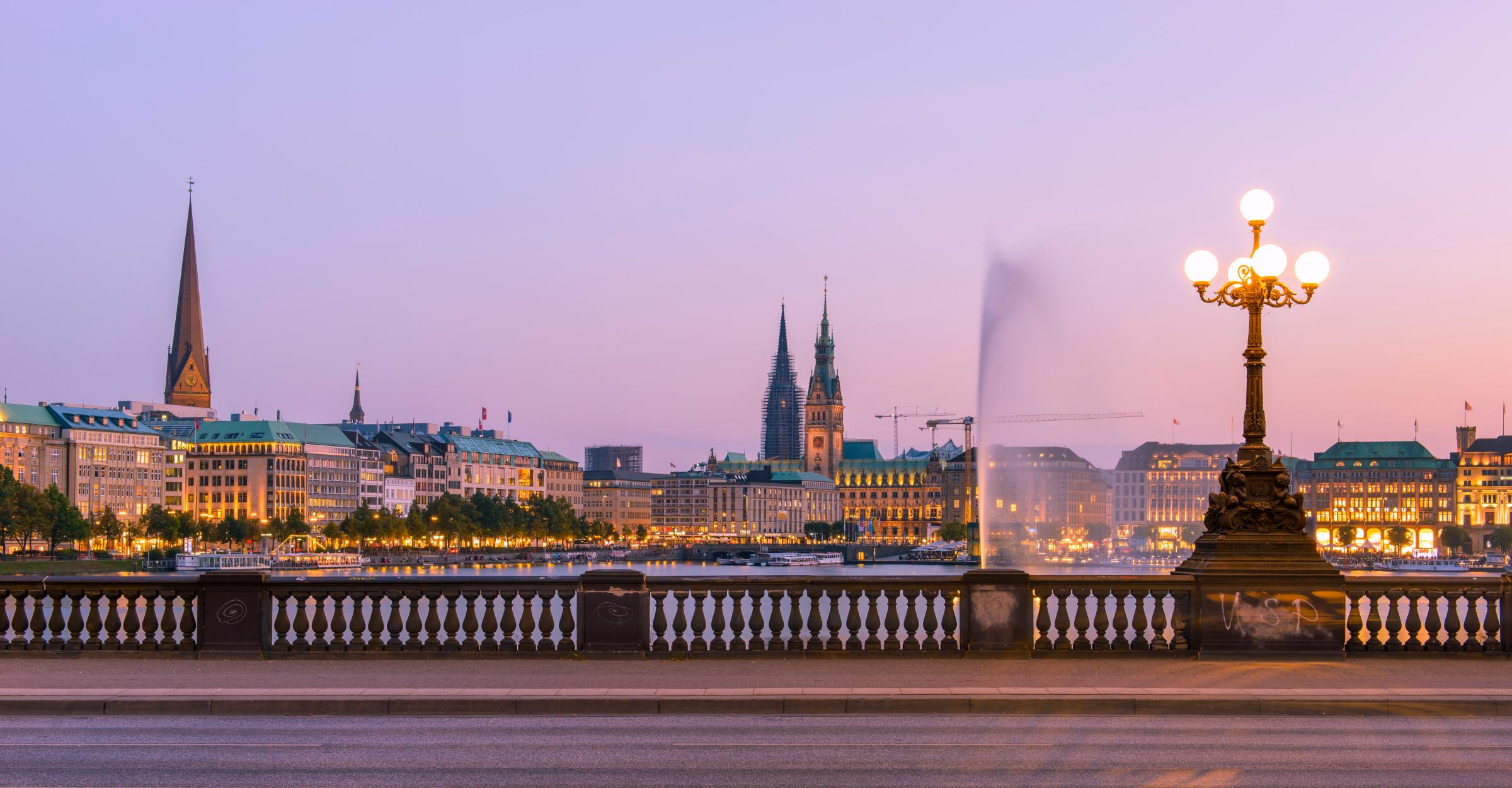
Slicker than graffiti-laden Berlin and edgier than Munich or Frankfurt, this booming port town has always been one of Germany’s most intriguing cities. Recent years have seen the banks of the Elbe River morph into an architectural wonderland, with icons such as Zaha Hadid’s River Promenade reshaping the landscape. The Elbphilharmonie Hamburg by Herzog & de Meuron, a concert hall featuring an undulating glass structure on top of a midcentury brick warehouse, will welcome visitors for its inaugural performance on January 11, 2017. Not far away, The Fontenay, a stylish grande dame, will open its doors in summer. The once-gritty isle of Wilhelmsburg is transforming into a hot spot, drawing comparisons to the similar-sounding Williamsburg in Brooklyn thanks to projects like IBA Hamburg – Energiebunker—a former air-raid bunker converted into an eco-friendly power source—WCW Gallery, and third-wave coffee shops like Kaffeeliebe. —Diana Hubbell
Hampi, India
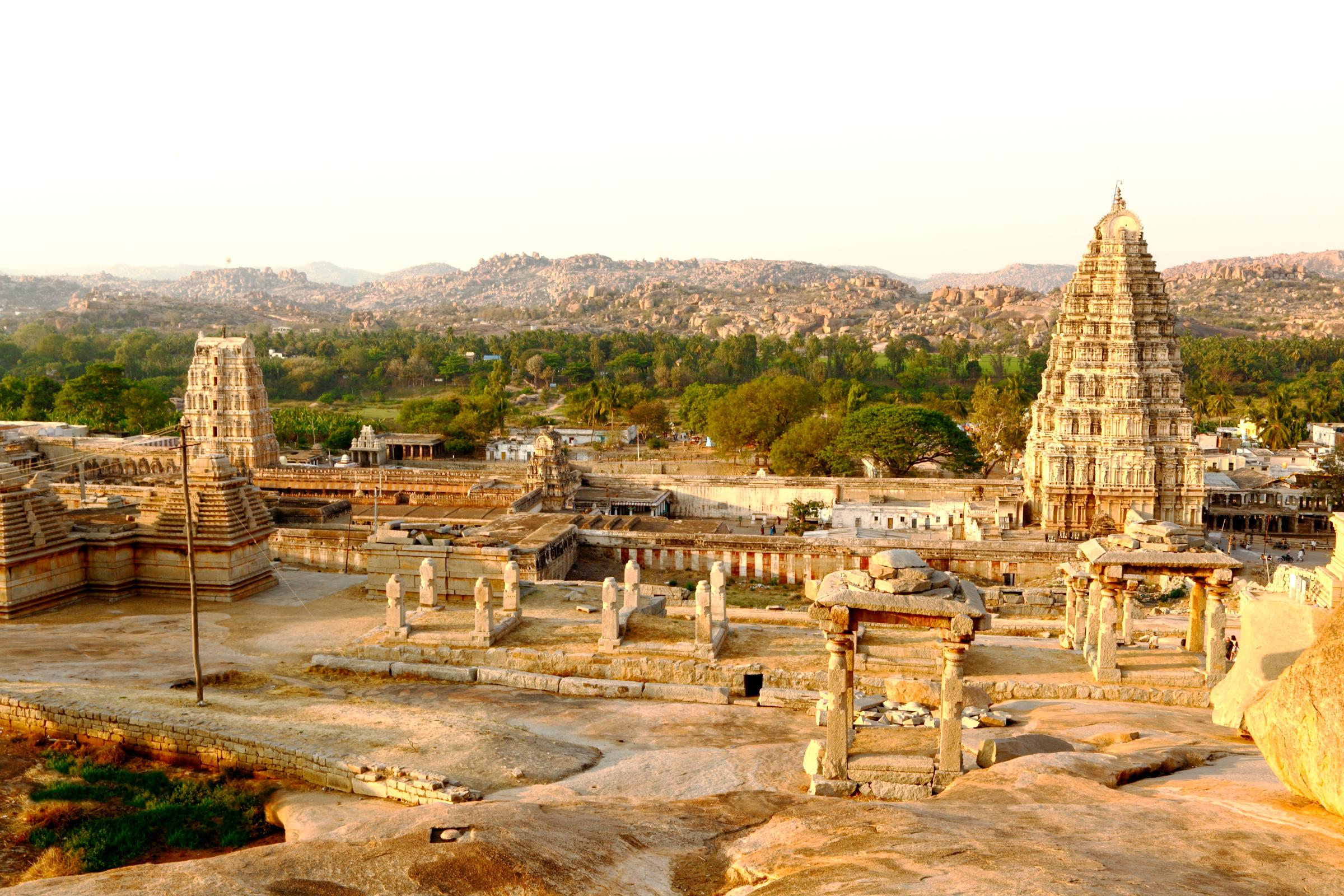
One of India’s most spectacular monuments will become newly accessible this year with the launch of a high-end resort in Hampi. When the 14th-century capital of the Vijayanagara Empire was constructed, in what is now the southwestern state of Karnataka, it was one of the largest cities in the world. The ruined settlement’s dazzling temples, monuments, and public buildings—strewn across a landscape of giant boulders, banana groves, and rice paddies—have long been a must-visit for dedicated Indophiles. But the town of Hampi has lacked world-class accommodation and infrastructure, making a visit less than luxurious. Now the new Orange County, Hampi offers a solution: 46 rooms spread across a palatial, Vijayanagara-inspired estate less than three miles from the UNESCO World Heritage site area. As Lucy Davis, director of India tour operator Banyan Tours, puts it, “the property is a game-changer for visitors to Hampi.” —Flora Stubbs
Helsinki, Finland
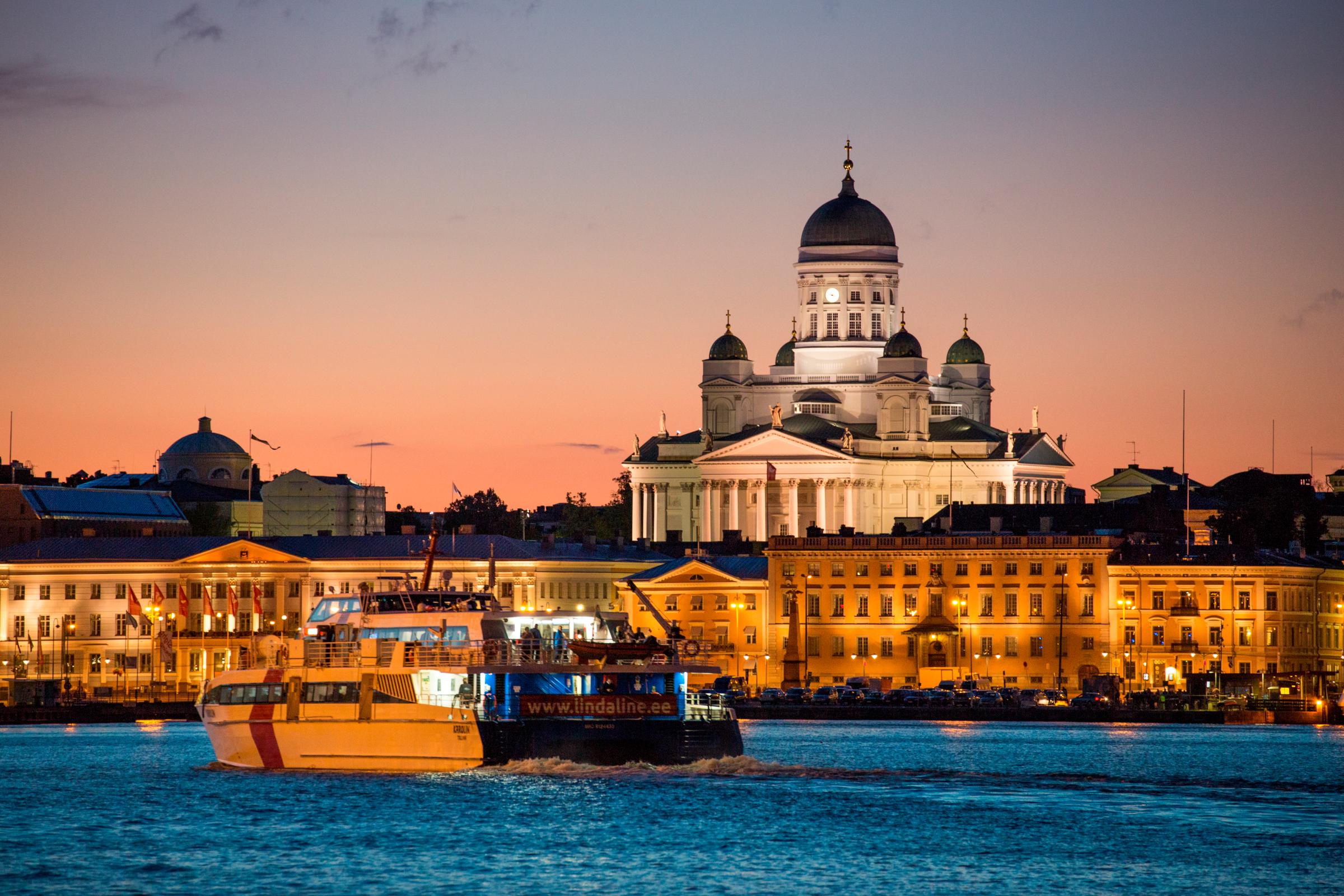
Finland celebrates 100 years of independence on December 6, 2017, but the parties will start much earlier—and many of them will be happening in Helsinki, the capital. The country’s gift to itself is a major new landmark: the sinuous Central Library, designed by ALA Architects to be Helsinki’s new living room (it will open in 2018). Sauna culture is a big part of everyday life in the city. The latest and greatest public one is Löyly, a contemporary geometric complex of wood designed by Avanto Architects. And on Sauna Day, which takes place twice a year, several unique private saunas, including one on a raft and another in a castle, open to the public. When it comes to a design-savvy place to stay, book a room at Lilla Roberts, at least until the summer opening of sister hotel St. George, a grand 150-room property in a 19th-century landmark building. —Gisela Williams
Honolulu, Hawaii
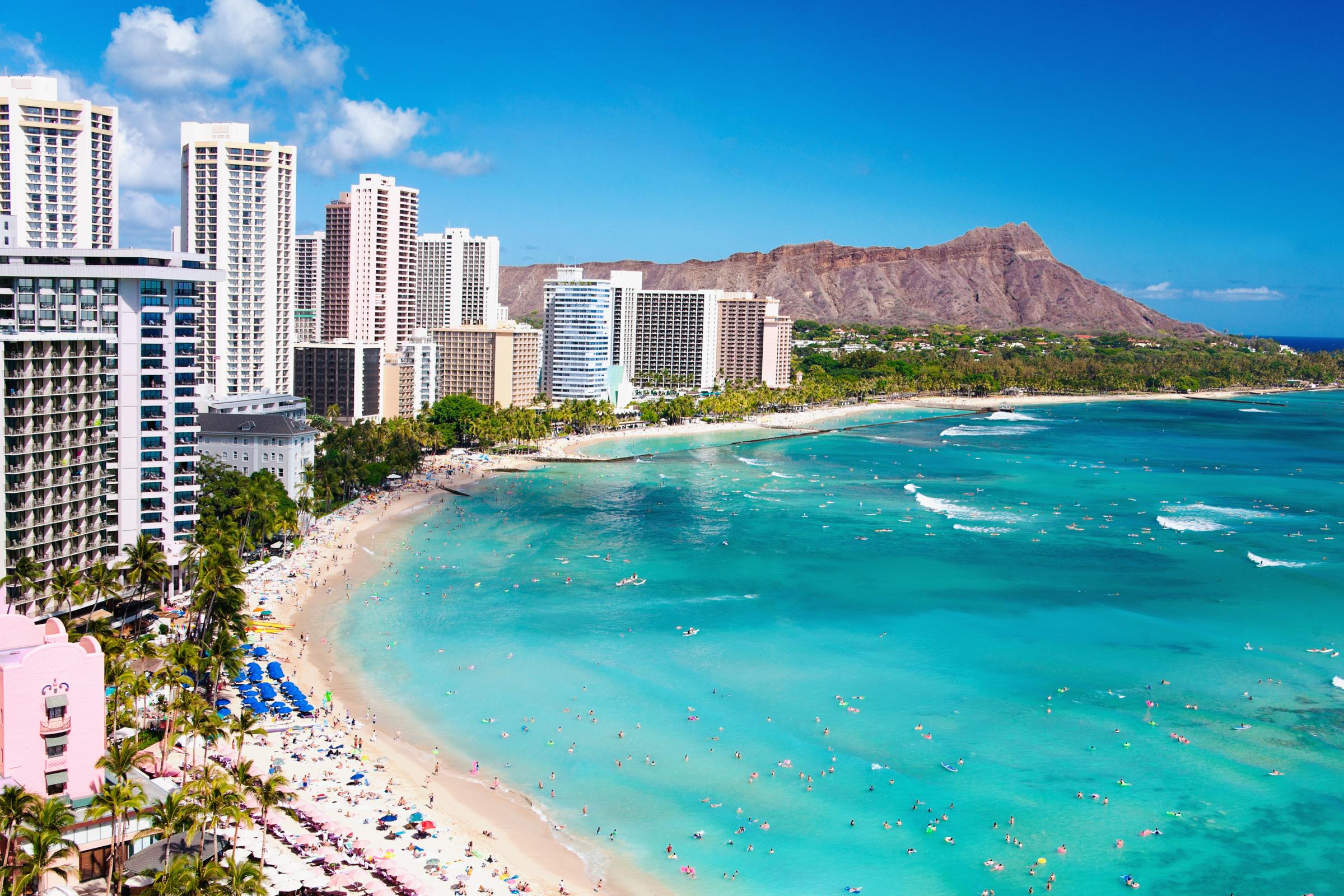
The tides are changing in Honolulu. Hawaii’s capital is becoming a cultural powerhouse—in 2017 it will host its first Biennial, which will attract artists from across the Pacific Rim as well as celebrate Hawaii’s own underrepresented artists. Check out the litany of installations, panel discussions, and performances from March 8 to May 8, when creative forces will transform sites like Foster Botanical Garden, City Hall, and Chinatown. But the cresting art scene can be found year-round. In the gritty Kaka’ako neighborhood, dozens of new Pow! Wow! murals saturate the walls of warehouses, construction sites, and burgeoning collectives-cum-galleries like Lana Lane Studios. Further proof the capital is becoming an arts hub: Even touristy Waikiki is changing, thanks to brand new art-centric hotel, Surfjack Hotel & Swim Club, which collaborated with local artists—from the restrooms’ custom bird-of-paradise wallpaper to the Matthew Tapia–designed graphic mural at the bottom of the pool that reads “Wish You Were Here.” —Jenna Scatena
Indianapolis, Indiana
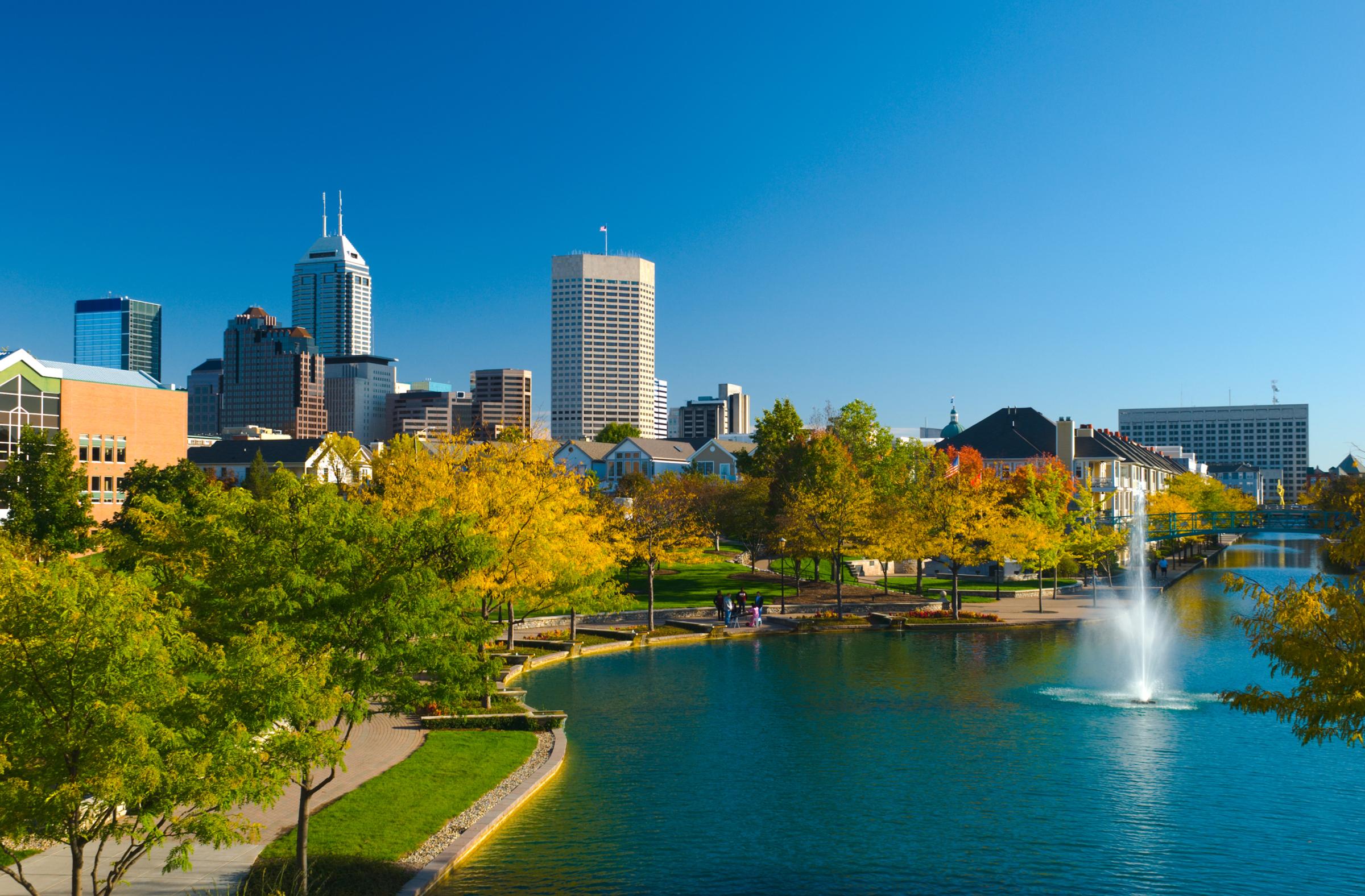
The city shattered expectations of Midwestern dining a couple of years ago with the opening of beloved brunch spot Milktooth, and the culinary scene has only gathered steam since then. In the fall, Indy hopped on the fried-chicken trend with Crispy Bird, a sustainability-focused joint from James Beard Award–nominated restaurateur Martha Hoover, while Milktooth’s Jonathan Brooks lent his expertise to the gastropub menu at the Owner’s Wife. This coming year, Sun King Brewery will open a 15,000-square-foot distillery in nearby Carmel. And with hotels in the works from 21c, Ironworks, and home-goods brand West Elm, Indianapolis is poised to become America’s next big destination. —Lila Battis
Jackson Hole, Wyoming
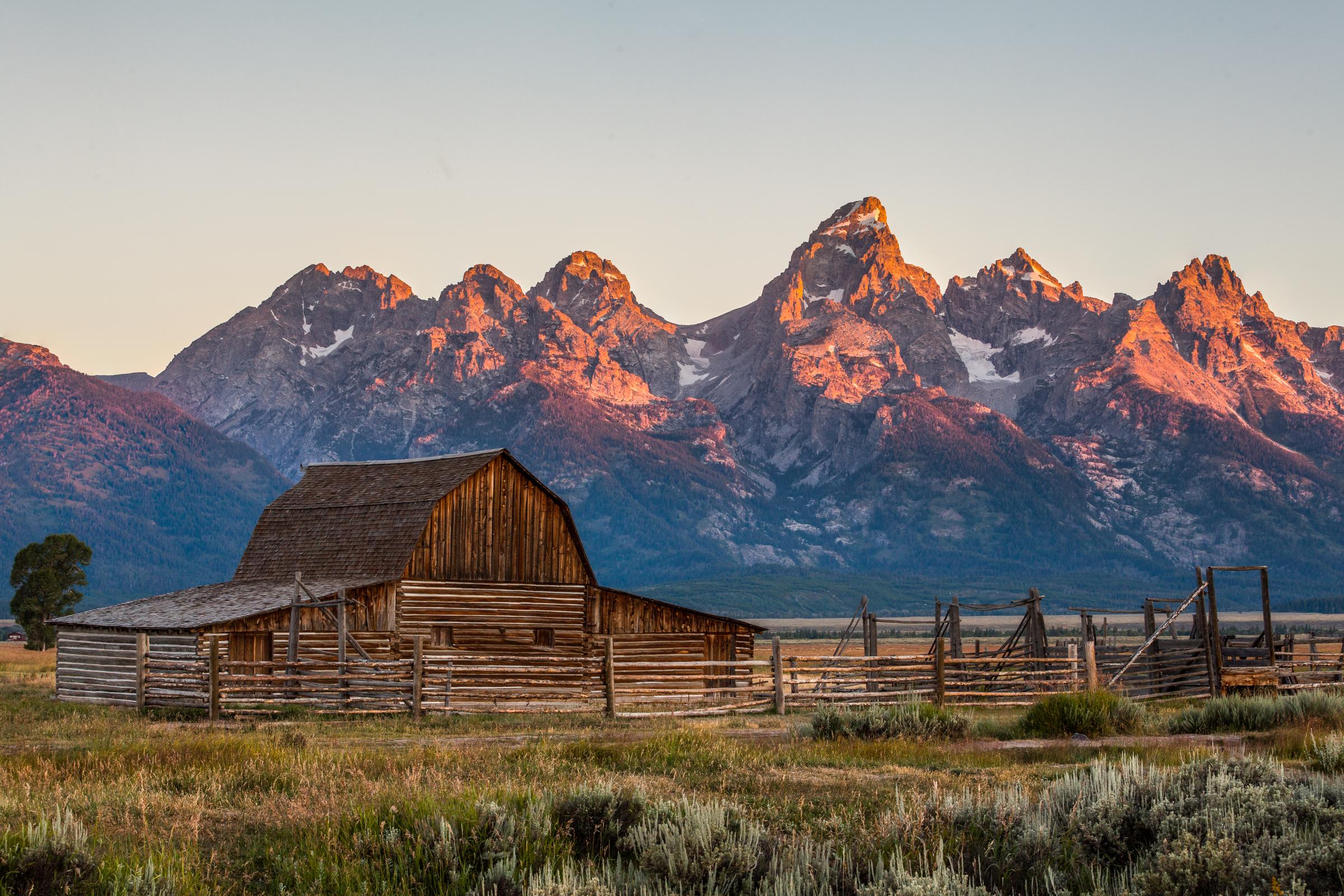
The total solar eclipse on August 21 will be the first in almost 40 years to be visible from the continental U.S., with a path of totality that slashes across the States from Oregon to South Carolina. For prime viewing, head to Jackson Hole—spectacular scenery, expansive vistas, and minimal light pollution make it an ideal vantage point. Once the two-minute main event is over, there are plenty of warm-weather activities to keep you occupied, from hiking the backcountry of Grand Teton and Yellowstone national parks to exploring Jackson proper (be sure to snag a pastry at Persephone Bakery and a chic, locally crafted souvenir at Made). —Lila Battis
Jebel Akhdar, Oman
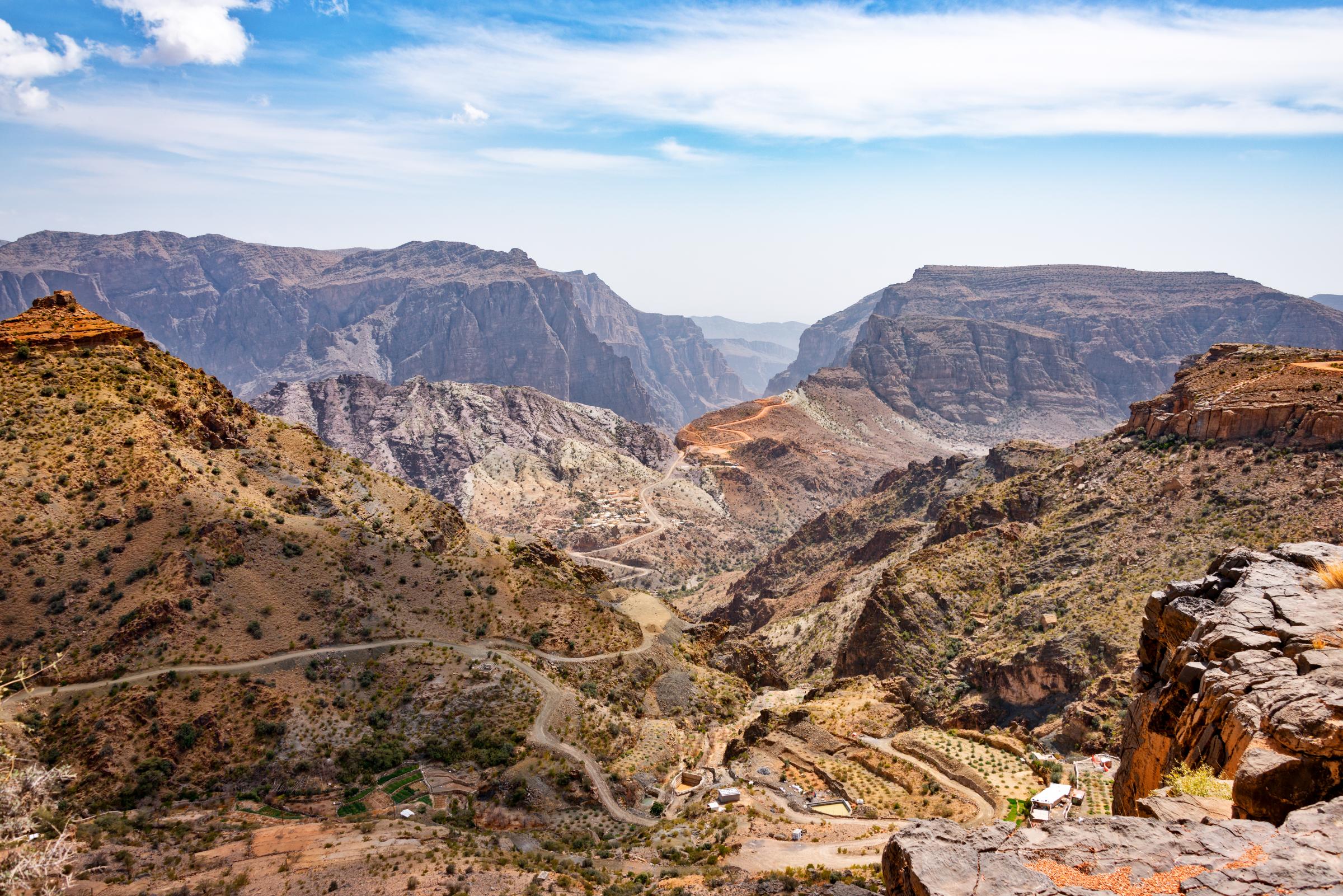
A two-hour drive from Muscat, in the rocky contours of Oman’s Al-Hajar Mountains, is Jebel Akhdar, an area beloved for its astounding views, craggy wadis, and natural terraces. Come spring, a blanket of velvety pink damask rose blossoms shroud the hills with their romantic scent. From these blossoms, distillers produce soothing rosewater potions that are used in both spa treatments and cocktail menus. To best experience Jebel Akhdar, head to the recently opened Anantara Al Jabal Al Akhdar. The magnificent property is giving the region’s reigning boutique hotel, the Alila Jabal Akhdar, a run for its money. While both promise canyon-view infinity pools and post-hike pampering treatments, the Anantara’s splashy suites, six restaurants, and amenities (like a cliff-side private meal), are unbeatable. —Dylan Essertier
Jerusalem, Israel
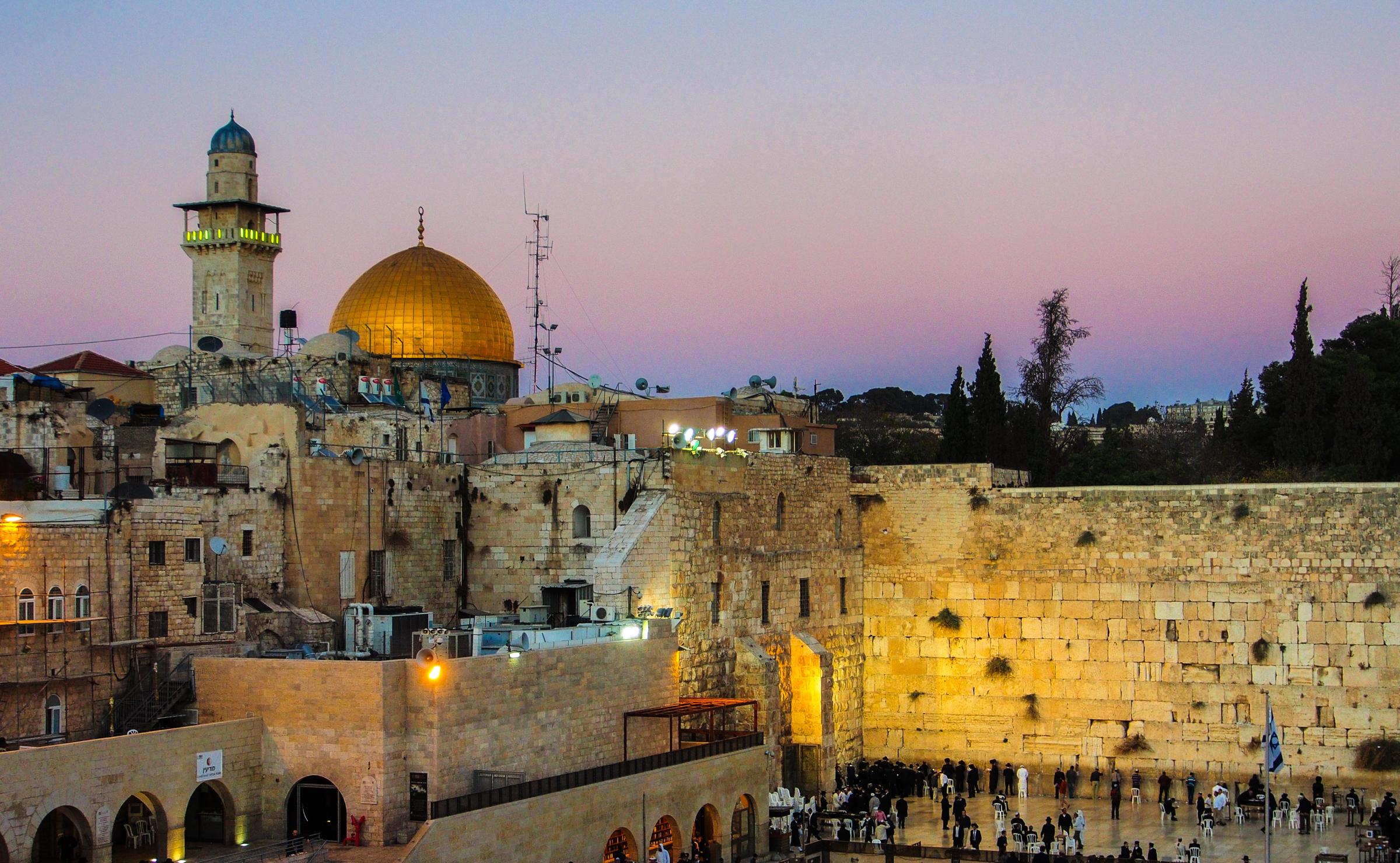
Typically more of a pilgrimage site than a sybaritic city, Jerusalem has now emerged as a culinary force to rival Tel Aviv. At the sprawling Mahane Yehuda Market, food-and-drink spots have popped up in produce stalls, many of which stay open long past sunset. The Jewish diaspora and Middle East merge at restaurants like Ishtabach—try the Kurdish shamburak, a pastry with brisket, potatoes, and chimichurri—and Machneyuda, known for its standout beef tartare with plums. Stay at the new boutique Brown Jerusalem Hotel, which will open soon in a restored Ottoman-era villa and serve drinks in an underground water cistern. —Sara Toth Stub
Jura, France
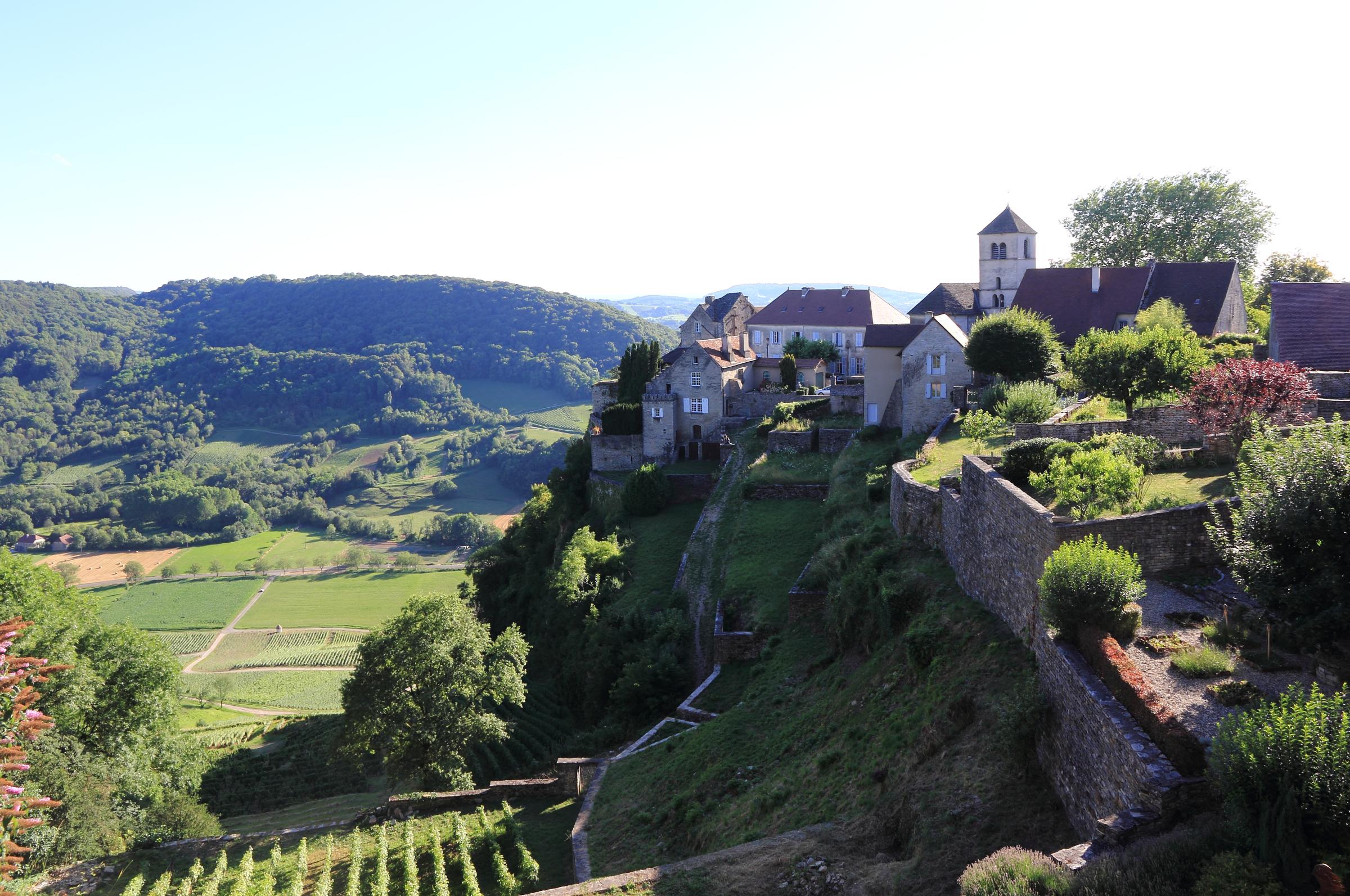
Concealed by Alpine peaks and rolling, wooded hills, Jura—France’s smallest wine region—has long been shielded from the swarms that descend upon Burgundy to the west and Switzerland to the east. But in recent years, the Jura’s highly idiosyncratic, oxidative wines have generated explosive interest, with bottles making regular appearances on sommelier lists at U.S. restaurants like Eleven Madison Park and the French Laundry. Thanks to the newfound attention, the secret of Franche-Comté’s remote gem—a medieval-era region perfect for gourmands and nature-lovers—is out at last. Oenophiles will want to visit buzzy vineyards like Domaine André & Mirielle Tissot; co-owner Stéphane Tissot is a dynamic, progressive vintner who produces one of Jura’s famous sherry-like vin jaunes. Pair them with the Jura’s rich, rustic cuisine and the regional specialty, wheels of raw-milk Comté cheese. Burn off the calories hiking, cycling, or skiing the miles of quiet trails that arc around steep mountain ridges, shimmering lakes, and primordial waterfalls. For lodgings, turn to Les Jardins sur Glantine, a charming B&B that also produces superb natural wines. —Christopher Ross
Kanazawa, Japan
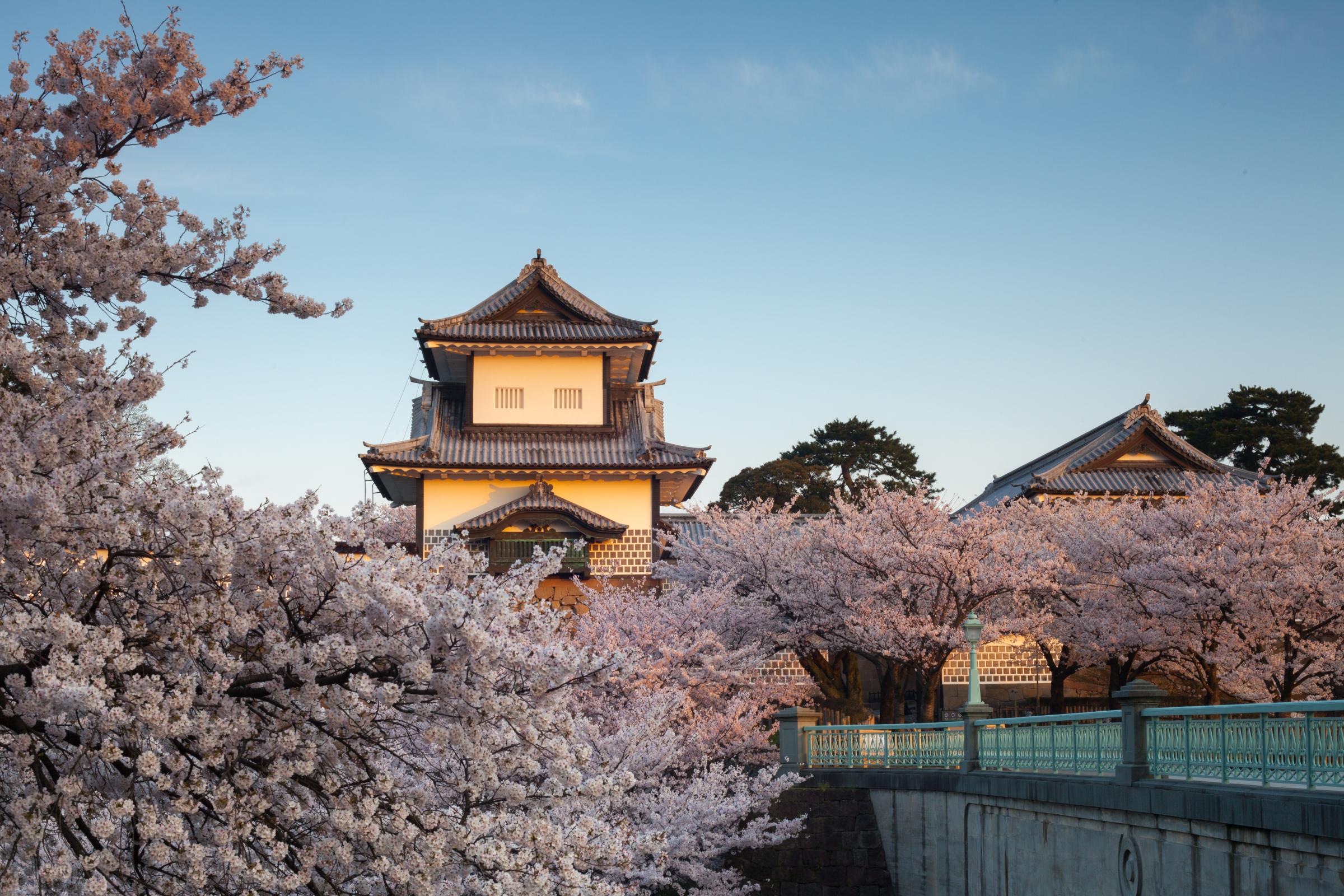
This city on the western coast of Honshu has seen a boost in visits since a bullet-train extension shortened the trip from Tokyo to just 2½ hours. Go for the old wooden teahouses of the Higashi Chayagai district, the beautiful samurai residence in Nagamachi, and the contemporary art museum. Then have your pick of sushi that’s just as good as, and much cheaper than, what you’d find in Tokyo. Try it at Sentori, Kagayasuke, or Omi-cho Market—a favorite of sushi master Masa. For a truly traditional experience, head to the Noto Peninsula and stay in a Japanese farmhouse, where you can forage for wild mountain greens and mushrooms and dine by an indoor fire pit. —Selena Hoy
Lake Lucerne, Switzerland
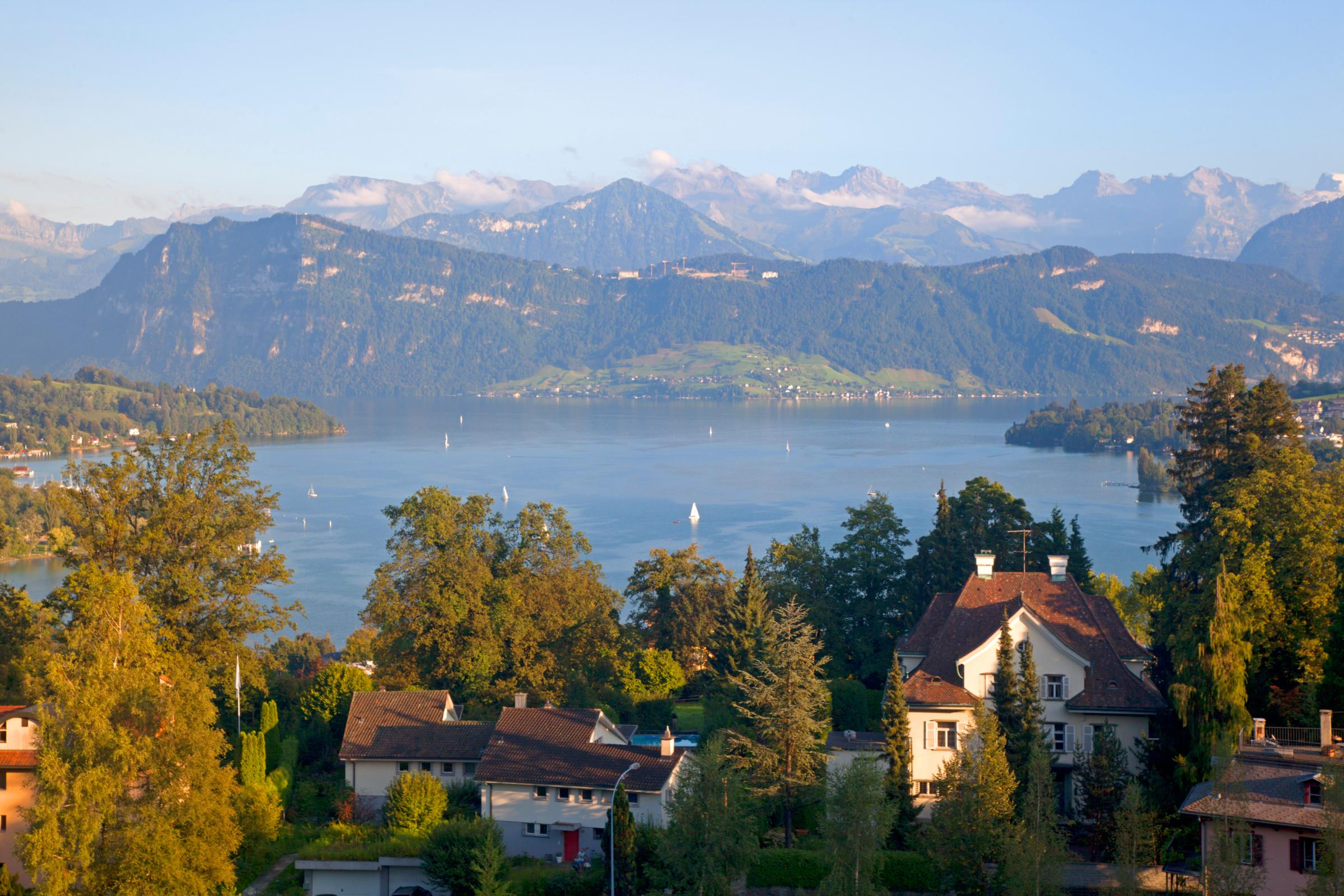
The city of Lucerne’s medieval charms continue to draw busloads of tourists, but neighboring Lake Lucerne is full of developments that entice visitors to venture out as well. Make your base the ultramodern Bürgenstock, a $480 million project that opens in mid 2017 with scenic lake views, four hotels, and a massive yet tranquil spa. From there, explore the craggy summit of Mount Pilatus—once thought to be a dragon den, it’s become more accessible lately (its popular cog railway will be included in the Swiss Travel Pass starting this year). At the lake’s southern arm, called Lake Uri, the 36-mile-long Gotthard Base Tunnel (the world’s longest train tunnel) opens for passenger service in December 2016—it has shaved 40 minutes off the trip from Milan. Hikers to the region won’t be disappointed either: the nearby village Engelberg has created the Buiräbähnli Safari, a two-night Alpine trek that utilizes farmer’s gondolas and aerial cable cars to visit remote farms, where you can sample cheese and Alpine butter. —Adam H. Graham
Laos
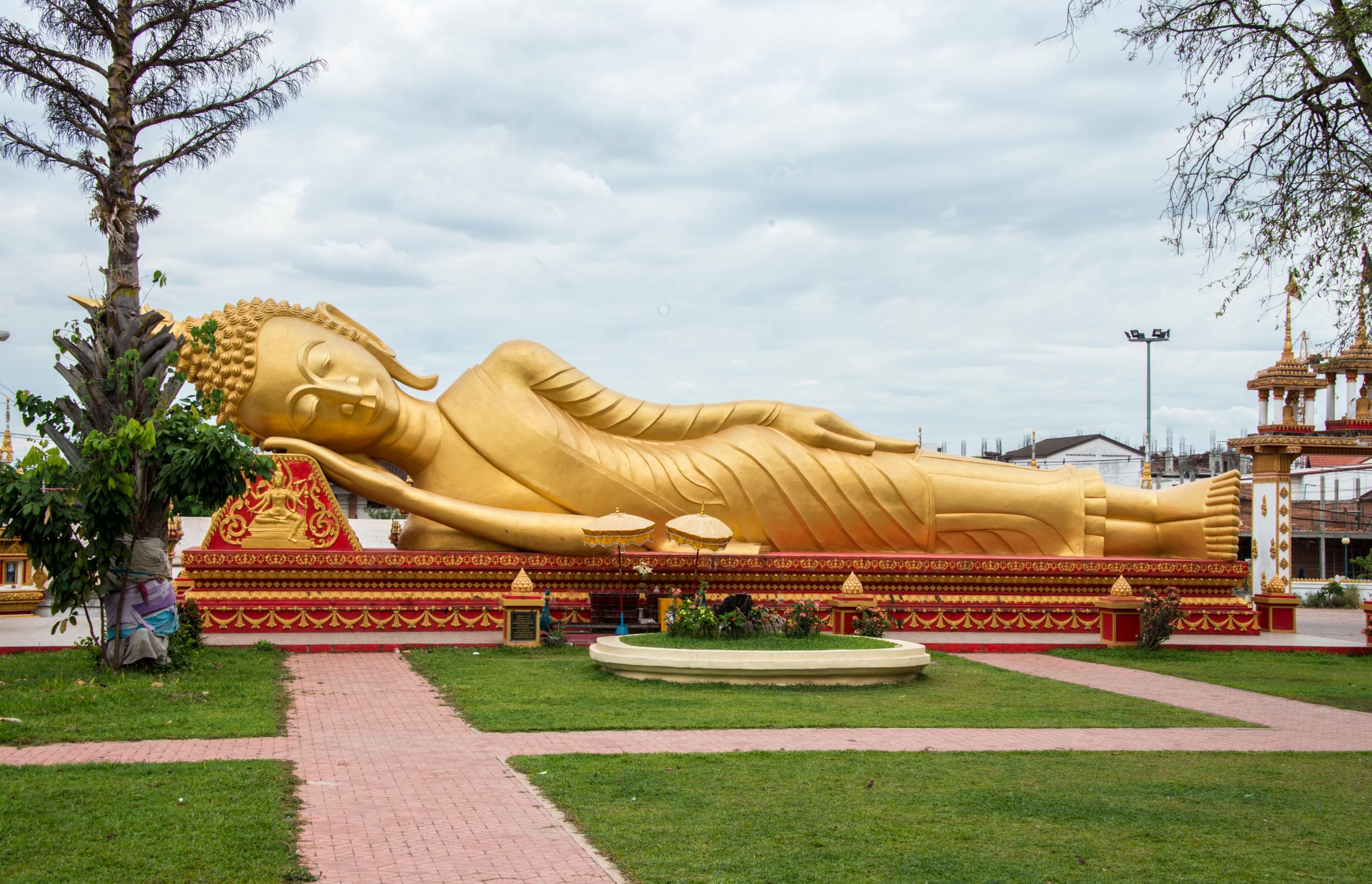
Despite its many allures (milky-blue terraced waterfalls, mountains blanketed with jungle, centuries-old golden stupas, and crumbling temples) landlocked Laos has always been overshadowed by its tourist-magnet neighbors. But that’s changing: in the fall, the country was thrust into the international spotlight with a historic visit from Barack Obama, the first sitting U.S. president to set foot in the nation. Recent negotiations with Thailand opened up additional flights from Bangkok, and new upscale lodgings have made Laos’s two major cities—the temple-studded capital of Vientiane and Luang Prabang, a UNESCO-protected town prized for its natural sights and mix of traditional and French-colonial architecture—much more accessible. In 2017, the President by Akaryn—the area’s first five-star hotel—arrives in Vientiane just steps from the temple of the Emerald Buddha, followed by a Rosewood in Luang Prabang. —Lila Battis
La Paz, Bolivia
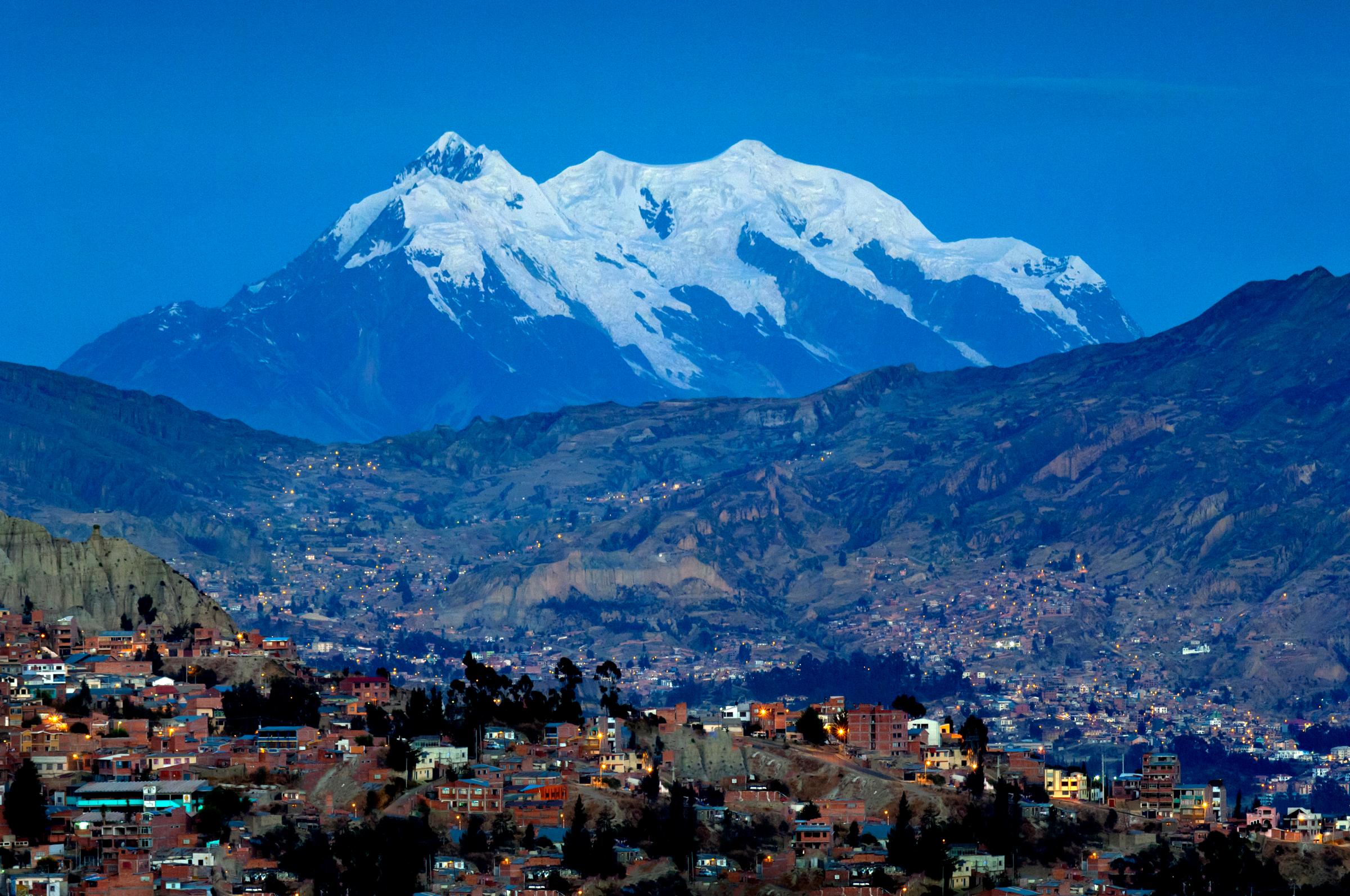
Once beleaguered by frequent strikes, roadblocks, and a paucity of amenities, the backpacker haven of La Paz has emerged as a true culture capital. Infrastructure has played a key role: in 2014 the city introduced Mi Teleférico, a network of aerial trams that transport riders across the city in minutes on routes that once took an hour by bus. The city’s culinary scene is being driven by fine-dining restaurant Gustu, launched by Noma cofounder Claus Meyer in 2013. Since then, the restaurant scene has exploded with ventures from Gustu alums: elevated vegan fare at Ali Pacha,locally inspired pastas at Propiedad Pública, and house-roasted, single-origin coffee at Typica. Stay in the city’s first Design Hotel, the Atix. Each of the 53 rooms doubles as a gallery, displaying works by Bolivian artists like Gastón Ugalde. It’s a microcosm of the city’s thriving contemporary art scene: galleries like Mérida Romero, Mamani Mamani, and the reopened Salar Galería de Arte showcase much of the country’s top talent. —Nicholas Gill
Madagascar
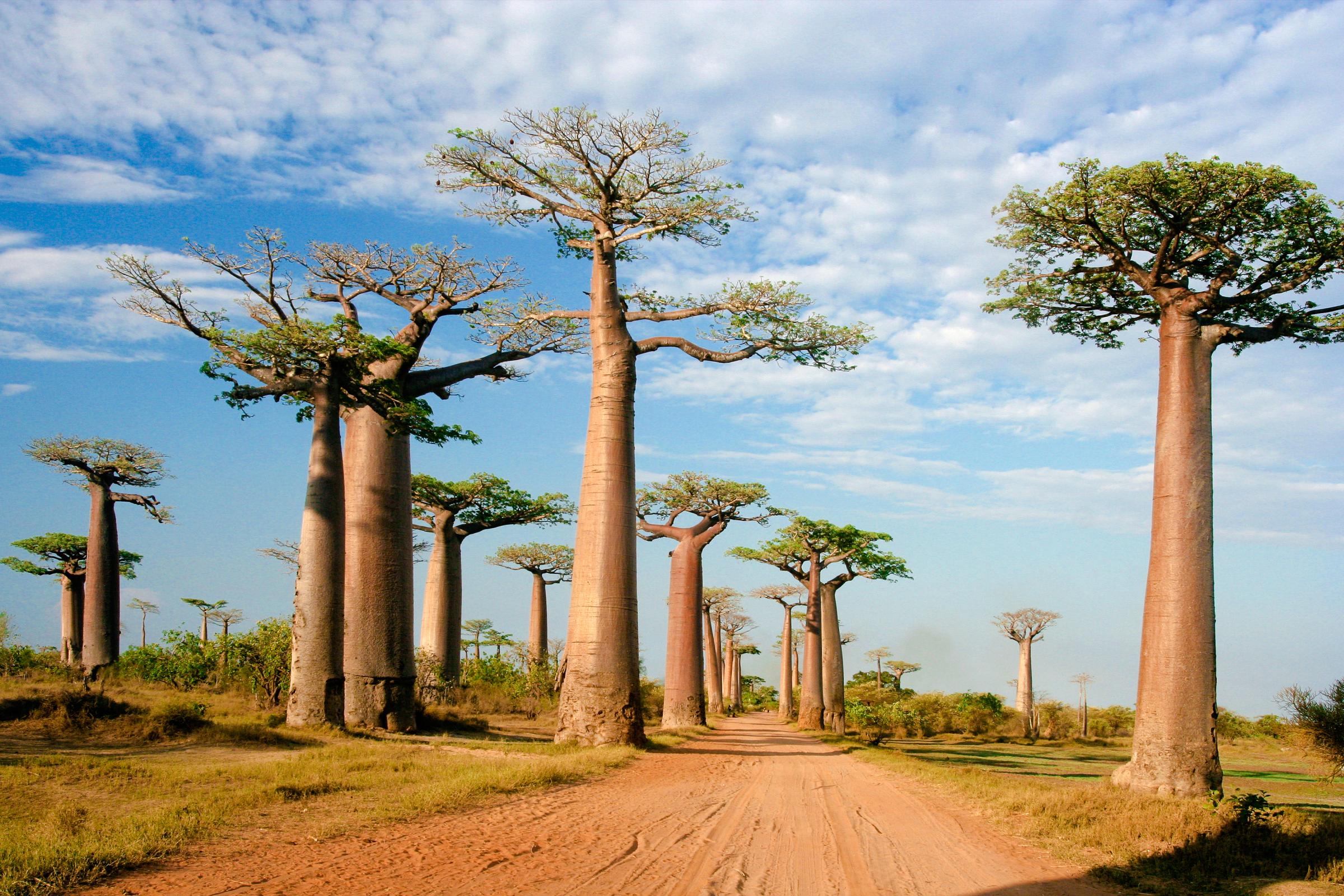
Madagascar is sometimes overlooked as just another safari destination. But this massive island is home to thousands of species that are found nowhere else on earth—more than 90 percent of Madagascar’s flora and fauna are endemic—and with the threat of climate change and deforestation looming ever larger, this is one trip that shouldn’t be delayed. Reinstated Airlink flights from Johannesburg to Nosy Be have expanded access to the northern stretches of the country just in time for the April 2017 opening of Miavana, Madagascar’s most well-appointed property yet. Situated on the island of Nosy Anko, the eco-friendly resort includes 14 villas designed by Silvio Rech and Lesley Carstens, the architects behind similarly luxe African retreats like Chinzombo and Angama Mara. Between seaside pursuits, guests are whisked by helicopter to Ankarana National Park for lemur-spotting or Amber Mountain National Park to explore its waterfalls and crater lakes. —Jane Broughton
Málaga, Spain
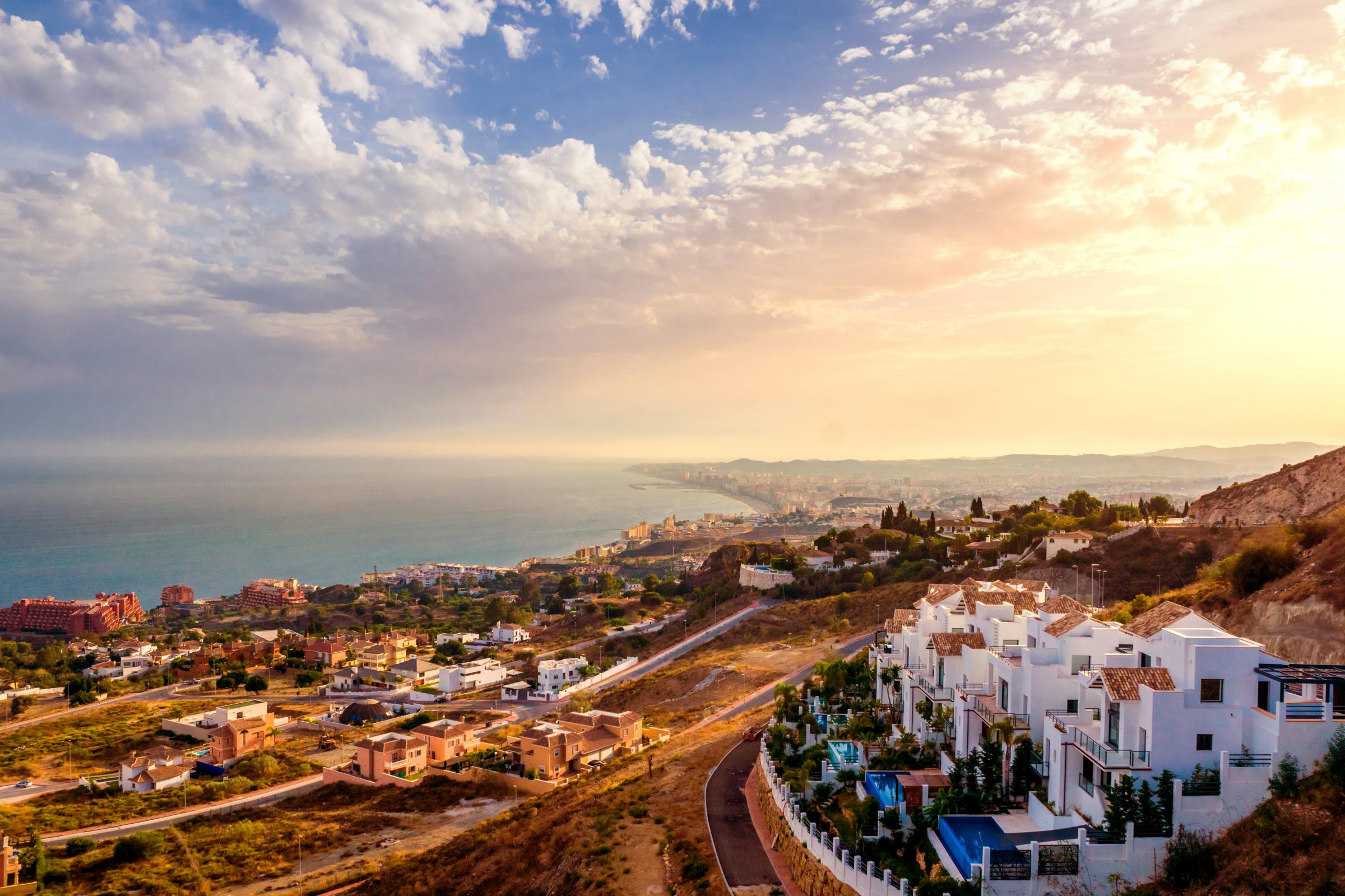
Málaga, in Spain’s Andalusia region, is now a veritable museum-goer’s paradise. The first wave included a Picasso museum (the artist was born here) and the sprawling 8,000-square-foot CAC (Centro de Arte Contemporáneo), which has hosted exhibits by Ai Weiwei and Marcel Dzama. Since then, the Carmen Thyssen, an outpost of Madrid’s Thyssen-Bornemisza Museum that houses the famous baroness’s extensive private collection, has opened; so has a five-year pop-up of Paris’s Centre Pompidou displaying works by Magritte, Chagall, and Kahlo. The Pompidou’s location along Málaga’s renovated waterfront is marked by a hypermodern, rainbow-hued glass cube. And in the industrial space of a former tobacco factory is a sister site of the Russian Museum in St. Petersburg. Archaeology buffs can comb the extensive collection at the Aduana Palace (it houses both a fine arts and archaeological museum) or head to the Antequera Dolmens (a prehistoric burial site that earned its UNESCO World Heritage nod in 2016). Unwind afterward at the lavishly appointed Gran Hotel Miramar; it opened at the end of 2016 in a historic 1926 Art Nouveau building across from Málaga’s most timeless attraction: Malagueta Beach. —Fiorella Valdesolo
Montevideo, Uruguay
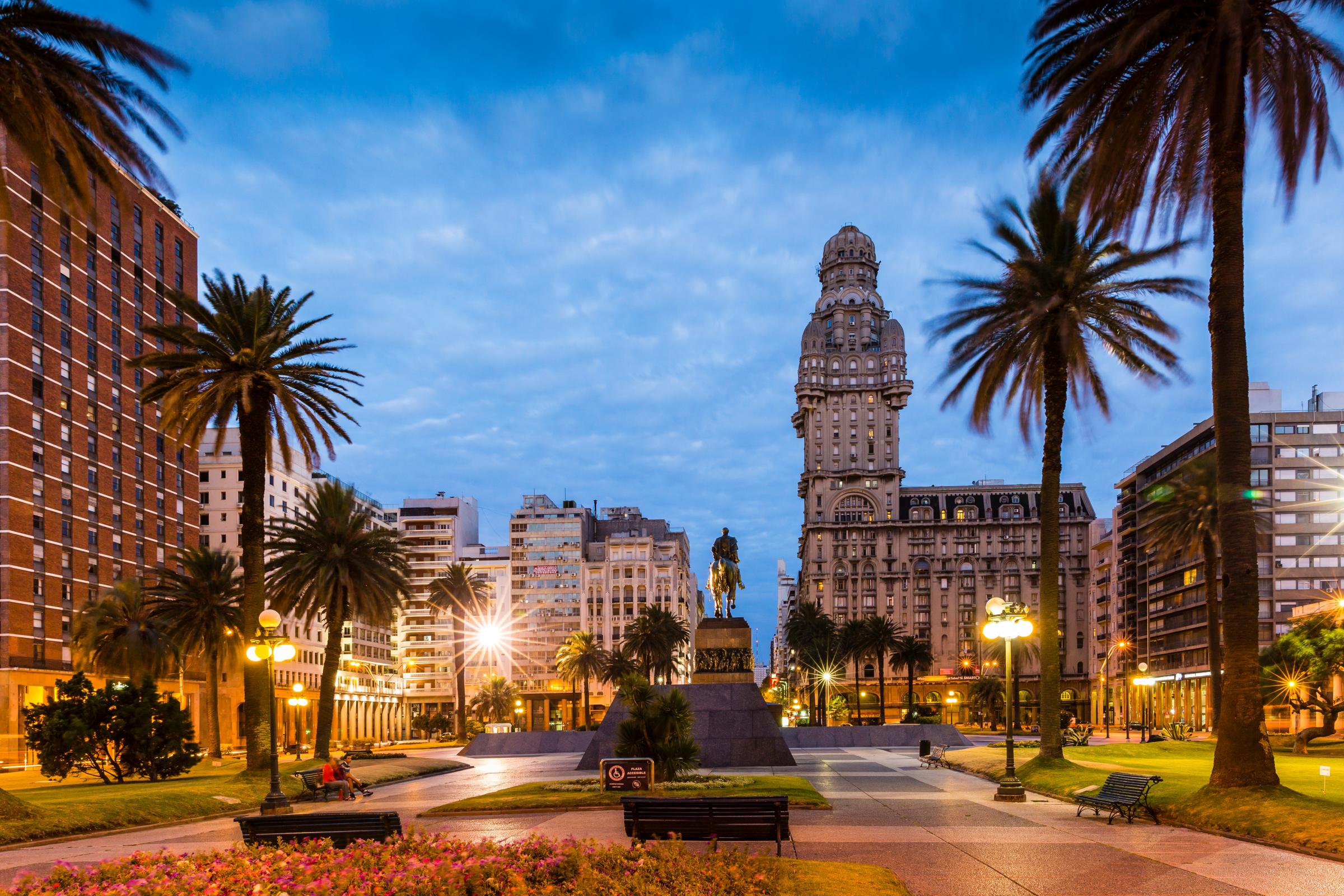
Montevideo, the quiet capital of Uruguay, is making a name for itself in design, fashion, and food. The new Rotunda Estudio—a sleek three-story boutique, design studio, and workshop in residential Punta Carretas—sells capsule collections by emerging local talents alongside its flagship line of minimalist women’s wear. Nearby, Telma stocks sophisticated, loose-fitting dresses, shirts, and shoes, plus prints by illustrator Valeria Rienzi from Good Objects. The city’s gourmands are flocking to supper clubs like Mesabrava, where guest chefs prepare multicourse communal dinners in antiques auction houses and shuttered factories. One of the rising stars of the local culinary scene is Lucía Soria, whose casual spot Jacinto in the historic quarter is all about perfectly cooked market ingredients. And Uruguay’s famously high-quality meats are the focus at Plantado Restaurant, inside the gorgeously decorated Hyatt Centric Montevideo—which also happens to be the city’s best new place to stay. —Paola Singer
Montreal, Quebec
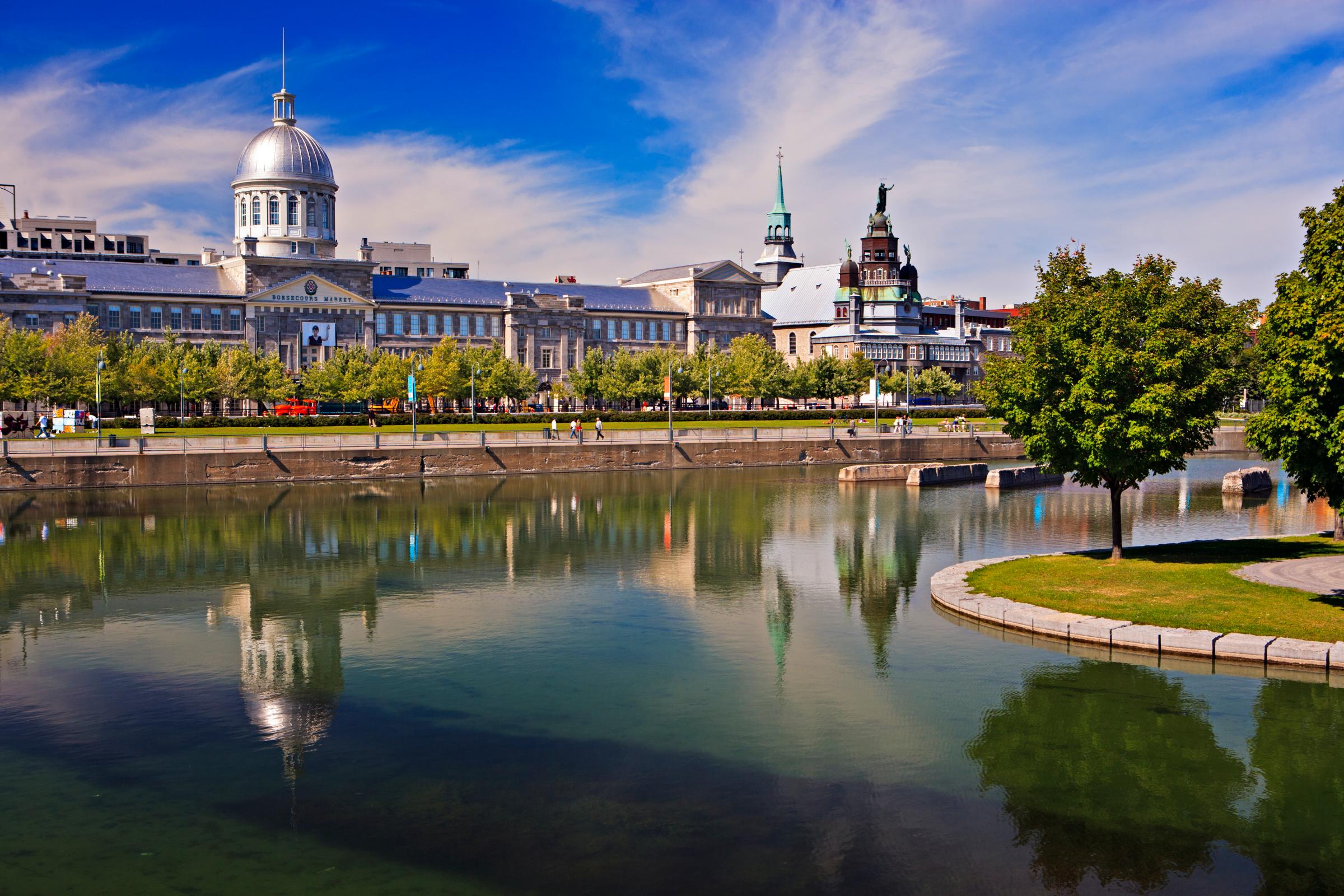
In January, the Canadian city kicks off a year of events in honor of its 375th birthday. Look for art pop-ups, symphony performances, and the unveiling of the Promenade Fleuve-Montagne, an urban boardwalk that will connect Mont-Royal to the St. Lawrence River. And plan on returning a few pounds heavier. Montreal’s phenomenal culinary scene—influenced by its French-British background and multiethnic population—is drawing interest from foodies far beyond Canada’s borders. Don’t miss local favorites like Foxy and Candide, which prove that sophisticated doesn’t have to mean stiff, and the hotly anticipated Marconi, from chef Mehdi Brunet-Benkritly, who recently moved back to his native Montreal after a five-year stint in New York City. —Mary Holland
Nashville, Tennessee
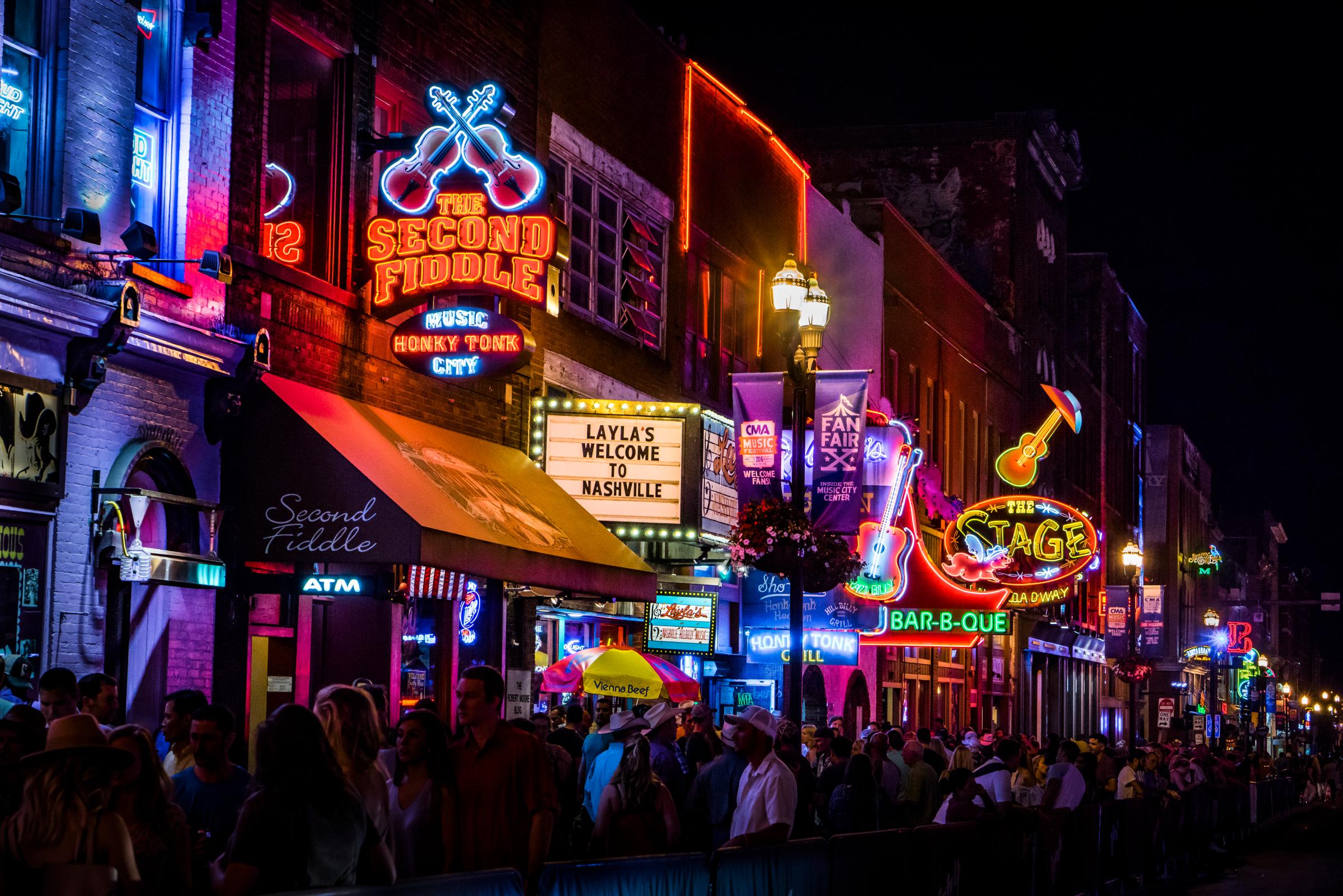
This gateway to the South has hit its stride, and 2017 looks to be a banner year. The iconic Ryman Auditorium celebrates its 125th anniversary with a full calendar of fêtes, while the Country Music Hall of Fame & Museum celebrates 50 years and the Bluebird Café turns 35. The city is brimming with new and upcoming eateries: Maneet Chauhan’s The Mockingbird, John Besh’s Marsh House, and Henrietta Red from Per Se–trained chef Julia Sullivan. And there are plenty of places to stay, thanks to a hotel boom—the Westin and Thompson recently debuted, with a Kimpton and 21c slated to open this year. —Kristin Luna
Nicaragua
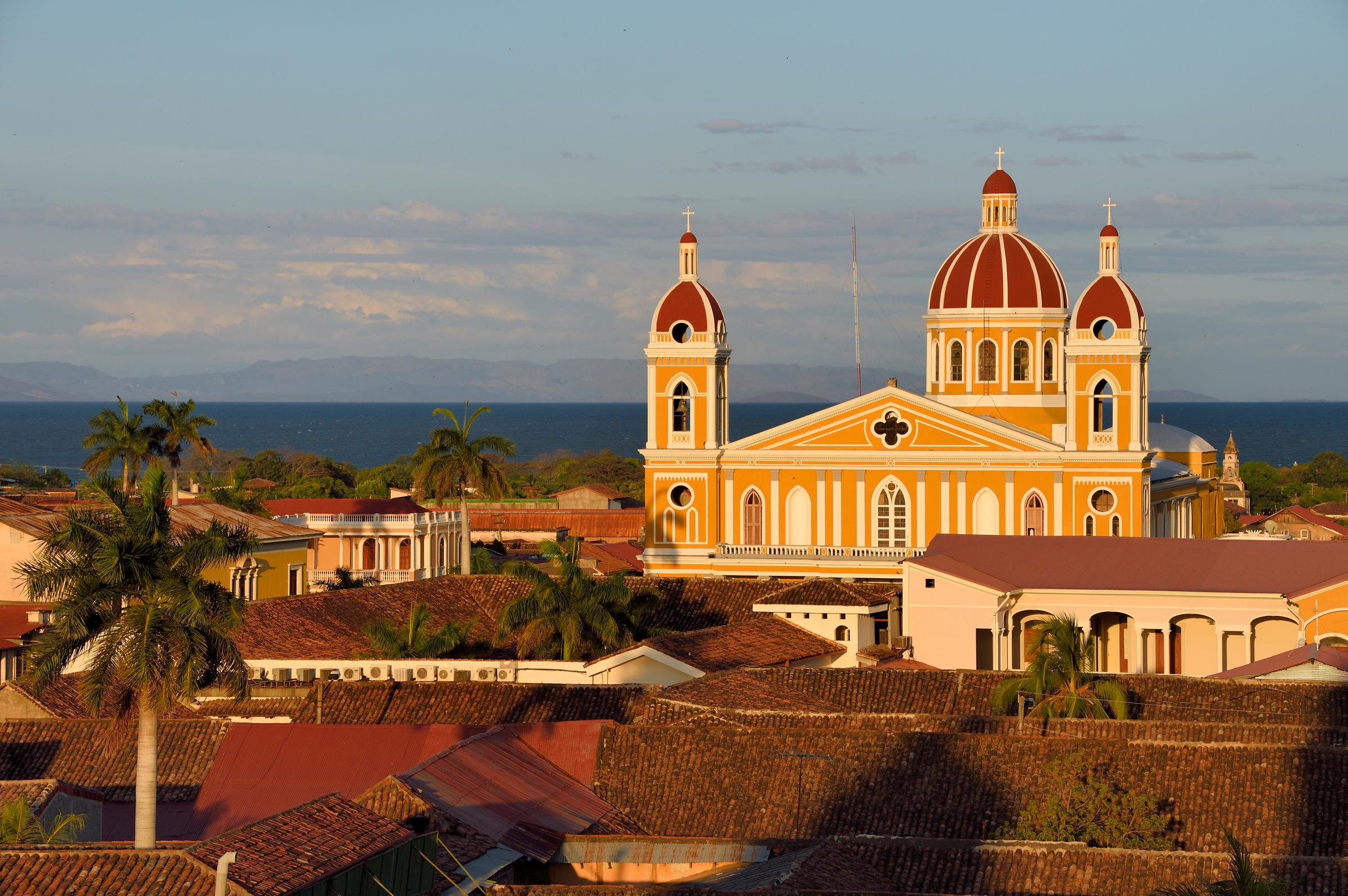
A wave of incredible new properties is bringing renewed attention to Central America’s largest country, which visitors flock to for rain-forest tours and snorkeling around surrounding islands. Fifteen miles south of Granada is the recently opened Nekupe Sporting Resort & Retreat. Nekupe, a native word used to describe heaven, is an intimate eight-villa resort spread across 1,300 acres on the mountainside. Floor-to-ceiling windows offer uninterrupted views of Mombacho, but the best way to experience the cloud-forest-covered volcano is hiking, mountain biking, and horseback riding. Travelers seeking a beach escape should head to the new Meson Nadi hotel on the edge of Costa Esmeralda: a contemporary, Bauhaus-inspired, six-suite boutique with concrete tiles, handwoven hammam blankets, and gardens. —Melanie Lieberman
Noosa Heads, Australia
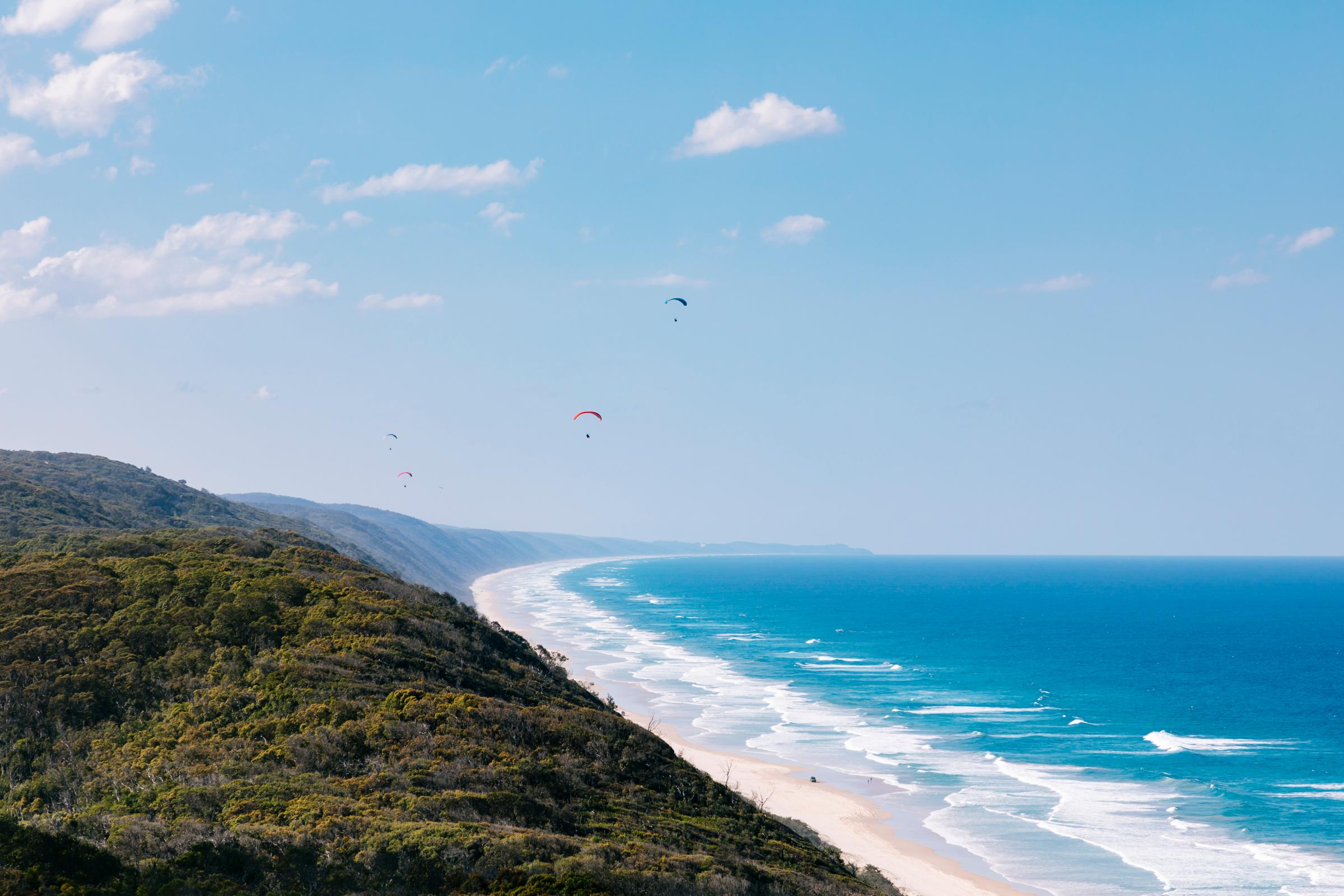
One of the unsung sirens of Australia’s eastern coast, Noosa Heads—less than two hours from Brisbane—is gaining attention for its upscale hotels and modern restaurant openings. The Sofitel Noosa Pacific Resort is the first five-star player to hit the beach here. It’s a short stroll from surfer heaven Main Beach and not far from Noosa National Park, which features cliff-hugging boardwalks through lush rain forest. Richard Branson’s Australian hideaway, Makepeace Island, is situated just up the Noosa River: the lavish, Balinese-inspired resort is usually an exclusive-use affair but lately has been opening up individual villa bookings during certain weeks. Restaurants in Noosa Heads skew Asian: the hottest table in town is Wasabi, a Japanese omakase concept where the dining room is suspended over the water, while the more casual Embassy XO, in the next town over, serves pan-Asian dishes like killer “son-in-law” eggs and jasmine-cured duck leg. But don’t miss the natural wonders here, either—head into the dreamy, ruggedly beautiful hinterland with Tropical Treks, an outfitter offering guided bushwalks, bird-watching, and wildlife experiences. —Emma Sloley
Norfolk, Virginia
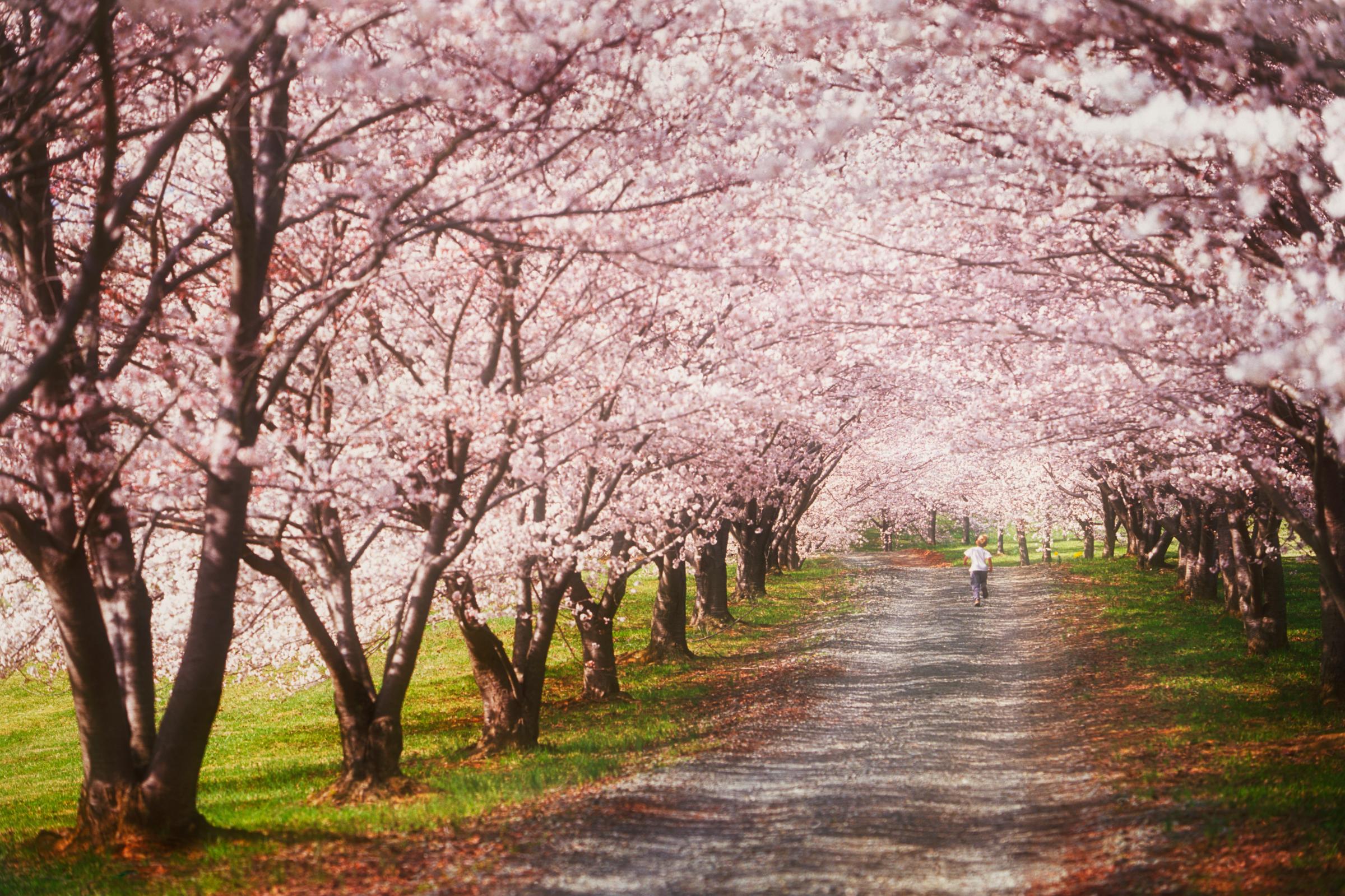
Once characterized mainly by the defense industry and a massive naval base, Norfolk has become an off-the-radar, affordable hot spot thanks to a flourishing arts scene and increasing city- and university-supported entrepreneurship. Its craft beer continues to be a huge attraction: Benchtop Brewing was one of the newest breweries to open in 2016; the upcoming Bearded Bird Brewing will operate as a microbrewery co-op and have a large patio where visitors can sample beers. A taproom from Starr Hill Brewery will be part of a newly developed Waterside District—an area that will see several restaurant openings (like regional favorite Cogan’s Pizza) in 2017. Nearby, The Main aims to become another downtown hub in the spring, with a seafood restaurant, rooftop lounge, 300-room Hilton, and other entertainment additions. And don’t miss the NEON District—the mural-studded home of the Chrysler Museum of Art—which has recently introduced an extra element of urban cool. —Christine Wei
Okavango Delta, Botswana
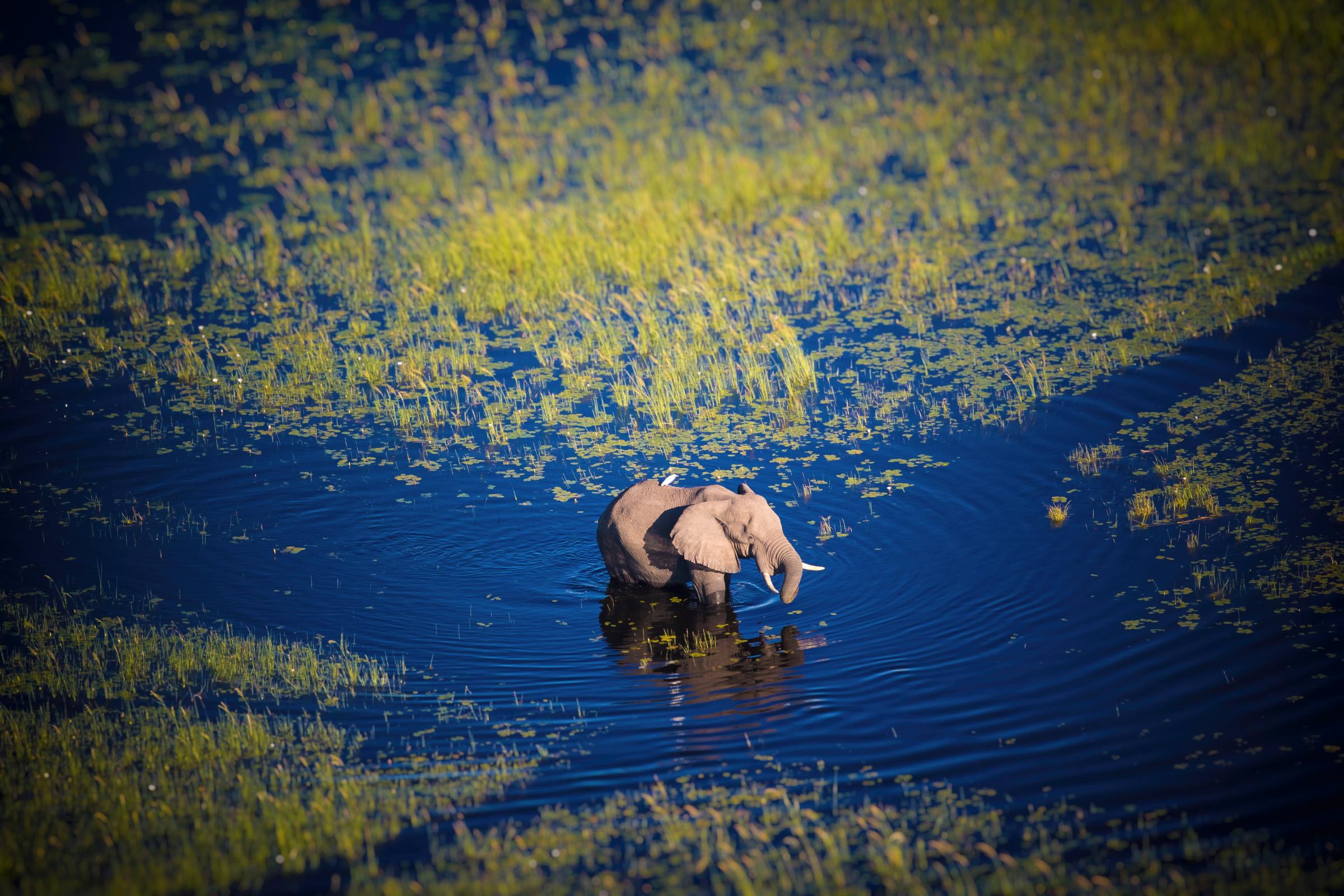
It’s now possible to spot the Big Five in Botswana, an idea that just a few years ago may have seemed far-fetched. Buoyed by the antipoaching efforts of the Botswana government and local conservation groups, the philanthropic arm of the (impeccably renovated) Sanctuary Chief’s Camp has helped reintroduce populations of both black and white rhinos to the Okavango Delta. The neighboring andBeyond Nxabega Okavango Tented Camp also got a thoughtful redesign of late, with understated, sustainable accommodations that echo the surrounding landscape. For lovers of wildlife and luxury, there’s never been a better time to visit. —Krista Simmons
Oslo, Norway
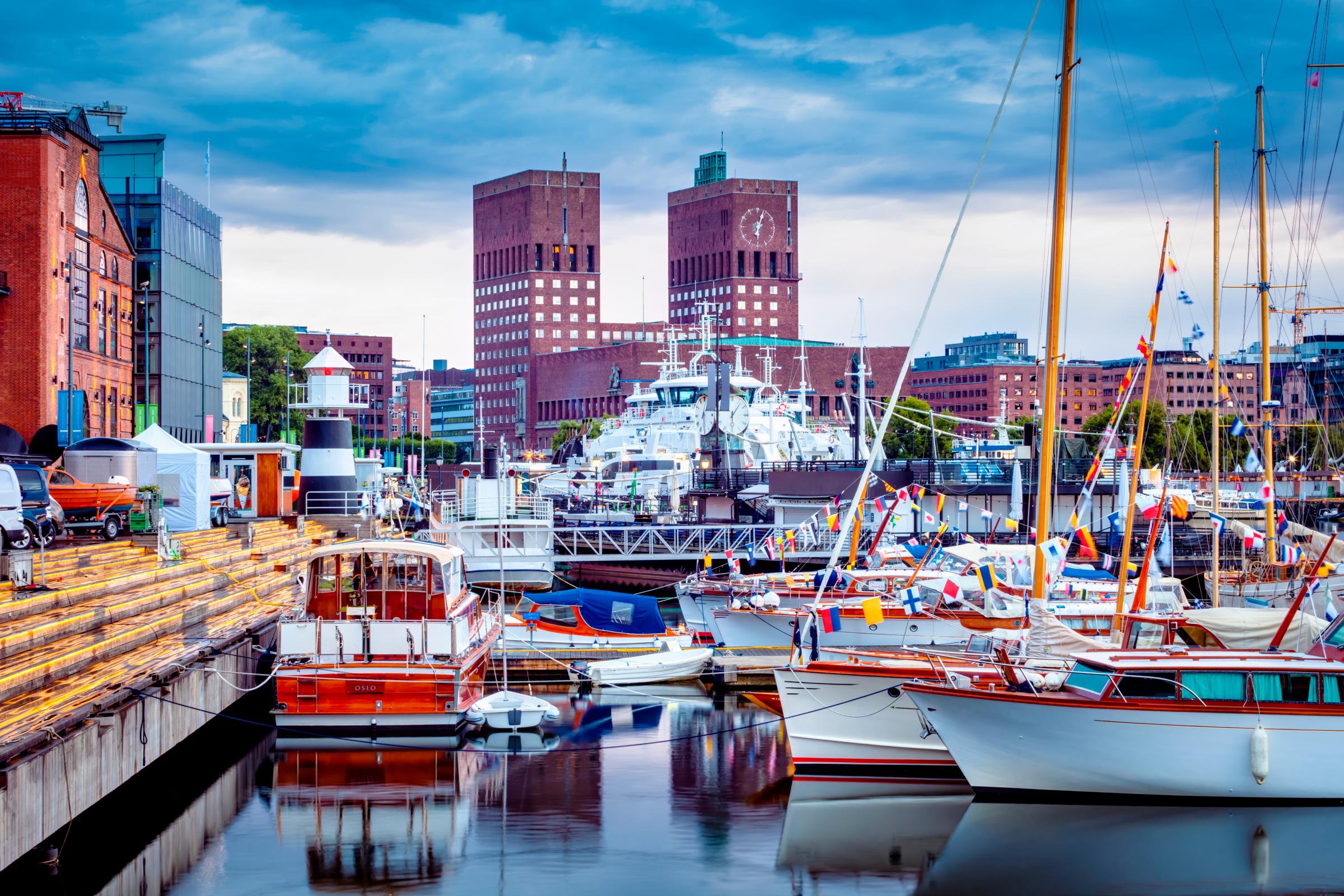
Once prohibitively expensive, the city’s still not cheap—but the dollar’s worth around 25 percent more today than it was two years ago. Some 28 million additional visitors will pass through Oslo’s airport in the next 12 months, thanks to its new swooping, Scandi-chic wing. Many of these travelers are here to participate in one of the world’s most thriving coffee cultures. Two great spots are in the Grünerløkka area: Supreme Roastworks, where a world-champion brewer helms the bar, and Tim Wendelboe, whose owner is so obsessed with quality beans that he bought 17 acres of Colombian farmland. After the buzz from your first few pour-overs wears off, explore another formerly gritty neighborhood, the warehouse-filled Vulkan, where Hendrix Ibsen sells the trendy triumvirate of single-origin coffee, vinyl, and craft beer. —Eimear Lynch
Panama City, Panama
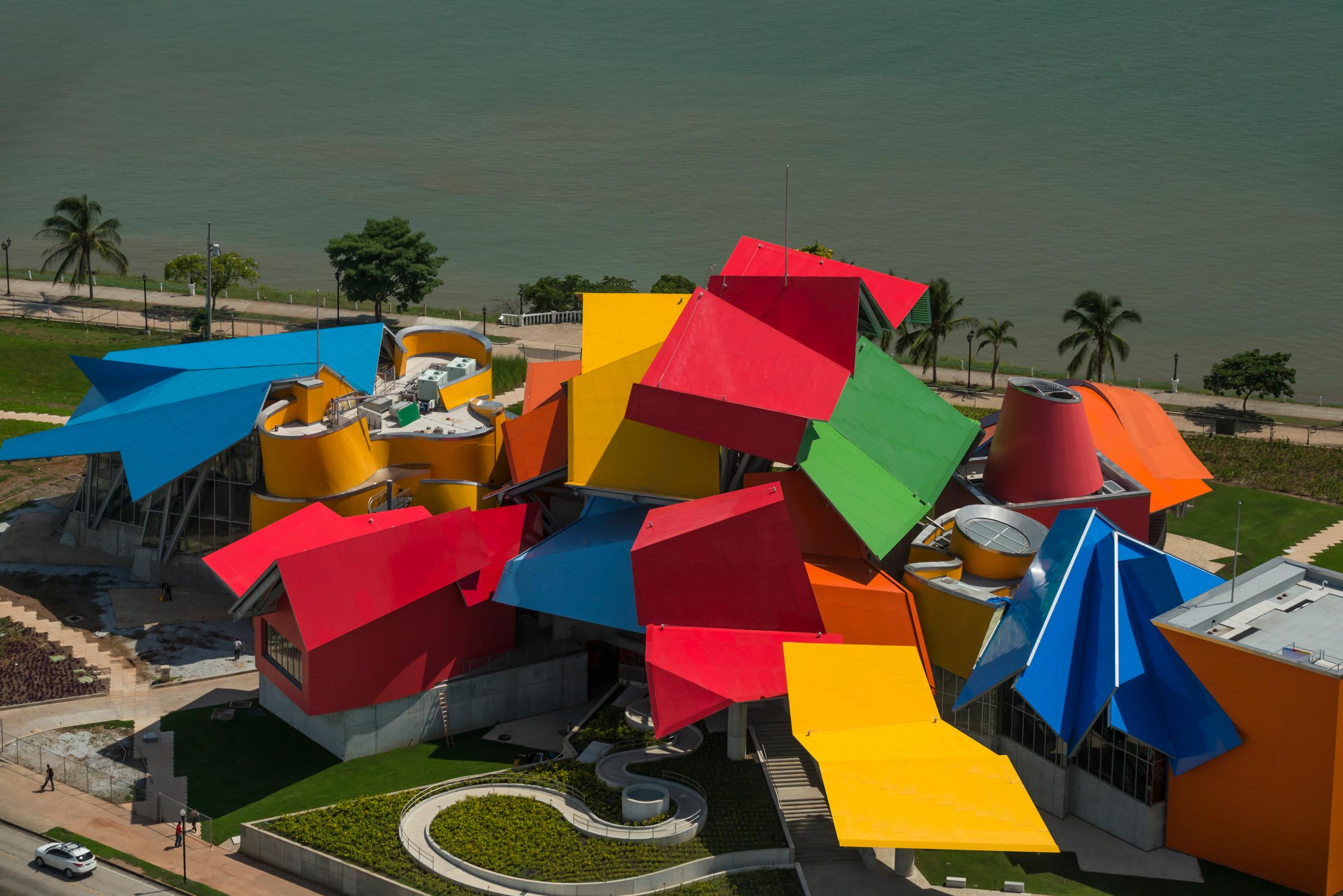
After nearly 10 years of construction, the Panama Canal expansion has opened. Giant cruise ships—like the Caribbean Princess—can now pass through via the 180-foot-wide locks. Princess is one of the first lines to take advantage of this, with six sailings in 2017. On land, a sleek W Hotel will open downtown, and a new boutique property, La Concordia—where rooms have private balconies and claw-foot bathtubs—is near completion in historic Casco Viejo. For an introduction to Panama City, book a tour with Black Tomato. They can arrange private helicopter rides or sailings around Gatun Lake. Best of all, Panama uses the U.S. dollar, making shopping easy. —Melanie Lieberman
Paros, Greece
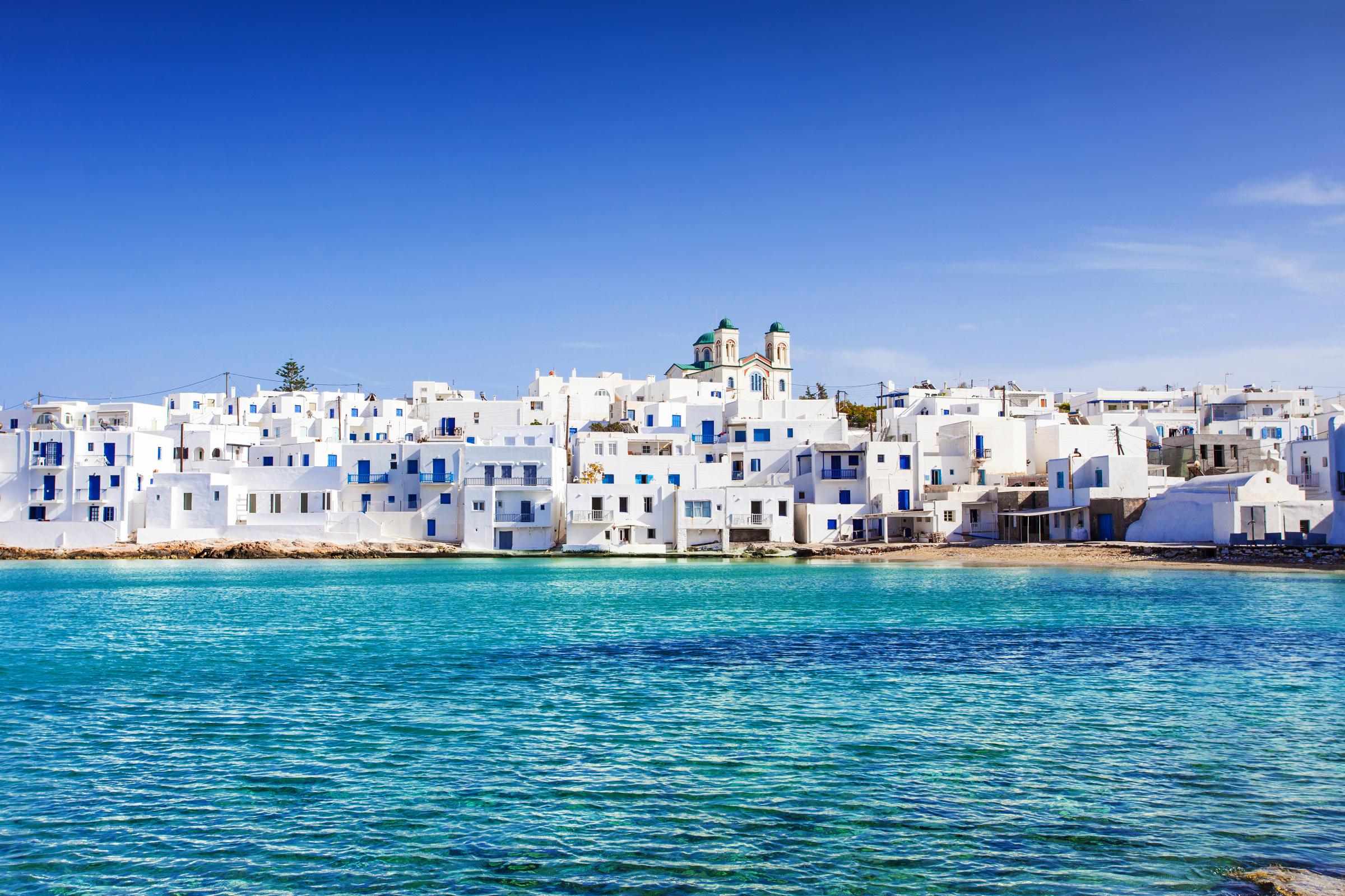
Kitesurfers have long made a playground of the breezy beaches of Paros, and no wonder: this sunshiny isle is a Cycladic triumvirate of sandy shoreline, history, and culture. Last summer the island debuted a new airport, opening it to larger aircraft and more vacationers. And the fishing village of Naousa, with its boxy white architecture and seaside tavernas, is increasingly sophisticated—check in to the modern, adults-only apartments of Porto Naousa or the elegant Seven Santa Maria, where six airy, all-white suites (and a separate villa) come with a private boat and skipper for exploring the island’s secret coves. —Emily Mathieson
Perth, Australia
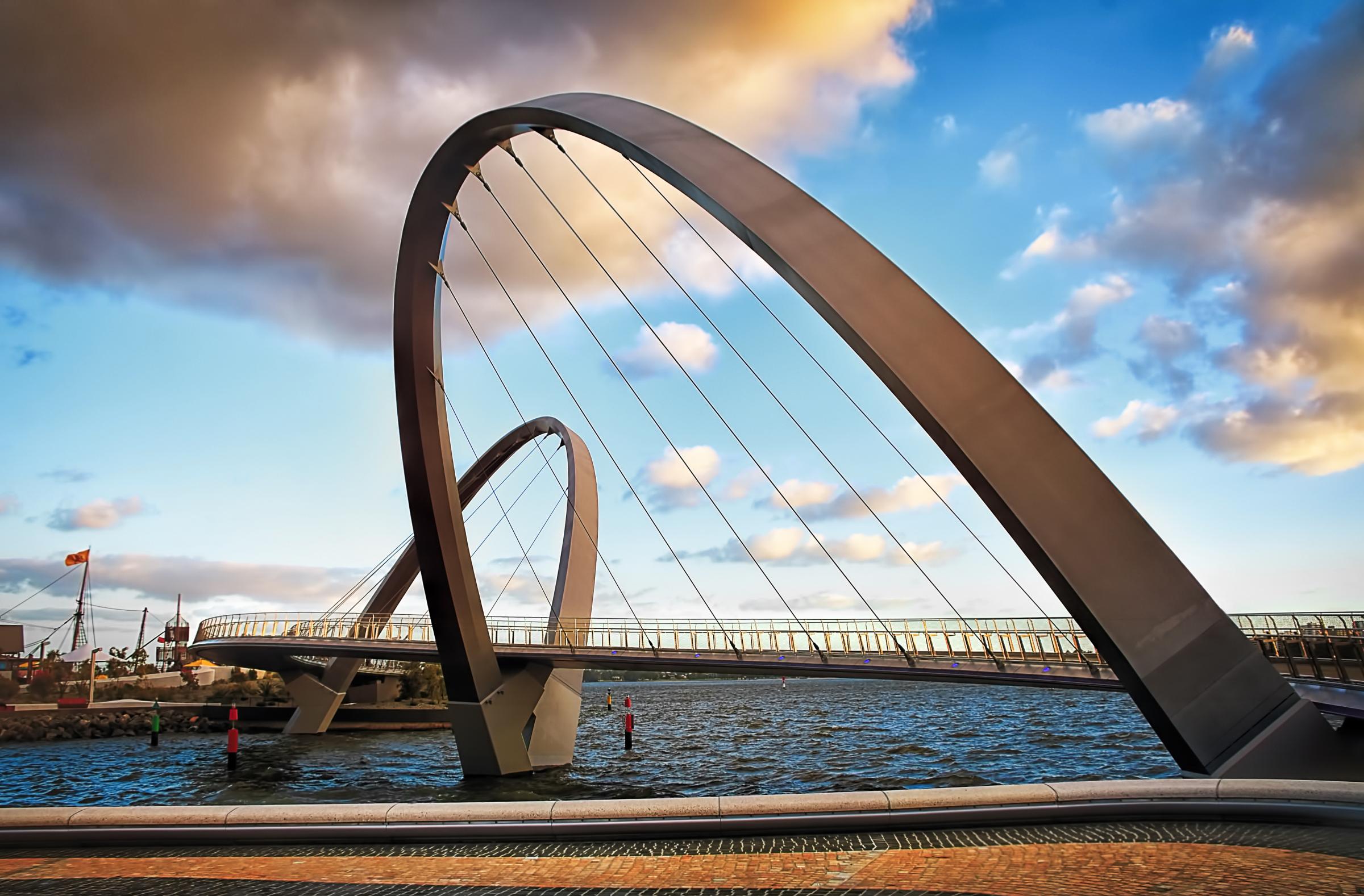
It’s one of the most remote cities on earth, but that hasn’t stopped the capital of Western Australia from becoming a dining hot spot. Take City Beach, where the new restaurants have the best ocean views in town. The latest is the beautifully designed Odyssea—its veranda is a favorite for seafood and sundowners. Elizabeth Quay is a contemporary urban precinct on the Swan River that combines public spaces and art. There, the Reveley has three levels of modern Australian dining, including a rooftop bar; and Isle of Voyage, in a restored historic kiosk, serves swank café fare like crab tagliatelle paired with local wines. The chicest cocktail bar in town is the Waiting Room, in the lobby of Crown Towers, the city’s new ultra-luxe, 513-room hotel. Design firm Bates Smart has taken inspiration from the glamour of Manhattan and Palm Springs, with lush jewel tones, a marble bar, and a sprawling terrace with vistas of the river and city skyline. —Carrie Hutchinson
Philadelphia, Pennsylvania
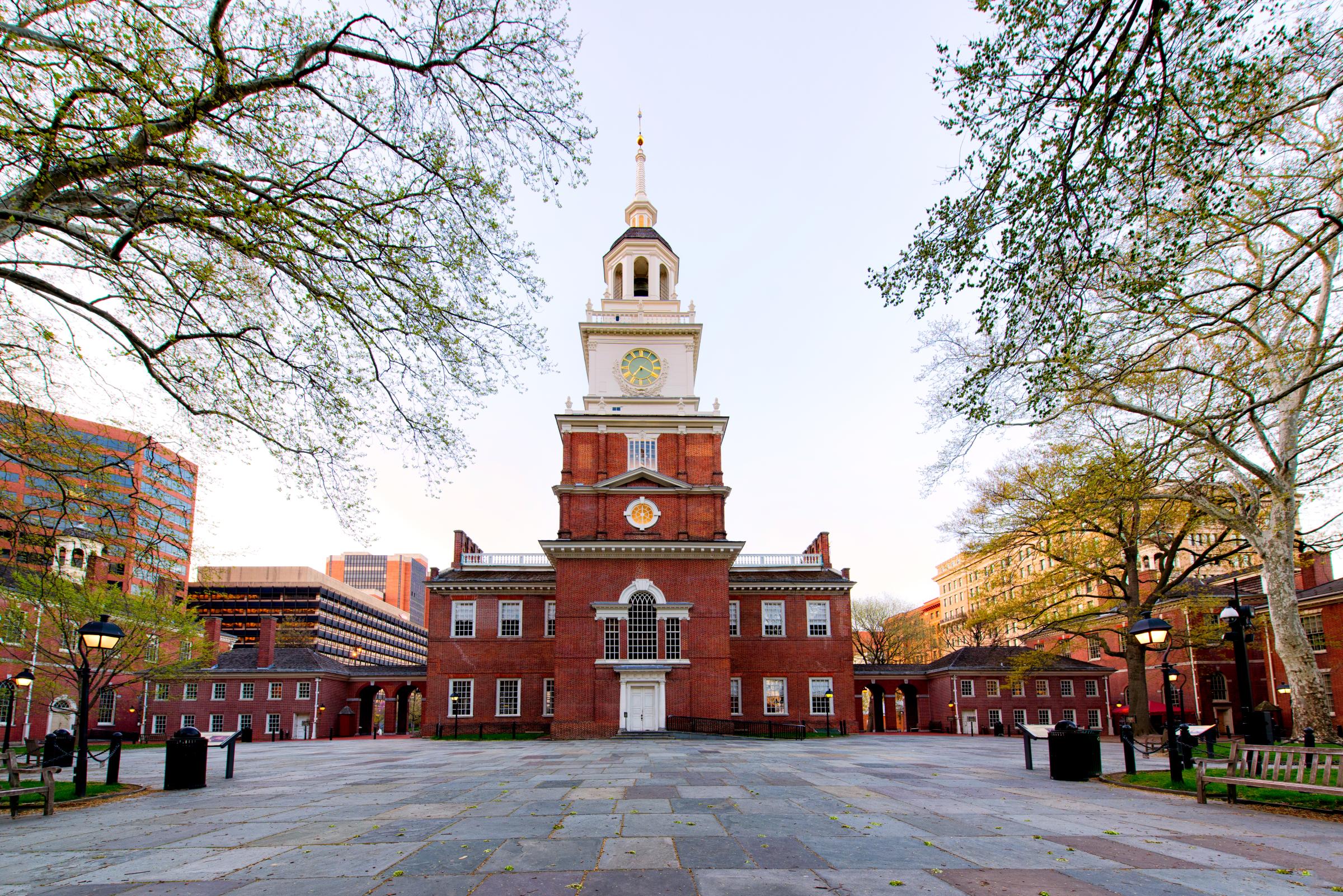
Philly is coming off a high-profile couple of years, between hosting Pope Francis and the DNC and being the first U.S. city inducted into the Organization of World Heritage Cities. Bathed in that ego-boosting afterglow, America’s birthplace is adding hotel options from brands like Four Seasons, W, SLS, and Study, and debuting its new Museum of the American Revolution this spring. The young population here is growing at a faster rate than any other major city, and tidy residential neighborhoods like East Passyunk are being diversified. Here, the old guard sipping homemade limoncello at the Sicilian social club shares sidewalk seating with the double-IPA enthusiasts at the craft-beer boutique next door, while across the street, two young female sommeliers have put together thrilling lists of skin-fermented Malvasia, Breton cider, and quirky Canary Island reds at hot spots Townsend and ITV. Around the corner, the succulent slow-cooked lamb tacos at South Philly Barbacoa come with a side of social justice: owners Cristina Martinez and Ben Miller are staunch activists for undocumented workers’ rights (Martinez is open about her own undocumented status). And the new mayor is on their side as well—he’s fighting to protect Philly as a sanctuary city. —Adam Erace
Pisco Province, Peru
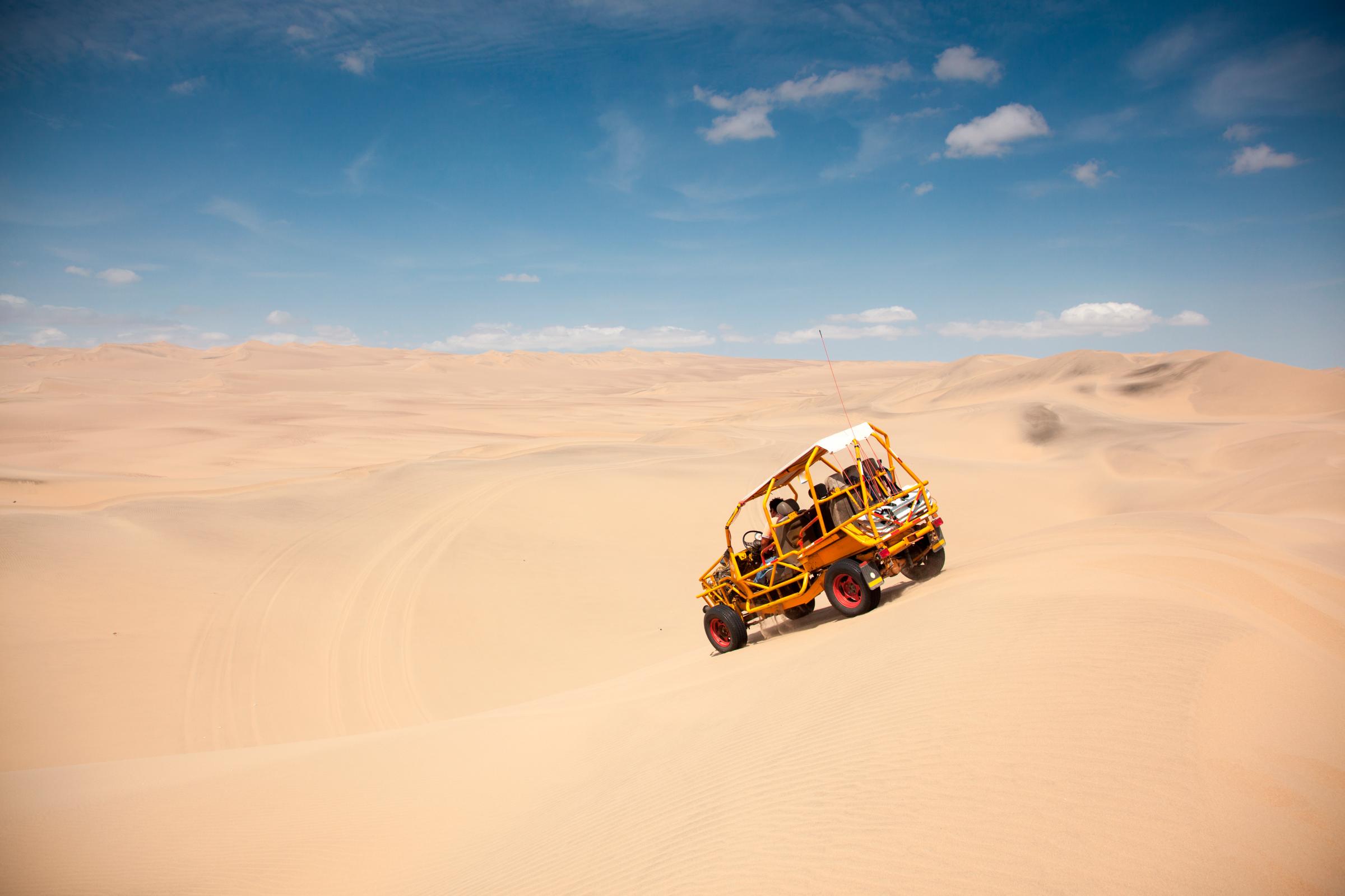
A new airport in the port town of Pisco is making access to coastal Peru’s top attractions easier than ever. It’s shortened the journey to the Nazca Lines, the 2,000-year-old geoglyphs that are best spotted from a plane, as well as the Paracas National Reserve, a protected swath of desert and marine habitat where visitors can see colonies of sea lions and the occasional group of Humboldt penguins. The lush oasis of Huacachina, in the neighboring Ica province, is a popular day trip for high-speed buggy rides over the surrounding sand dunes. Pisco’s namesake brandy is on tap in the region’s tasting rooms—including one at the oldest distillery in the Americas—and vineyard hotels. —Nicholas Gill
Provence, France
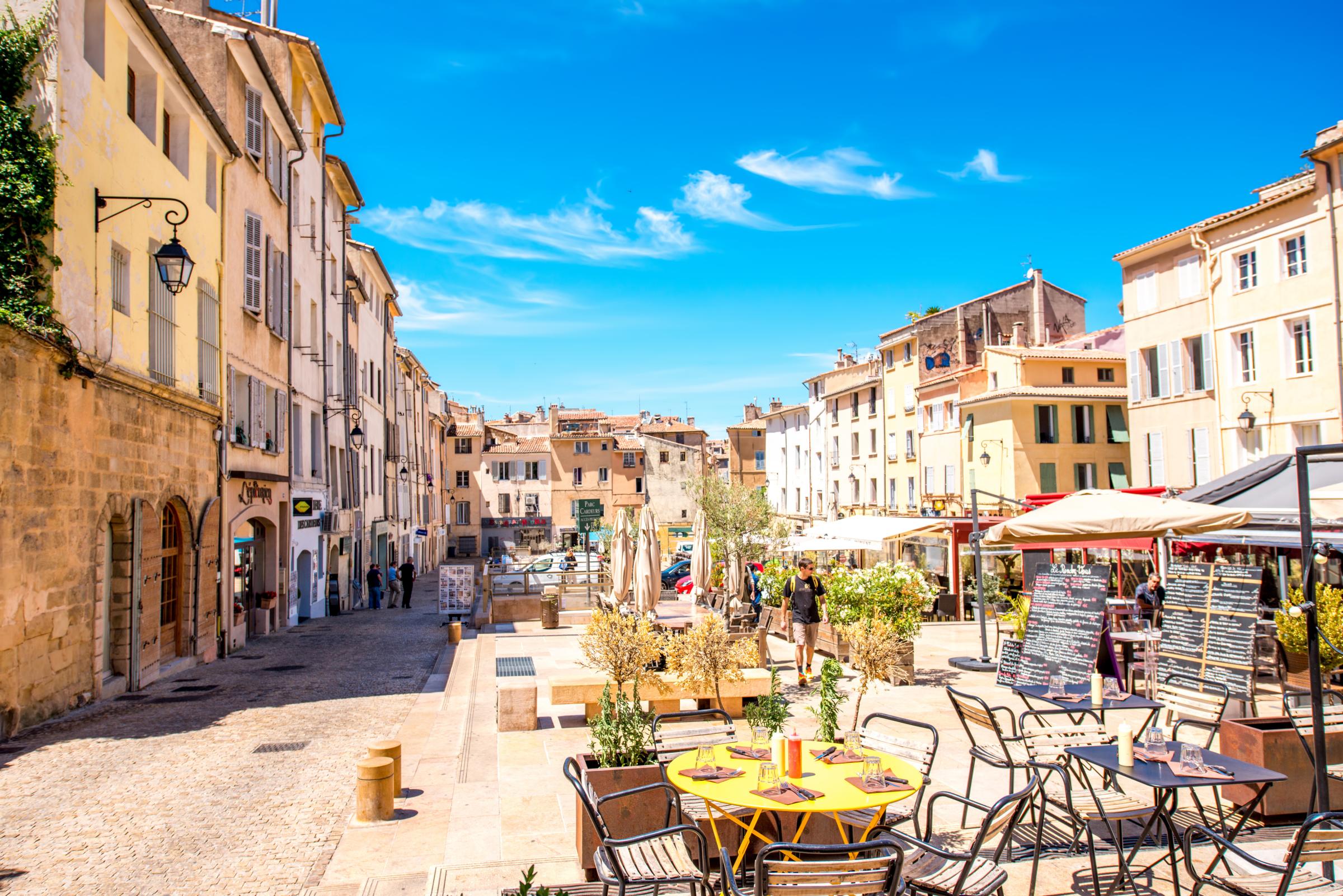
Wineries and hilltop bastides have always lured travelers to Provence, but a recent wave of modish auberges has turned the destination downright stylish. Take the Domaine de Fontenille, a refurbished 17th-century Luberon estate that now includes a 17-room inn and a contemporary art gallery. In St.-Rémy-de-Provence, a landmark mansion has been transformed into the Hôtel de Tourrel, a sleek seven-room inn dotted with Eileen Gray designs and crowned with a rooftop pool terrace. And just outside Aix-en-Provence, the 28 villas at the contemporary Villa La Coste are encircled by vineyards that supply the estate’s organic winery. Its sculpture park contains works by boldface architects and artists such as Louise Bourgeois, whose mammoth Crouching Spider guards the Provençal landscape like a Modernist scarecrow. —Raphael Kadushin
Queenstown, New Zealand
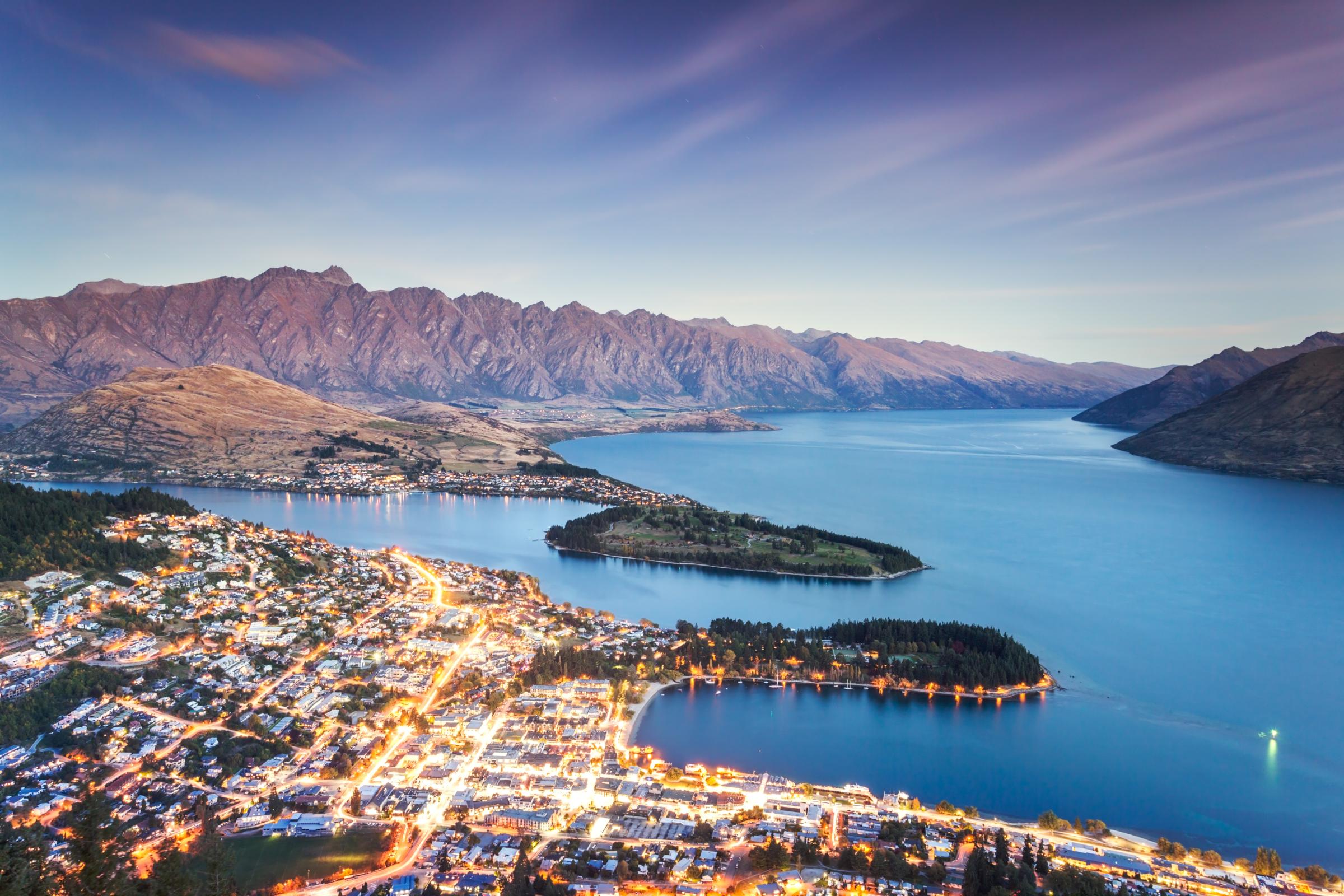
There are two new places to stay in New Zealand’s adventure capital (ski season starts in mid-June, but there’s bungee jumping and jet boating year-round). Bed down at the boutique Hulbert House, with six suites in an 1888 Victorian villa, or the 69-room QT Queenstown, which is slated to land on the shores of Lake Wakatipu this year. And those who have previously traveled here for adrenaline rushes have a new treat in store: the Nevis Thriller, coming early in 2017. Details are sparse, but its creator, the AJ Hackett company, says it will combine “speed, height, and flight.” —Carrie Hutchinson
Rotterdam, Netherlands
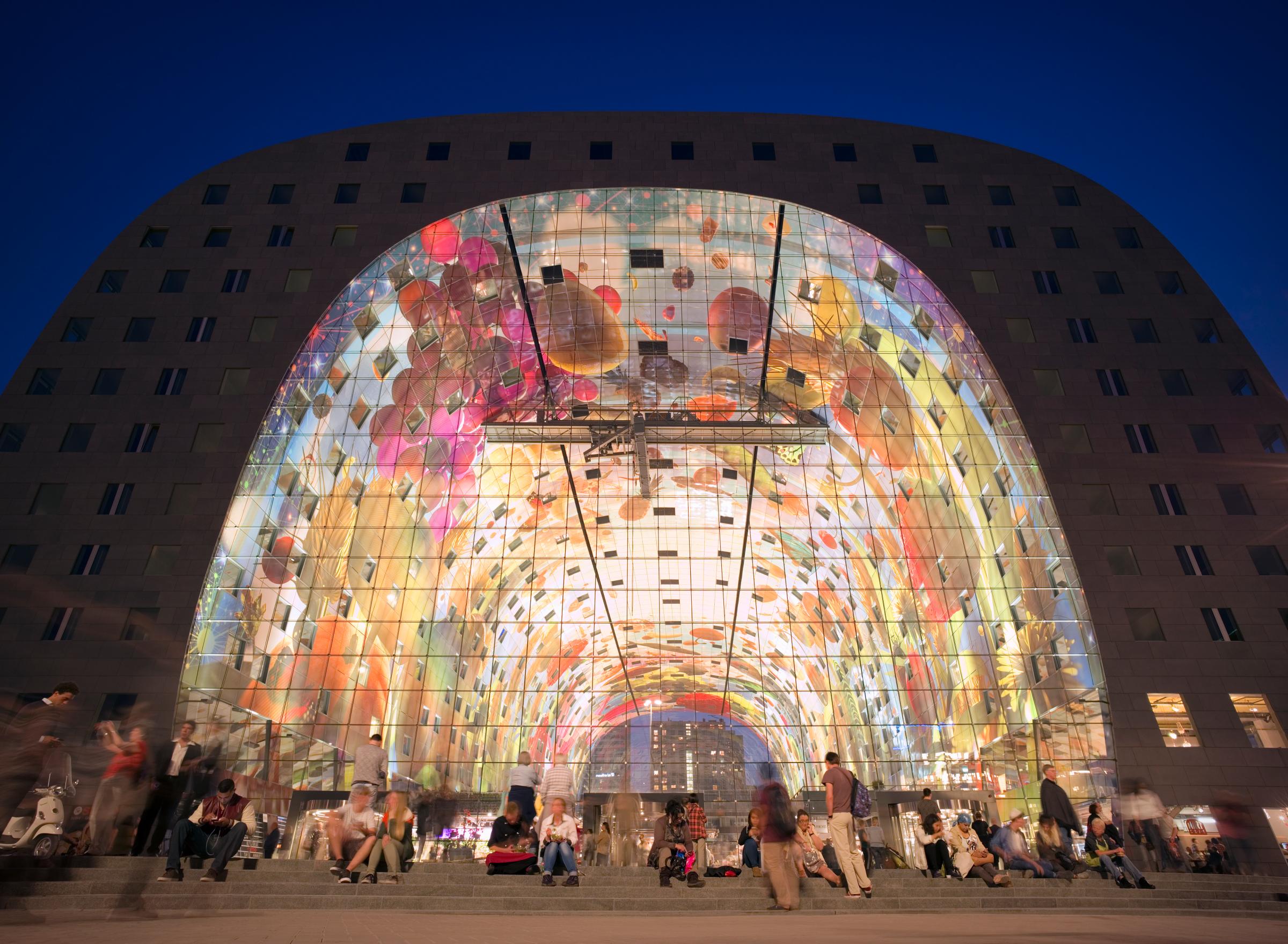
After years in Amsterdam’s shadow, the second-largest city in the Netherlands is stepping into the spotlight thanks to its burgeoning culinary and design scenes. Eye-popping architectural stunners such as the Modernist De Rotterdam have been joined by De Markthal, a mural-covered hall where 96 vendors hawk gourmet goods. You’ll find more locavore eats at Fenix Food Factory and Roffa Streetfoodbar, a smokehouse where virtually everything is locally sourced. Art is everywhere in this city—more than a thousand pieces, including sculptures by Picasso and Rodin, are scattered throughout Rotterdam. Be on the lookout for one of the newest pieces, Bobbing Forest, a surrealist installation of floating elm trees by art collective Mothership. The innovative, fun-loving spirit of the city is best embodied by its upcoming attraction, RiF010, an artificial wave park where surfers will be able to show off their skills in the Steigersgracht Canal. —Diana Hubbell
Rwanda
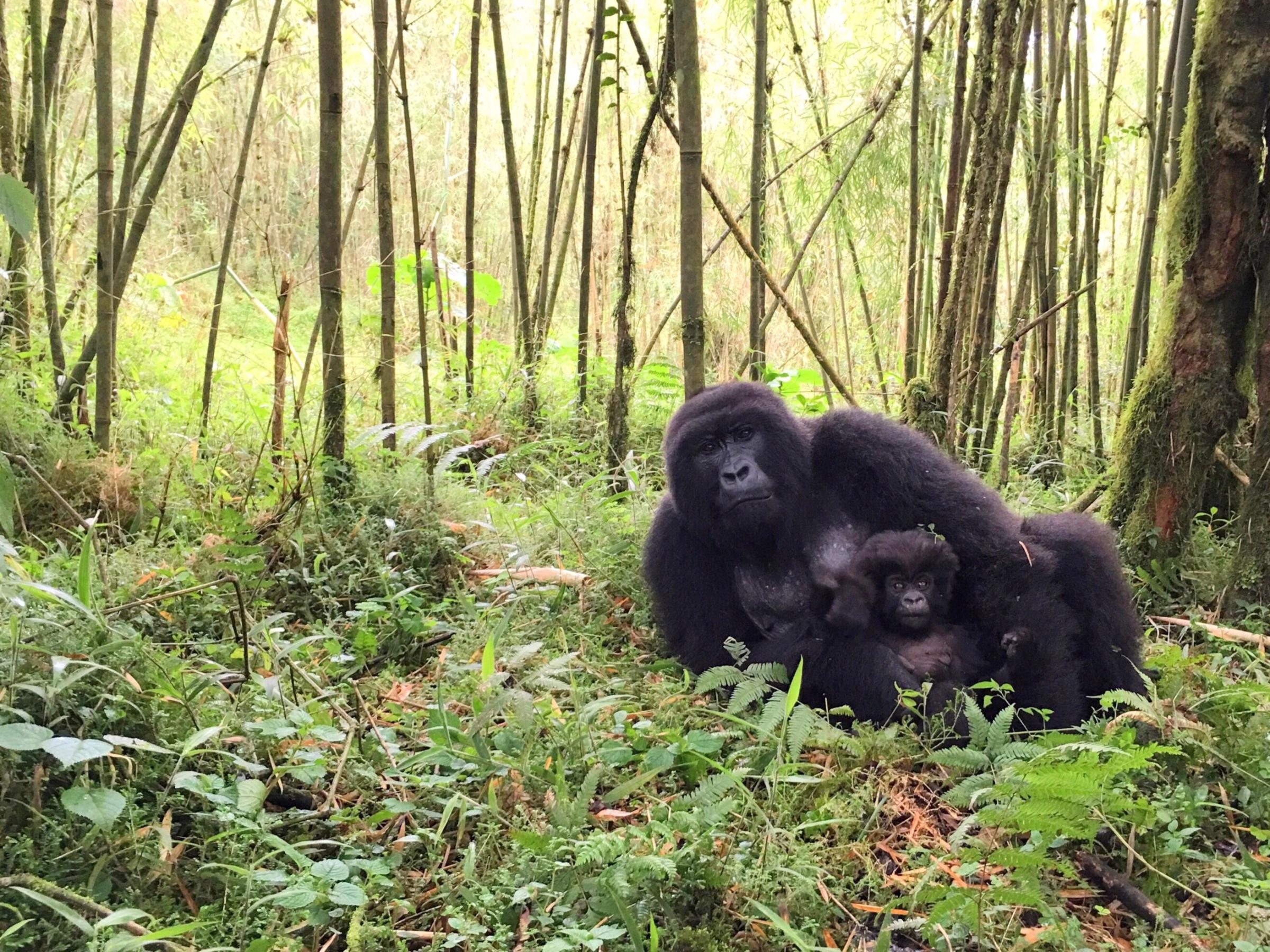
Of the 800 or so mountain gorillas left in East Africa, more than half live in the forested foothills of the Virungas, a chain of 12,000-foot volcanoes stretching through Rwanda, Uganda, and Congo. Rwanda is by far the safest and most reliable (in terms of infrastructure) of the three, and this summer it will become even more enticing when Wilderness Safaris’ first Rwandan property, the upscale, six-villa Bisate Lodge, opens near Volcanoes National Park. With dramatic views of the forested volcanic peaks, this new base—close to park headquarters, the departure point for daily treks—exists to fund conservation projects, including a reforestation program. In addition to spotting silverbacks, guests can see Buhondo and Burera lakes, the lava tunnels of the Musanze Caves, and the golden monkeys that are endemic to the region. —Jane Broughton
Salta, Argentina
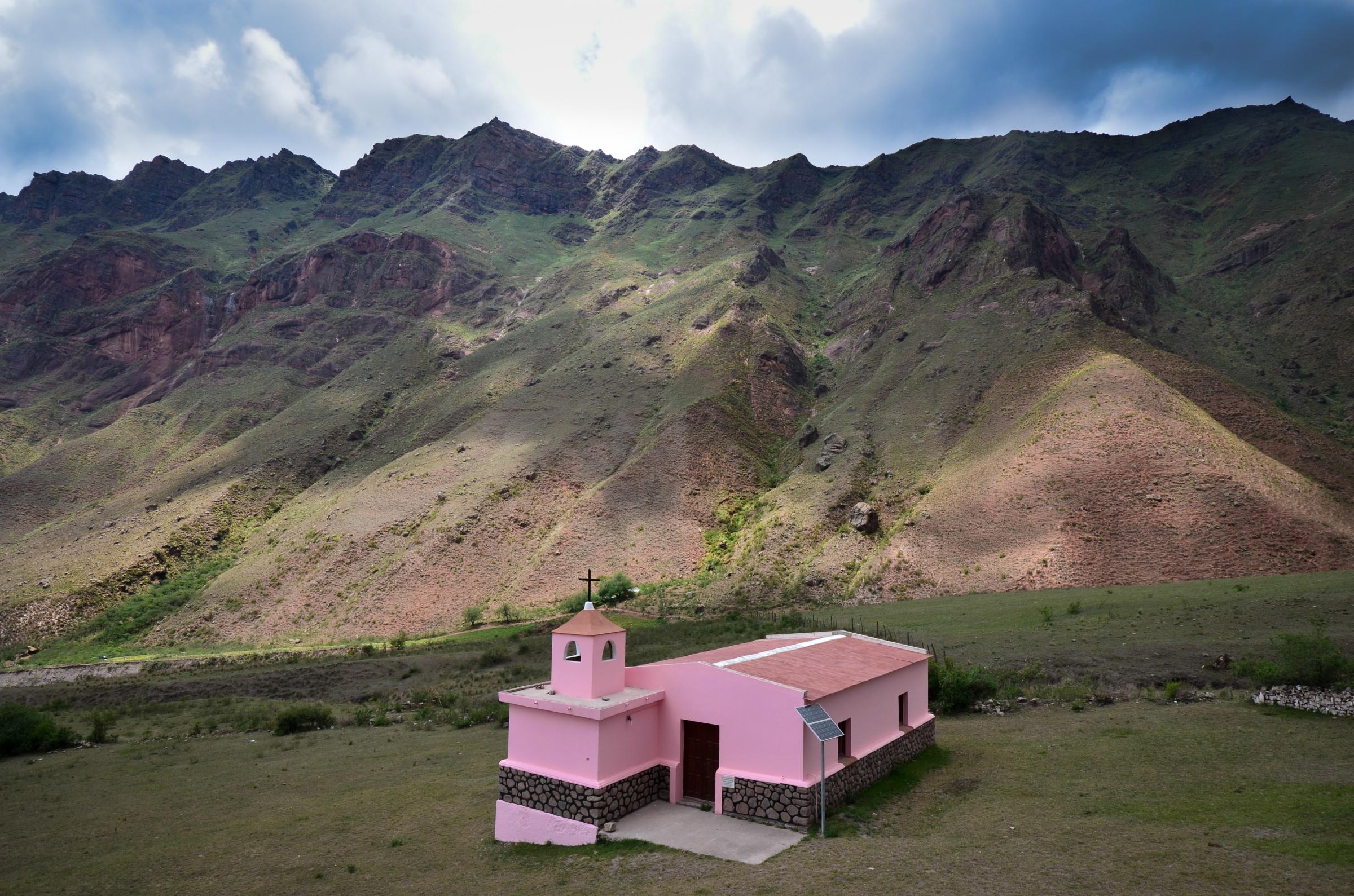
More travelers are starting to take notice of Salta, a province in northwestern Argentina known for its diverse topography, from jungles and volcanoes to vineyards and salt flats. LATAM Airlines has added service between Salta and Lima, Peru, a testament to the region’s growing popularity. The best months to visit are September through November or May through July—travel outfitter Auténtica Salta recommends going to wine country to sip a glass of Torrontés (the area’s emblematic grape) at Piattelli Vineyards’ Cafayate winery and staying at the latest luxury hotel, Grace Cafayate. Other operators are increasing their offerings, too: Wanderlust Expediciones recently launched a textile tour that visits artisans keeping the ancient custom of weaving alive, while Jacada Travel’s 4 x 4 trips to Tolar Grande will include a stay at at Antofallita Oasis, two new guesthouses in Puna owned by locals from the Andean community. —Nora Walsh
Santo Domingo, Dominican Republic
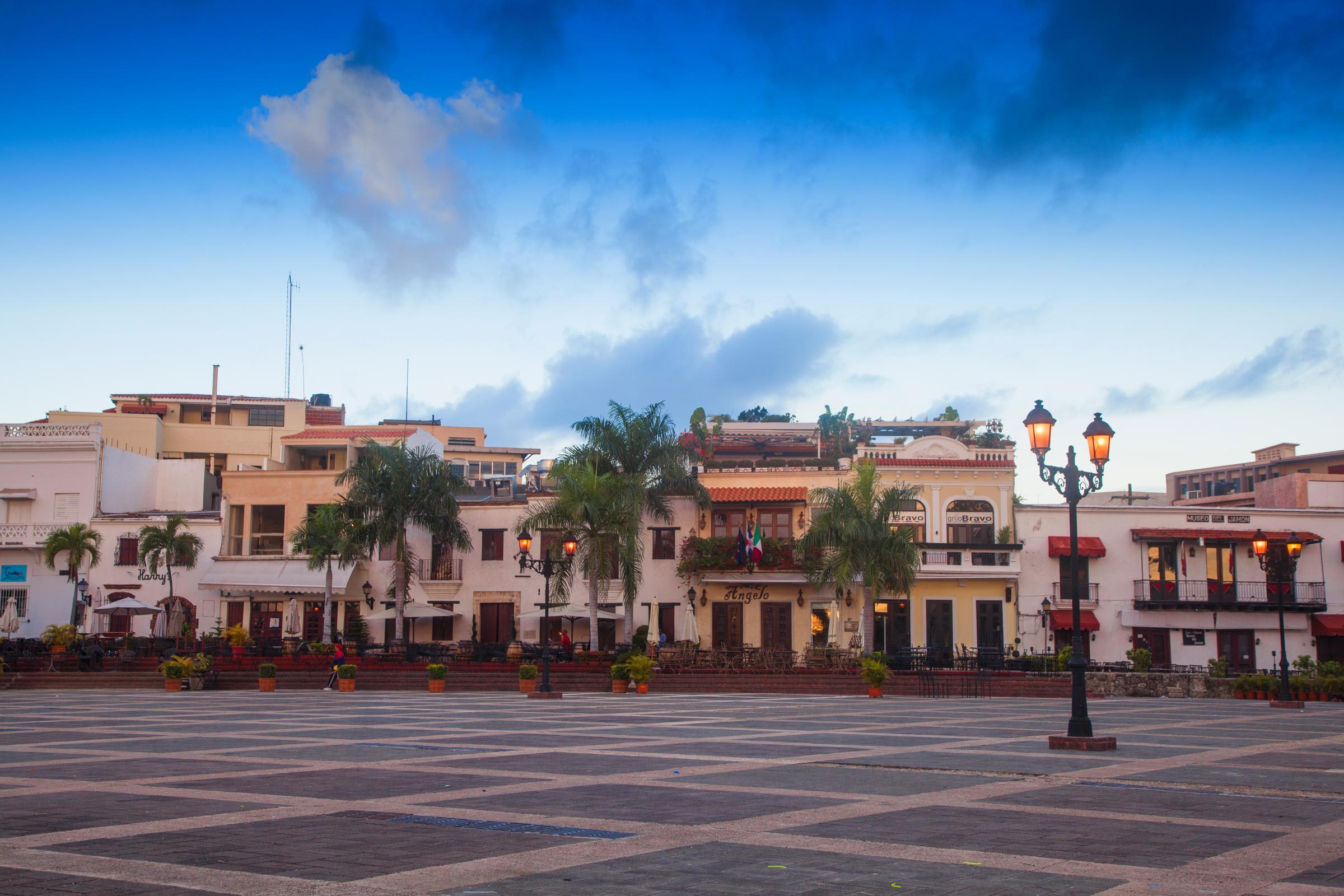
The Dominican Republic is making a name for itself beyond sumptuous resorts and golf clubs. Santo Domingo is amping up the party vibe and giving beach-lovers more reasons to stay in the capital. Upscale neighborhoods like Piantini and Naco are home to scores of new restaurants, many of which turn into nightspots after dinner—try Santru, home to some of the city’s best nueva dominicana cuisine. The electronic music scene is booming, too: The Warehouse, an industrial space that’s been repurposed into a venue, hosts some of the liveliest club nights in town, while promoters ShaveUrLegz run festivals and regularly bring in international DJs. For live music, Mecenas Café Cultural is the spot; the sangria and terrace draw a crowd. Recent openings, like the boutique Luca and Casas del XVI’s expanding collection of colonial mansions, are upping the hotel ante as well. —Nell McShane Wulfhart
Seychelles
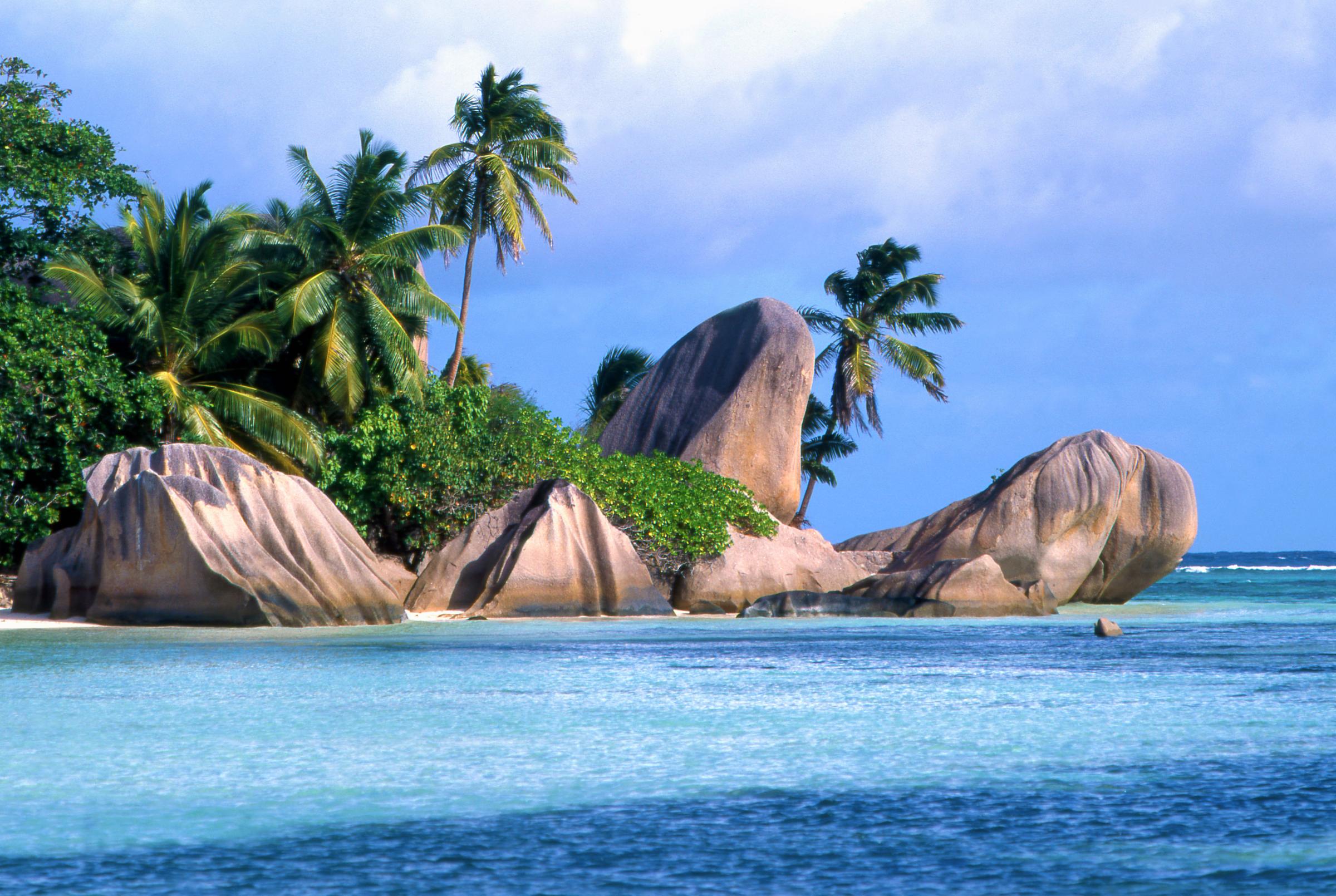
There are beaches, and then there are beaches. This 115-island nation off Africa’s eastern shore has some of the world’s most beautiful white sands—and lavish new resorts, so you can experience them in style. On the private island of Félicité, Six Senses Zil Pasyon is paradise for honeymooners, with five open-air spa pavilions and a plunge pool adjoining each of the 30 villas, which face the ocean. Later this year, Desroches Island’s sole resort will become a Four Seasons: guests can stay in an airy, eclectic-chic beach suite or one of 11 palatial villas. Also ideal for families: the new Presidential Villa on Cousine Island. —Jacqueline Gifford
Suzhou, China
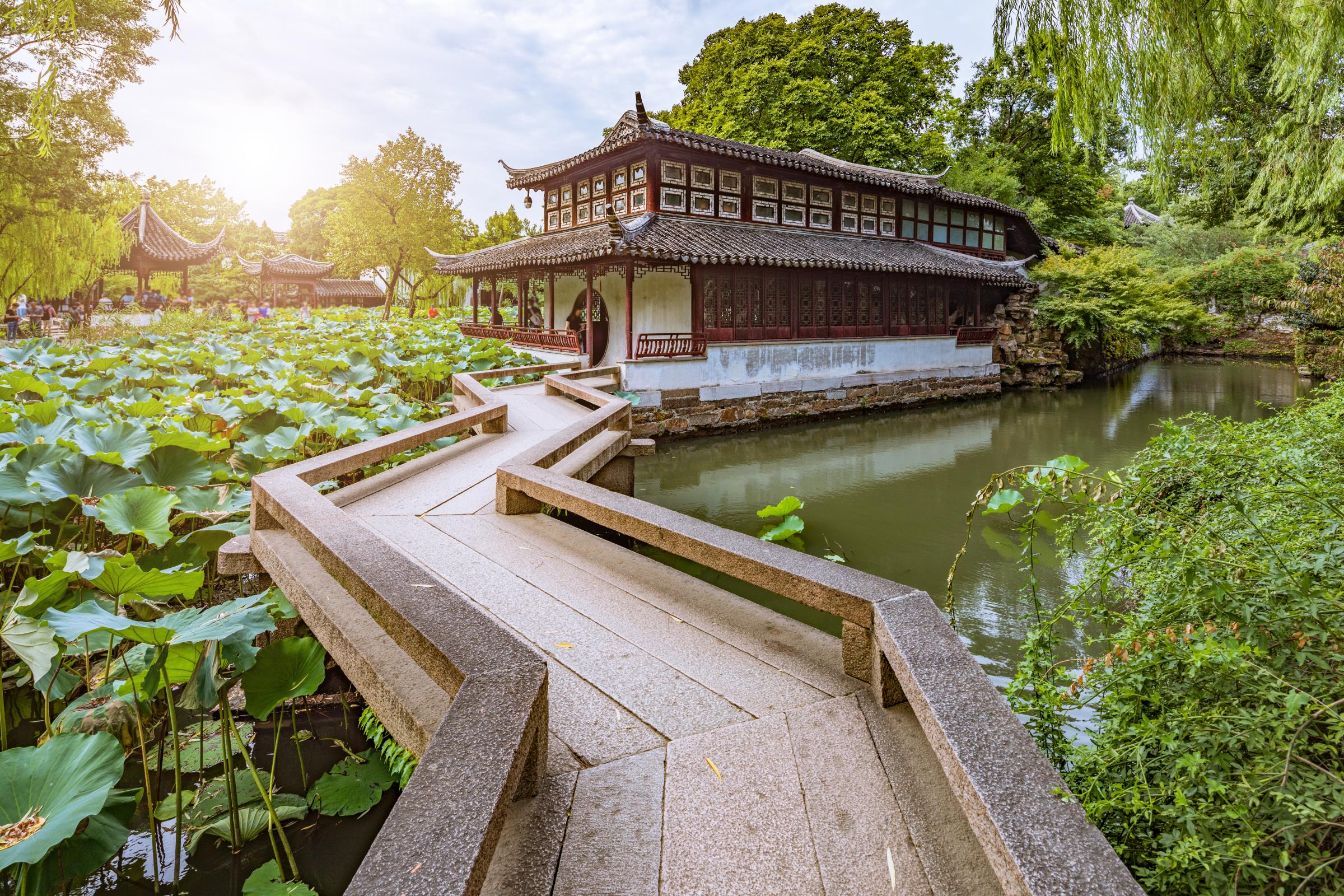
A half-hour from Shanghai by bullet train, 2,500-year-old Suzhou has two faces. Most know of its classical gardens (nine UNESCO-designated), celebrated in Chinese art and poetry for centuries, and its canal-filled Old Town with traditional white-washed buildings. But there’s also the high-rise-filled Suzhou Industrial Park (built in partnership with the Singaporean government), which has lured many Fortune 500 companies and is a recreational spot for locals and expats. It has a shopping and entertainment district named Times Square, a London Eye–like Ferris wheel, multiple Western and Asian restaurants, bars, theaters, and a concert hall, plus colorful musical fountains on Jinji Lake at night—and it’s all just a 20-minute subway ride from the heart of Old Town. Over the next two years, W Hotels, Sheraton, and the Luxury Collection join a stampede of Western hotel brands that include the stylish Tonino Lamborghini, a Hilton, and a Hyatt Regency. —Sharon McDonnell
Tamuda Bay, Morocco
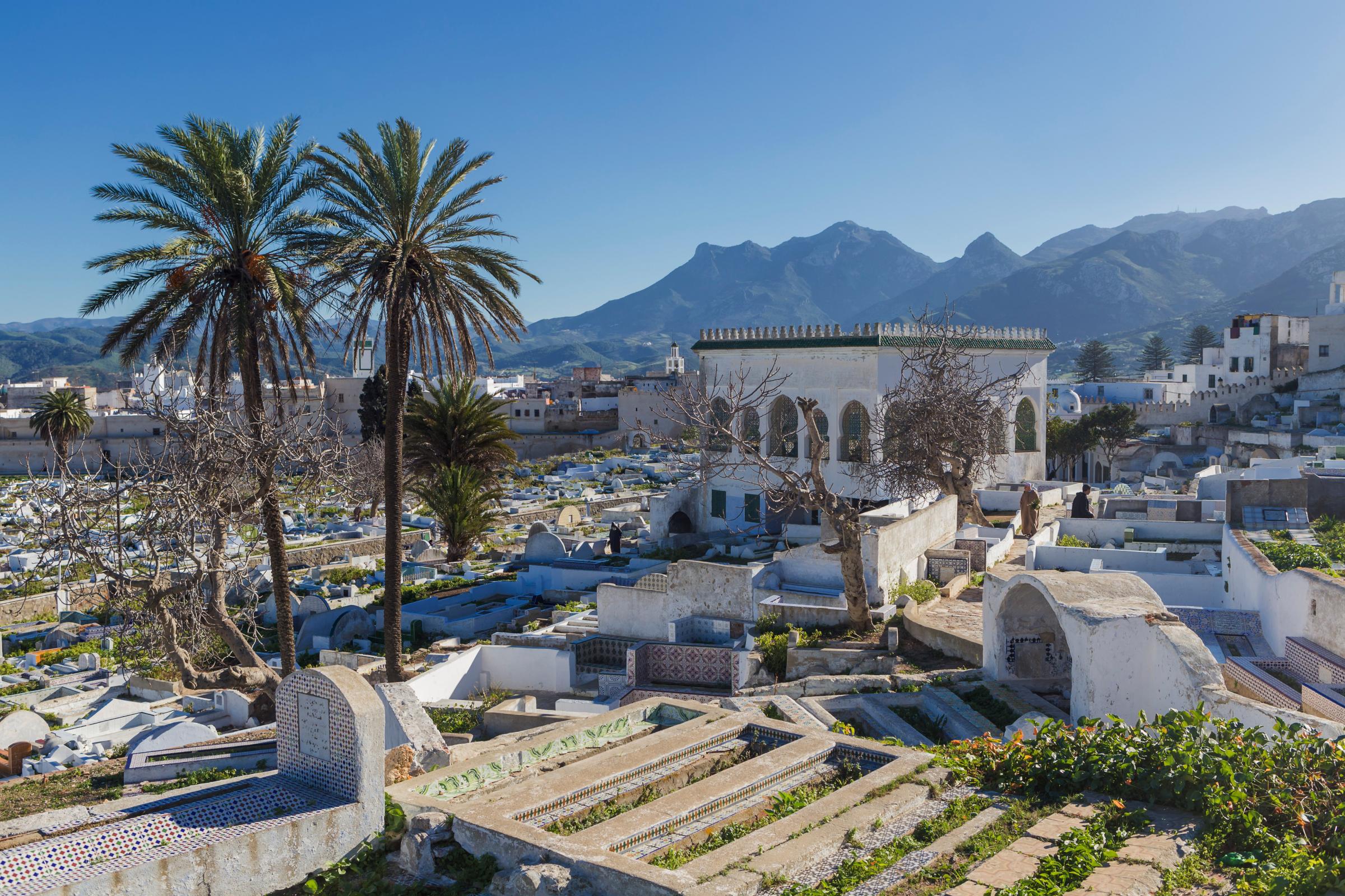
A mélange of cultural and geographic influences has given this string of seaside towns on Morocco’s Mediterranean coast a uniquely European flavor, and recent upscale openings have turned the area into a bona fide resort destination. Last spring in the town of Mdiq, Sofitel debuted Tamuda Bay Beach & Spa, a 104-room hotel with a palette inspired by the mid-20th-century Côte d’Azur. It’s a lively contrast to the subdued Moorish aesthetic of Banyan Tree Tamouda Bay, a new all-villa resort 20 minutes north in Fnidek. But there’s more to the region than sun and surf: the nearby port city of Tétouan has several museums and one of Morocco’s best-preserved medinas. Head there now—with a Ritz-Carlton Reserve on the horizon, Tamuda Bay won’t stay under the radar for long. —Lila Battis
Tofino, British Columbia
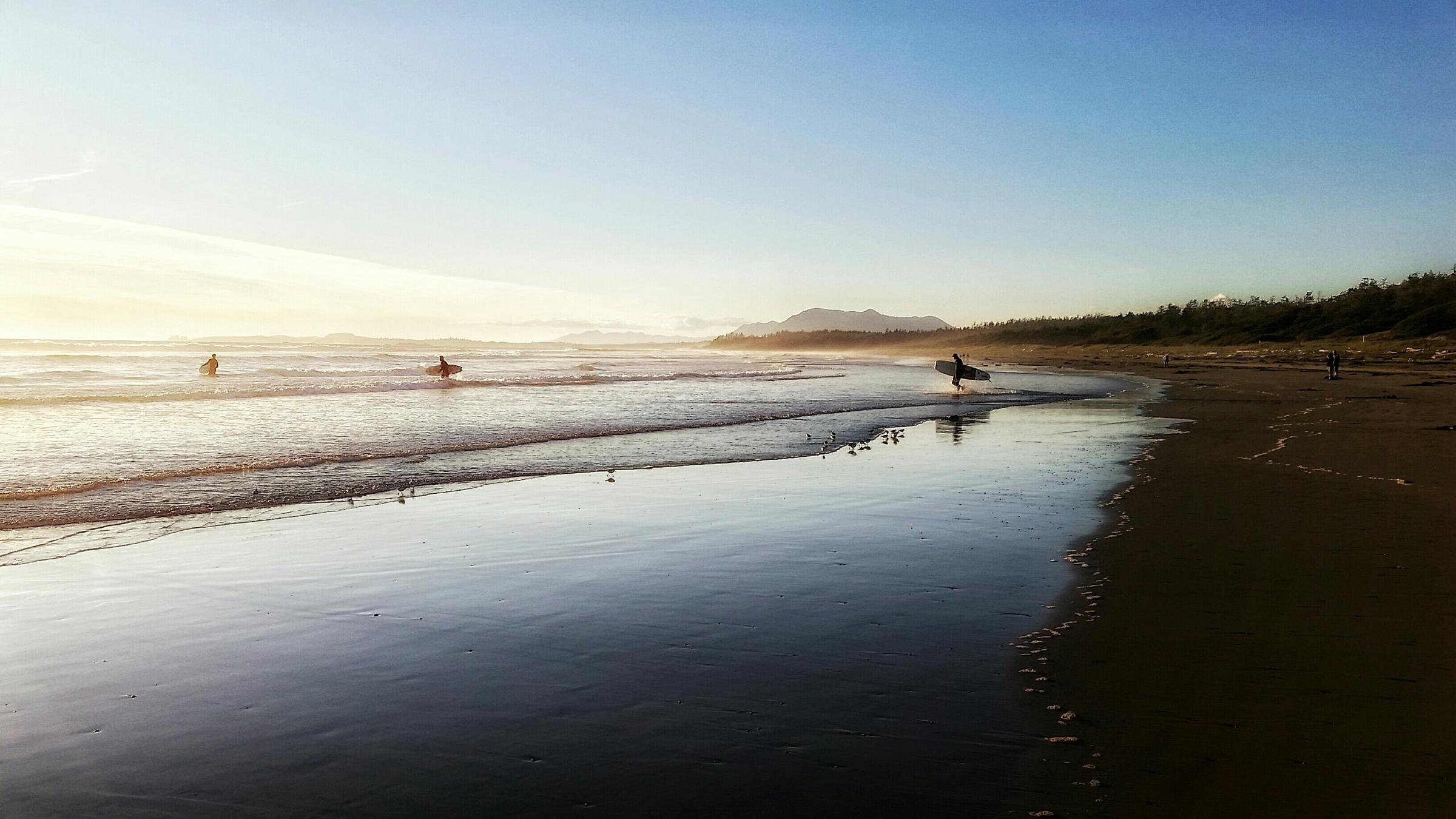
Known for its year-round swells, Canada’s surf capital comes with a cold-water reputation that has helped to keep it a relative secret from the rest of the world. But lately, this remote Vancouver Island gem is seeing more visitors for a new reason: wild food. Chefs are using ingredients foraged straight from the Pacific Ocean and huge swaths of temperate rain forest—Tofino’s front and backyard. The salmon is so recently caught that chefs try not to grumble over the fact that the still-tense flesh is difficult to clean. Check out the new Sea Monster Noodle Bar, where the broth simmers with dried kelp and the poke is made with fresh-caught tuna. At Wolf in the Fog, order smoky potato-crusted oysters and sourdough toast topped with just-plucked chanterelles. Pair it with forest-fresh beverages, like the rye infused in-house with raw cedar or Tofino Brewing Company’s seasonal Spruce Tree Ale, steeped with locally foraged Sitka spruce tips. And stay at Long Beach Lodge Resort, where magical days on Cox Bay Beach include foraging treks with chef Ian Riddick—so you can see what the same food looks like in the wild. —Nina Kokotas Hahn
Turin, Italy
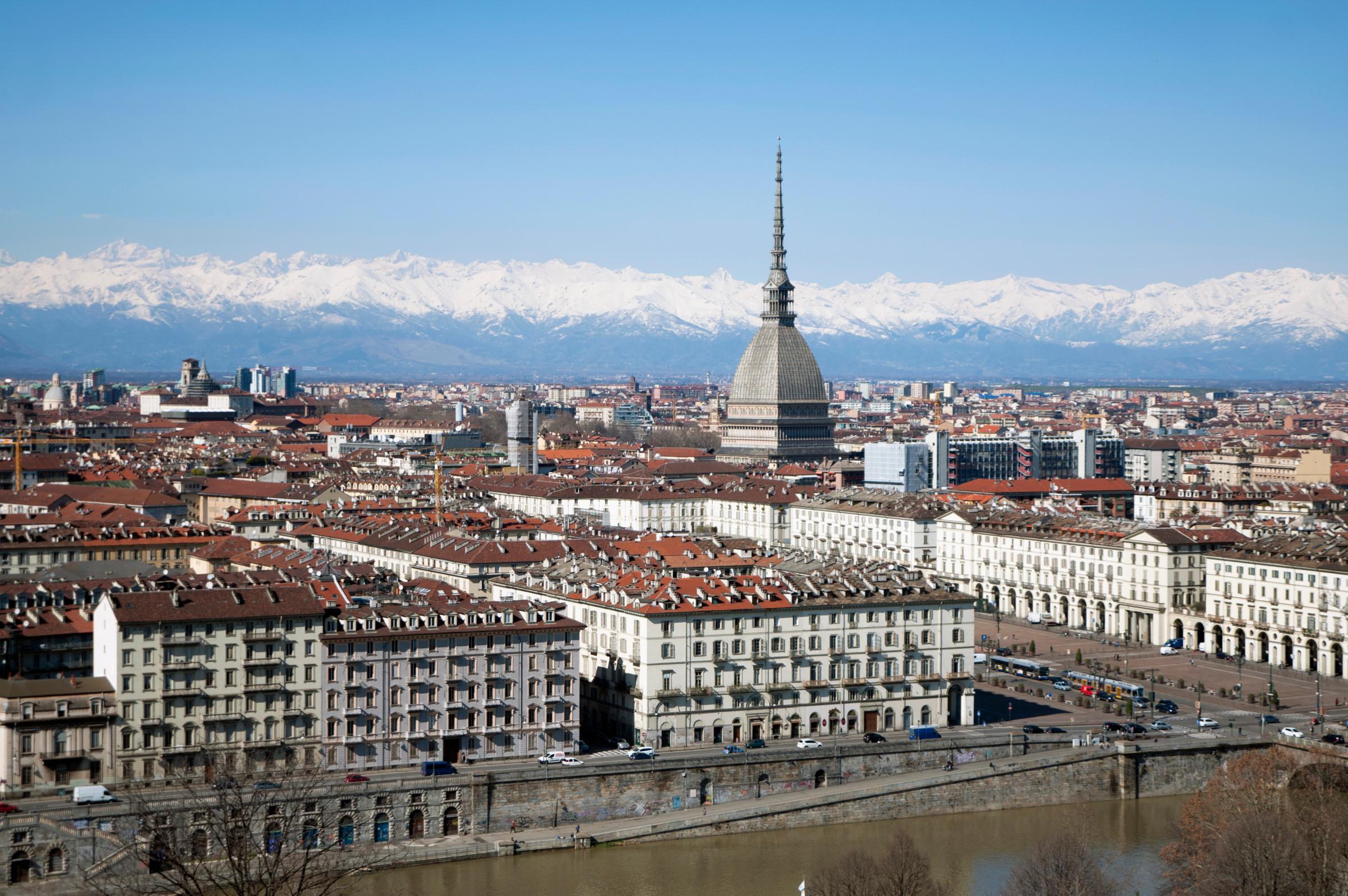
Best known for its historic cafes and the Shroud of Turin, the city is also a vibrant contemporary art destination. Last year, superstar curator Carolyn Christov-Bakargiev was named director of two major institutions, Galleria Civica d’Arte Moderna, Italy’s first modern art museum, and Castello di Rivoli, its first contemporary art museum, featuring works from powerhouses like Michelangelo Pistoletto and Paul McCarthy. Earlier eras can be explored at two other newly overhauled museums: the Galleria Sabauda, where visitors can see more than 500 works once owned by the royal Savoy family, and the Egyptian Museum, which houses one of the most extensive Egyptian-artifact collections in the world. Early in 2017, Turin’s medieval roots will be revealed at Lavazza coffee’s new headquarters in the Aurora neighborhood, when the company unveils a fourth-century basilica discovered during construction. —Carol Kino
Valle de Guadalupe, Mexico
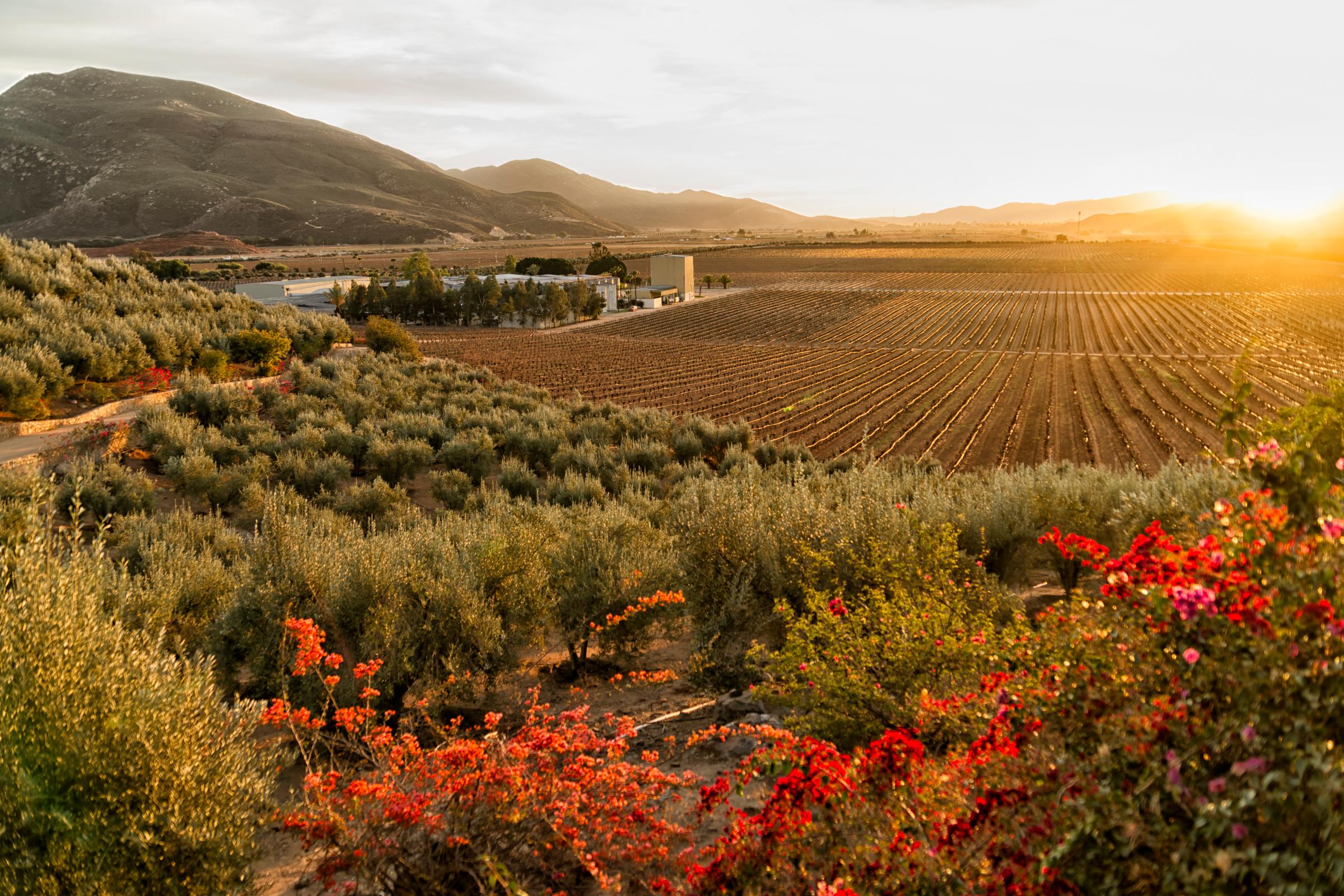
This wine region 80 miles south of San Diego is known for its red blends, but most bottles can’t be exported, so a visit is the best way to try the coveted pours. Start at Decantos Vinícola, which uses a flavor-preserving antigravity decanting method for its rich Malbecs. There are several new design-forward hotels here, too: chef Javier Plascencia runs Finca La Divina, a four-room B&B with a pool. It’s just a few miles from his acclaimed Finca Altozano restaurant and Lupe, his torta truck, housed in an Airstream. And in the summer, hacienda-style El Cielo Winery will open a 58-suite hotel where you can sip its traditional varietals with abandon. —Archana Ram
Veracruz, Mexico
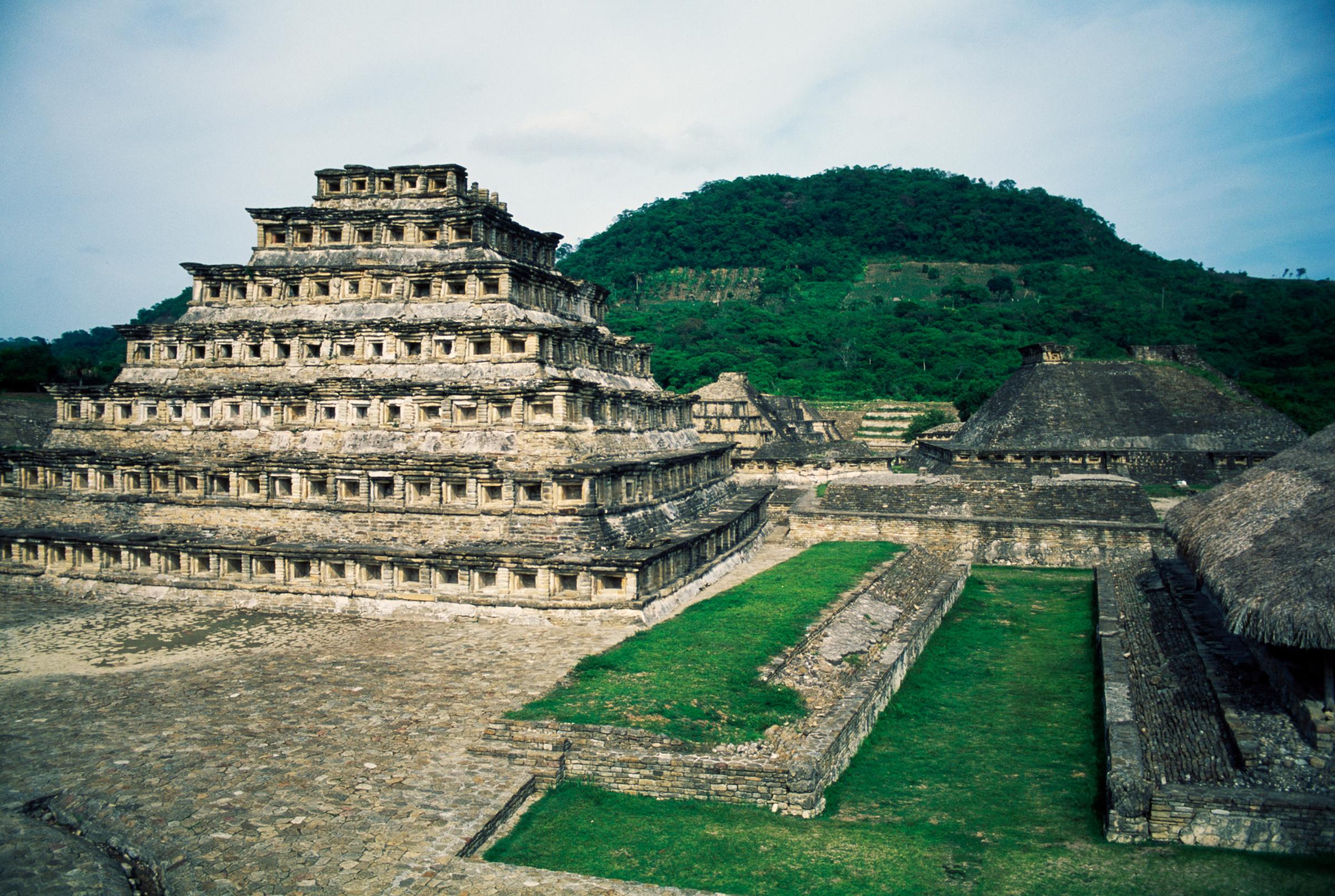
In lieu of the crowded beaches of Cancún and Cozumel, make your way to the state of Veracruz, where the seafood alone is enough to warrant a visit. Enjoy dishes like spicy crab broth on the Emerald Coast, a 12-mile stretch of beach free of crowds and lush with vegetation. Stay at the Maison Couturier, a Design Hotel surrounded by the banana plantations of San Rafael. The French community that’s been there since 1833 sells artisanal cheese and pan de agua, a French-style bread baked in wood ovens. Then venture to Papantla, a well-known Mexican village famous for its pre-Columbian architectural ruins and centuries-old vanilla farms. —Diana Spechler
This article originally appeared on TravelandLeisure.com
More Must-Reads from TIME
- Donald Trump Is TIME's 2024 Person of the Year
- Why We Chose Trump as Person of the Year
- Is Intermittent Fasting Good or Bad for You?
- The 100 Must-Read Books of 2024
- The 20 Best Christmas TV Episodes
- Column: If Optimism Feels Ridiculous Now, Try Hope
- The Future of Climate Action Is Trade Policy
- Merle Bombardieri Is Helping People Make the Baby Decision
Contact us at letters@time.com